






Dear Colleagues and Friends,
The Rafik B. Hariri Institute for Computing and Computational Science & Engineering at Boston University was founded over 10 years ago to initiate, catalyze, and propel collaborative interdisciplinary research for the betterment of society through the use of computational and data-driven approaches. Since then, the Institute has established itself as a leading multidisciplinary research institute, driving discoveries and groundbreaking innovations with transformative impact locally, nationally, and globally.
Today, the Institute comprises over 10 affiliated centers and initiatives, and a diverse research community that includes 400+ faculty research affiliates and their graduate students and postdoctoral advisees, as well as undergraduate students engaged in research from 66 departments across 13 schools and colleges. Through high-impact collaborative research, our community of thought leaders, problem solvers, scholars, and pioneers are addressing important societal problems that cannot be addressed in silos built around individual disciplines.
From creating long-memory vaccines to bolster immunity, and novel AI methods that broaden access to Alzheimer’s disease detection and prognosis, to making cyber-physical systems safer, and assessing climate change’s impact on human health, to bolstering the country’s biopreparedness and helping close gender and racial wage disparities, and to advancing the science of autonomous systems and reducing AI’s carbon footprint through cloud computing and data center innovations, our faculty and researchers are advancing groundbreaking multidisciplinary research to address many of society’s most pressing challenges.
Internationally recognized for seminal contributions in their fields, our faculty received numerous awards this year. Notably, Lucy Hutyra (CAS, Earth & Environment) received a 2023 “MacArthur Genius” award for her extraordinarily original work investigating the impacts of urbanization on environmental carbon cycle dynamic; Vivek Goyal (ENG) was named a 2024 Guggenheim Fellow for his trailblazing work in computational imaging; Rhoda Au (Chobanian & Avedisian SOM) was presented with the 2023 Melvin R. Goodes Prize for
Excellence in Alzheimer’s Drug Development by the Alzheimer’s Drug Discovery Foundation; Elaine Nsoesie (SPH) was named a Change Agent for Cultivating Inclusive AI by Mozilla; and Marshall Van Alstyne (Questrom) was named one of Thinker50’s Most Influential Management Thinkers in the World. Three faculty were also elected into peer-reviewed fellowships: Daniel Segrè (CAS, Biology) and Siddharth Ramachandran (ENG) were named AAAS Fellows, and Cara Stepp (Sargent) was named an AIMBE Fellow. Seven junior faculty were also recognized with early career awards, including NSF CAREER awards to Ana Fiszbein (CAS, Biology), Jonathan Huggins (CAS, Mathematics & Statistics), Wenchao Li (ENG), Andrew Sabelhaus (ENG), and Rabia Yazicigil (ENG); an ACM SIGBED Early Researcher Career Award to Renato Mancuso (CAS, Computer Science); and a Blackwell-Rosenbluth Award to Jonathan Huggins (CAS, Statistics).
To advance high-impact multidisciplinary research, the Institute continued to invest in our people, programs, and partnerships.
To recognize and support the development of outstanding faculty and doctoral students, the Institute funded seven junior faculty fellowships and six graduate student fellowships spanning diverse disciplines including astronomy, biostatistics, computer science, computing and data science, engineering, economics, neurology, speech, and sociology. Through the Institute’s AI and Education Initiative, four doctoral students were also awarded fellowships.
To catalyze multidisciplinary research collaborations, the Institute funded five FY25 Focused Research Programs, providing ‘scaffolding’ for multidisciplinary groups to coalesce in sustainable ways, with the goal of accelerating research for future funding and broader impact. Since its inception in 2021, our FRP program has demonstrated an impressive return on investment, seeding new collaborations, opening new avenues for research, and resulting in $34 in sponsored research for every $1 invested.
To promote opportunities for cross-disciplinary networking and collaboration across our network of faculty, postdoc, and student researchers, the Institute organized over 215 events, drawing over 9,000 attendees. We held four Focused
Research Program events with 400+ attendees, featuring prominent industry and academic leaders discussing topics ranging from reinforcement learning, to medical diagnostics, to life on Mars.
Increasing industry partners was a focus for us this past year. One of FY24’s major milestones was the grand opening and ribbon cutting of the Robotics and Autonomous Systems Teaching and Innovation Center (RASTIC), led by the Institute’s Center for Information & Systems Engineering (CISE). BU’s $9 million flagship center for AI and robotics partners with industry to ensure students acquire hands-on, applied skills beyond the classroom and are ready to make an immediate impact in the workplace. Supported by Massachusetts Technology Collaborative (MassTech) and BU, the event hosted over 200 guests, including industry leaders, state dignitaries, and BU leadership.
Another significant industry-faculty collaborative event was the two-day 2024 MOC Alliance Workshop, convening approximately 250 researchers and users from higher education, medical research centers, government, and industry with talks centered on research, development, and operations involving AI, computing, and the open cloud. This past December, the MOC Alliance joined, as a founding member, the AI Alliance. Established by IBM and Meta in collaboration with over 50 industry, academic, research, and government organizations globally, the AI Alliance’s mission is to accelerate responsible open-source innovation in AI while ensuring scientific rigor, trust, safety, security, diversity, and economic competitiveness.
This year, we also established an Industry Advisory Board. The board has worked with us to identify opportunities for collaboration, provide internship and employment opportunities for our students, and guide initiation of research engagements with faculty and their research teams.
Responding to the exciting opportunities and challenges of generative AI in education and research, the Institute took a leadership role in an AI Task Force convened by the Provost. The AI Task Force is a multidisciplinary team of faculty from across the University that developed recommendations and resources on how generative AI can be “critically embraced” in
education and research, as well as policies and best practices regarding the responsible use of AI by students and faculty to help prevent its misuse and mitigate any negative impact.
The investments that the Hariri Institute has made over the past year have furthered its growth and success. In FY24, we welcomed 40 new faculty affiliates and our community published 3200+ peer reviewed publications. Over 40 faculty and student researchers received honorific awards, and four were recognized among the world’s most influential researchers in Clarivate’s 2023 list of highly cited researchers.
Looking ahead, we aim to continue pushing the boundaries of multidisciplinary research at the intersection of computing, AI, and data science research, deepening our collaborations, and expanding our impact.
In closing, I want to express my deep appreciation for the dedication and hard work of our research affiliates, staff and partners. The success of the Hariri Institute is a testament to the commitment of our community to advance our common goals toward advancing science and research to better society.

Ioannis (Yannis) Paschalidis
Director, Rafik B. Hariri Institute for Computing and Computational Science & Engineering
Distinguished Professor of Engineering, Department of Electrical and Computer Engineering, Division of Systems Engineering, and Department of Biomedical Engineering
Founding Professor, Faculty of Computing & Data Sciences

Our Mission : Catalyze cross-disciplinary collaborations among researchers, enabling them to address important problems, make ground-breaking advances, build self-sustained research programs, and have lasting societal impact.
The Hariri Institute is a federation of 10 centers and initiatives spanning artificial intelligence (AI), computational science and engineering, computer systems and cloud computing, information and cyber security, and digital health.
Our community of research scientists and engineers from academia, industry, national laboratories, hospitals, and other sectors is making fundamental methodological contributions and driving scientific progress and innovation to solve complex problems in healthcare, cyber security, robotics and autonomous systems, energy systems, cloud computing, quantum computing, and more. To advance our goal, the Institute invests in people, programs, and partnerships, supporting our research community with direct funding, opportunities for collaboration, state-of-theart facilities, pre- and post-award grant administration, marketing and event support, as well as other administrative services.

Faculty Affiliates
Departments
Schools

Student Employees Distinguished Professors
Society Fellowships
Clarivate 2023 World’s Influential Researchers




$24 MILLION $
$105+ MILLION $ 47 MILLION


Awarded to BU Faculty and Graduate Students
$527,112 $80,000 $417,112 $30,000
Awarded Across Four Focused Research Programs

Awarded to Junior Faculty Fellows


Awarded to Graduate Student Fellows
Grant Highlights
“Accelerating the Expansion of the New England Research Cloud (NERC).” Massachusetts Technology Collaborative. $1.34 Million. Led by Orran Krieger (ENG), Director, MOC Alliance, Codirector Red Hat Collaboratory
“A Randomized Controlled Trial to Access the Efficacy of the Numbershire Level K Gaming Intervention for Improving Math Outcomes for Students with or at Risk of Mathematics Learning Disabilities.” US Department of Education. $703K. Led by Nancy Nelson (Wheelock)
“CPS: Medium: Federated Learning for Predicting Electricity Consumption with Mixed Global/ Local.” National Science Foundation (NSF). $1.2 Million. Led by Alexander Olshevsky (ENG), FY24 FRP Leader

The Red Hat Collaboratory is a partnership between Red Hat and Boston University aimed at advancing the state-of-the-art in cloud computing, AI and machine learning, and operating systems. This year, the Red Hat Collaboratory awarded 12 incubation awards to BU-Red Hat collaborative projects totaling nearly $2 million, with machine learning, energy efficiency, and secure data sharing as major research themes. Additionally, 11 undergraduates received funding for open-source research projects totaling $122,000. Notably, seven new NSF awards totaling $1.8 Million were awarded to projects funded by Red Hat Collaboratory Research Awards, and two projects received industry awards for research excellence.

The New England Research Cloud (NERC) became available to general research and education users this year. NERC also installed 64 NVIDIA A100 GPUs in its data center to amp up real-time parallel processing and analysis of huge datasets and received significant funds to advance its mission to be a regional resource with world-class cloud computing services. The Massachusetts Technology Collaborative (MassTech), building on its $875,000 pilot endowment, provided an additional $1.3 million to accelerate expansion of NERC capabilities. Additionally, Red Hat Collaboratory funded the Software & Application Innovation Lab (SAIL) with $330,000 to enable the software development and integration required to support new NERC projects.

In December, the MOC Alliance became a founding member of the AI Alliance, launched by IBM and Meta. Composed of an international community of leading technology developers, researchers, and adopters, the AI alliance aims to foster an open community to advance open, safe, responsible AI. The MOC Alliance also hosted a two-day workshop in March, convening over 250 in-person attendees and hundreds of virtual attendees from academia, industry, healthcare, and government. Featuring 35 speakers, session topics spanned AI and the AI Alliance, the Marriage of Data and Compute, the Open Cloud and Governance and Partnerships, Education, Support for System Research, and User Outreach Facilitation.



The AI and Education Initiative launched two new competitive funding opportunities this year to advance innovative research at the intersection of AI and education. The AI and Education Faculty Research Grants Program was launched to support faculty-driven research, accelerating future funding and broader impact; the program awarded $60,000 to four projects. The Initiative also launched the inaugural AI and Education Initiative Graduate Student Fellows Program; $20,000 was awarded to four doctoral students to support their research focus in this critical area.

The Robotics and Autonomous Systems Teaching and Innovation Center (RASTIC) held a grand opening in March. With a $9M capital investment from Mass Tech and BU, and ongoing support from robotics industry partners, RASTIC brings together academia and industry to develop the next-generation competitive robotics and autonomous systems workforce. Located on BU’s Charles River campus, the 2,000 ft2 facility provides a neutral space for companies to engage directly with faculty and students to design, prototype, and test new robotic innovations. The grand opening included talks from state, industry and university leadership; facility tours; and 16 student demonstrations of robotic projects spanning smart cities, medical robotics, drones, autonomous driving, smart home applications, and more.


In September, the BU Provost formed a multidisciplinary BU team of faculty and staff and charged them with examining the impact of generative AI (Gen AI) tools on education and research, and reviewing existing policies adopted by BU schools, colleges, and other academic institutions. Led by Hariri Institute faculty, the task force met throughout the fall and spring, consulted with AI experts, and published its “Report on Generative AI in Education and Research” in April. The data offers insights into the most effective university practices related to generative AI. Additionally, it makes use of natural language processing to foster a deeper understanding of the applications and ethical considerations surrounding this transformative technology.
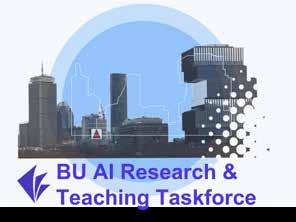
The mission of the Hariri Institute’s Focused Research Programs (FRPs) is to evolve and advance Boston University’s research in computing and data science around areas of strategic importance and emerging opportunity. The programs are designed to facilitate research convergence by providing ‘scaffolding’ for groups to coalesce in sustainable ways, with the goal of accelerating research for future funding and broader impact.
794
FY21–FY23 FRPs
Continuous Analysis of Mobile Health Data among Medically Vulnerable Populations
Data and Misinformation in an Era of Sustainability and Climate Change Crises
Leveraging AI to Examine Disparities and Bias in Health Care
Machine Learning for Chemistry and Materials Science
Quantum Convergence
Simulation Modeling for Population Health
Teaching Machines Human-Like Intelligence for every In Sponsored Research $34 FRP Investment Sponsored Research $975K $32.9M In FRP Investment $1 Return on Investment 3,400%
The Novel Data Science and AI approaches for Brain Health and Brain Disease FRP is led by Professors Swathi Kiran (Sargent), David Boas (ENG), Margrit Betke (CAS, Computer Science), and Prakash Ishwar (ENG). It aims to bring together researchers and faculty from across BU to focus on research in continuous brain monitoring, brain fingerprinting, and digital health. The FRP is cosponsored by the Hariri Institute, the School of Public Health and the Clinical & Translational Science Institute (CTSI).
In FY24, the FRP engaged in interdisciplinary, data driven research collaborations aimed at increasing understanding of brain health and improving treatment of brain disease. One project was initiated that aims to use machine learning to create personalized recovery plans for individuals with neurological disorders; preliminary study findings were published (Hantian Liu, Claire Cordella, Prakash Ishwar, Margrit Betke, Swathi Kiran, “Consistent longterm practice leads to consistent improvement: Benefits of self-managed therapy for language and cognitive deficits using a digital therapeutic,” Frontiers in Digital Health, Vol 5, 2023. DOI=10.3389/ fdgth.2023.1095110.) This project resulted in a webbased therapy calculator application and a number of papers are currently in preparation.
Additionally, the FRP facilitated collaboration with the Neurophotonics Center to develop noninvasive neuroimaging technology that continuously tracks human brain function and behavior in real time built on the an NIH grant titled “The Neuroscience of Everyday World” - A novel wearable system for con-
tinuous measurement of brain function. Additional collaborations with the FRP team have extended this work to participants with dementia and a grant proposal submitted to the NIH brain health initiative.
Several events were also organized. An industry panel titled “What can Digital Diagnosis and Digital Therapeutics tell us about the Brain” was held on April 25th. There, digital-health industry leaders discussed advances in commercial digital diagnoses and digital therapeutic solutions in the neurological disorder space. Speakers included Veera Anantha, CEO & Co-Founder Constant Health Therapy; David Bates, CEO & Cofounder, Linus Health; Geoffrey Gill, CEO, Verisense Health; Shaun Patel, CEO & Co-Founder, REACT Neuro; and Jennifer Lavanture, Vice President of Business Development and Corporate Strategy, MedRhythms.
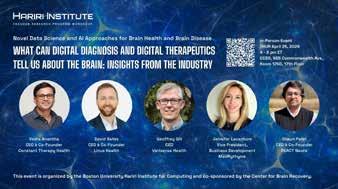
April 25th, 2024: FRP industry panel on “What can Digital Diagnosis and Digital Therapeutics tell us about the Brain.”
On October 18th, a student-led workshop on “Machine Learning and Brain Behavior Data” was organized and featured the work of current postdocs and graduate students specializing in machine
learning, brain health, behavior data, aphasia, neuroscience, and related fields. Swathi Kiran and David Boas also contributed significant energy into hosting the Neuroscience of the Everyday World Conference held August 26th-27th, 2024. The twoday event brought together leaders in the fields of computer science, biomedical engineering, cognitive science, neurology, and clinical neuroscience to present state-of-the-art research, all focused on the study of human brain function and continuous brain measurement in real-world activities.
The goal of the Optimal Bio-Inspired Design of Holistic Rehabilitation Systems FRP is to develop optimal bio-inspired methods and hardware design for seamlessly integrated human-robot systems, particularly for supporting rehabilitation and individuals with physical impairments. The FRP is led by Eshed Ohn-Bar (ENG) and Alexander Olshevsky (ENG) and funded by the Hariri Institute.
FRP leaders organized the Reinforcement Learning (RL) Symposium on May 10. RL is a field in AI inspired by learning mechanisms in biological systems that has emerged as a powerful generalized paradigm for a diverse set of applications, particularly those requiring adaptive reasoning, such as large language model training (e.g., chatGPT), education and rehabilitation technologies, transportation and energy-grid optimization, robotics, and more.
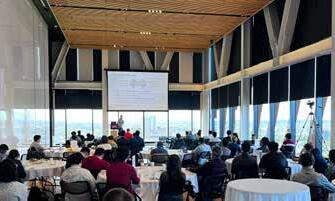
The day-long symposium featured eight renowned speakers and sought to uncover fundamental challenges in reinforcement learning frameworks and directions toward addressing them, particularly toward closing the current gap between theory, AI model training, and real-world applications and users. Over 200 researchers from academia, healthcare and industry attended the in-person symposium.
Event speakers included: Bahman Gharesifard, Professor, Electrical & Computer Engineering, University of California, Los Angeles; Amin Karbasi, Associate Professor, Electrical Engineering & Computer Science, Yale University & Staff Research Scientist at Google; Alec Koppel, AI Research Lead/VP in the Multiagent Learning and Simulation Group within Artificial Intelligence Research, JPMorganChase; Na Li, Winokur Family Professor, Electrical Engineering and Applied Mathematics, Harvard John A. Paulson School of Engineering and Applied Sciences; Antonin Raffin, Research Engineer, Robotics and Machine Learning, German Aerospace Center; Alejandro Ribeiro, Professor, Electrical and Systems Engineering, University of Pennsylvania; Daniel Russo, Associate Professor, Decisions, Risk, and Operations Division, Columbia
Business School; and Kaiqing Zhang, Assistant Professor, Electrical and Computer Engineering, Institute for Systems Research, University of Maryland.
The First Trip to Mars: How to Pack Light FRP aims to support NASA’s plans to safely land humans on Mars in the 2030s by producing novel software based on data from Mars orbiters and rovers. This software will model the ionosphere and its impact on navigation systems, and engineer microbial communities capable of carbon sequestration and nutrient production. The FRP is led by Marianna Felici (Center for Space Physics) and Paul Withers (CAS, Astronomy) and funded by the Hariri Institute.
On November 17, FRP leaders organized a workshop in which the interdisciplinary researchers met and presented high-level research, and strategized to build team cohesiveness. The “Space Travel with Earth Wisdom” research symposium was held on May 24. The event brought together researchers at the intersection of ecology, botany, biology, bioinformatics, data-science, and space science to look at how humans can approach space travel ethically and sustainability and use the wisdom of this planet to bring life to Mars. The symposium featured 15 invited speakers, including BU faculty and students, and industry leaders. BU faculty speakers included: Ilija Dukovski, Research Associate Professor (CDS, Bioinformatics); Marianna Felici, Research Scientist, Center for Space Physics; Yannis Paschalidis, Director, Hariri Institute for Computing, Professor (ENG, CDS); Joshua Semeter, Director of Center for Space Physics, Professor (ENG); and William Tomlinson, Director, Software & Applications Innovation Lab (SAIL). Industry speakers included: Thomas Green, Indigenous Historian; Louvere Walker-Hannon, Application Engineering Senior Team Lead, MathWorks, and Programs Chair of NSBE Boston Professionals; Phil Hattis, Laboratory Fellow, Draper; Chris Moore, Astrophysicist, Center for Astrophysics; Ann Raiho, Head of Data Science, Funga; Kenn Sebesta, Executive Director, RASTIC; and Judith Sumner, Ethnobotanist and Author. Student speakers included: Dylan Mankel, PhD Student (CAS, Biology); Brackney Pickett, Graduate Student (CAS, Astronomy); and Zoey Werbin, PhD Candidate (CAS, Biology). Over 200 faculty, students, and industry researchers attended.
The FRP researchers have also drafted four manuscripts, submitted three foundation proposals, and are developing a website to produce results. Additionally, Marianna Felici will be presenting results this December at the American Geophysical Union’s annual meeting.
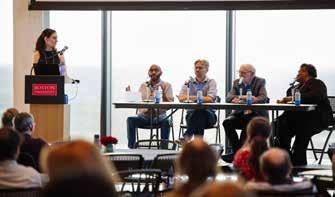
Health Equity in the Wake of Continued Climate Change: Leveraging Big Data to Inform Action FRP
The goal of the Health Equity in the Wake of Continued Climate Change: Leveraging Big Data to Inform Action FRP is to solidify BU’s early leadership on climate and health research that drives solutions and champions equity. The researchers are developing infrastructure and shared resources to foster and reinforce collaboration across BU; seed innovative new research; accelerate the pace of research and translation; and collectively position BU investigators to be even more competitive for future funding opportunities that address this pressing global challenge. This FRP is led by Gregory Wellenius (SPH) and Lucy Hutyra (CAS, Earth and Environment) and is funded by the Hariri Institute and the Institute of Global Sustainability (IGS). In FY24, FRP leaders held several planning sessions and have organized a full-day research symposium to be held in November 2024.

The goal of the Multimodal Transformer Architectures for Neuropathology Study of Alzheimer’s Disease Focused Research Program is to improve premortem diagnosis of neuropathologic processes underlying cognitive impairment (mild cognitive impairment and dementia) utilizing a machine learning approach to definite patterns in MRI scans and neuropsychological data that predict underlying neuropathology and then understand these patterns through latent space analysis. The proposed work is highly interdisciplinary and requires expertise from five different departments across the Charles River Campus and the Medical Campus (both from the School of Medicine and the School of Public Health). This Focused Research Program is led by Xin Zhang (ENG) and Chad Farris (Chobanian & Avedisian SOM) and is co-sponsored by the Digital Health Initiative at the Hariri Institute for Computing, the School of Public Health Population Health Data Science Program, the Clinical and Translational Science Institute, and the Evans Center for Interdisciplinary Bio
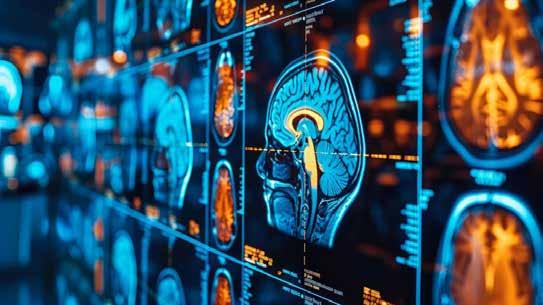

The goals of the From Self-Driving Labs (SDLs) to Community-Driven Labs Focused Research Program are to develop the digital infrastructure and basic science to transform SDLs into community-driven laboratories by establishing facile, safe, and efficient methods for external researchers to run experiments on autonomous systems. This work will convert isolated instruments into shared community resources akin to High Performance Computing that allows diverse materials researchers to address important societal challenges. This Focused Research Program is led by Keith Brown (ENG) and is sponsored by the Hariri Institute for Computing.


The Enhancing Models for Breast Cancer Risk Prediction and Bias Mitigation through Clinician-AI Collaboration Focused Research Program aims to identify the hidden sources of biological and demographic biases of AI in breast cancer risk prediction based on mammography images. Using recent progress in Large Language Models (LLMs), this framework enables clinicians to interact with the AI model at a level impossible with the current AI framework. This Focused Research Program is led by Clare Poynton (Chobanian & Avedisian SOM) and Kayhan Batmanghelich (ENG) and is co-sponsored by the Digital Health Initiative at the Hariri Institute for Computing, the School of Public Health Population Health Data Science Program, the Clinical and Translational Science Institute, and the Evans Center for Interdisciplinary Biomedical Research.


The goal of the Privacy Preserving Energy Analytics for Data Centers Focused Research Program is to demonstrate, for the first time, that large-scale computer systems will achieve cost reduction and energy efficiency improvements via a novel privacy-preserving, collaborative, and scalable analytics and optimization framework. The researchers aim to achieve this goal through a specific high-impact application of their privacy-preserving analytics framework: collaborative data center demand response, where data centers interact and jointly optimize for achieving better electricity cost tradeoffs and energy efficiency in the grid. This research is only possible with a convergent research team and approach, spanning expertise and solutions across energy (power systems and grid), computing design automation, optimization, privacy, computer systems, and hardware. This Focused Research Program is led by Ayse Coskun (ENG), Adam Smith (CAS, Computer Science), and Ajay Joshi (ENG) and is sponsored by the Hariri Institute for Computing, and the Center for Reliable Information Systems & Cyber Security (RISCS).


The goals of the AI for Understanding Earthquakes Focused Research Program are to apply AI to explore promising research directions and to build a foundation for further research in this area. Bringing together interdisciplinary AI and earth science experts from Boston University, Los Alamos National Laboratory (LANL), and Harvard University, this FRP will explore optimal deep learning architectures for seismic data, investigate use of video-surveillance infrastructure as an alternative to costly Earthquake Early Warning (EEW) systems, and employ machine learning to advance our understanding of earthquakes. This Focused Research Program is led by Brian Kulis (ENG) and is sponsored by the Hariri Institute for Computing.


Fatih Acun, PhD student, ENG, Computer Engineering. Acun is currently researching intelligent methods for sustainable and energyefficient high-performance computing.
Sarah Bald, PhD student, CDS, Bioinformatics. Bald’s work seeks to understand how the complex metabolic functions of microbial communities are organized, determined, and distributed with applications in health benefits and climate solutions.
Taylor Beauvais, PhD student, CAS, Sociology. Beauvais leverages a background in public opinion research and data analysis to discover the impact of AI on economic, social, and governmental systems.
Xinyi Hu, PhD student, CDS, Computing & Data Sciences. Hu’s research focuses on machine learning algorithms and their applications in neuroscience and image analysis, as well as machine and research modeling.
Masha Lazou, PhD student, ENG, Biomedical Engineering. Lazou is developing computational methods to enhance the understanding of protein-protein and protein-ligand interactions by concentrating on protein structural ensembles and their implications in drug discovery and development.
Ryan Senne, PhD student, Chobanian & Avedisian SOM, Neuroscience. Senne’s work combines machine learning, statistical modeling, and the neuroscience of decision-making to understand how neuromodulatory systems alter local neuronal network dynamics.

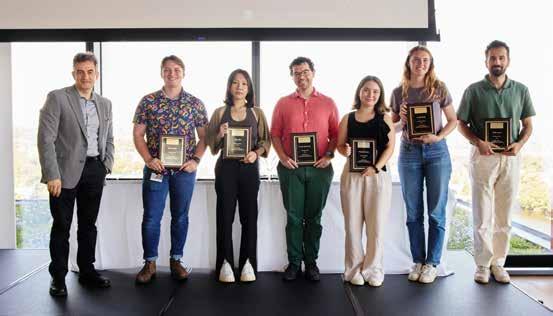
Our Graduate Student Fellows program recognizes outstanding PhD students who are pursuing computing and data-driven research at Boston University. These fellows have a a three-year appointment.
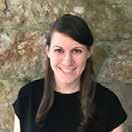

“This experience broadened my horizons as far as the scope and applications of computational and data-driven science and how this intersects with my work in speech and language sciences. This funding allowed me to travel to some of the most important conferences in my field, which broadened my professional networks and provided a platform to hone my oral presentation skills.”
—Hilary Miller (Sargent, GSF 2021)
“The Hariri Institute provided a robust platform for both personal and professional growth. The recognition and resources afforded by the award also opened up numerous opportunities for professional development and academic collaborations, which have been crucial in advancing my career prospects and research capabilities.”
—Chen Ling (ENG, GSF 2021)
Dillon Brout, Assistant Professor, CAS, Astronomy. Brout currently leads several major cosmological experiments which employ machine learning, statistical, data processing, and modeling techniques to catalog the universe’s dark energy, dark matter, ordinary matter, and Einstein’s general relativity.
Jacob Brown, Assistant Professor, CAS, Political Science. Brown’s research focuses on where people live, and how where they live influences their politics by examining new methods for measuring political geography, including the causes and consequences of political segregation in the United States.
James Chapman, Assistant Professor, ENG, Mechanical Engineering. Chapman’s work includes fusion of physics-driven simulations and machine learning to discover and design new materials for energy, corrosion, and pollution mitigation technologies.
Huimin Cheng, Assistant Professor, SPH, Biostatistics. Cheng’s methodological research focuses on statistical network analysis, graph deep learning, causal inference, machine learning, and Riemannian geometry.
Kimberly Crespo, Assistant Professor, Wheelock, Department of Speech, Language, & Hearing Sciences. Crespo directs the Bilingual Learning Lab, where she researches how child-environment interactions influence language acquisition using a variety of experiment methods.
Brian DePasquale, Assistant Professor, ENG, Biomedical Engineering. DePasquale conducts research in theoretical neuroscience and machine learning, where his research uses mathematical models to characterize and explain how populations of neurons perform computations to produce behavior.
Masao Fukui, Assistant Professor, CAS, Economics. Fukui is currently conducting research which focuses on the theoretical and empirical aspects of macroeconomics and international economics.
Charlene Ong, Assistant Professor, Chobanian & Avedisian SOM, Neurology. Ong’s research develops and validates data-driven tools to support clinical decision making in patients with catastrophic neurologic injury including ischemic and hemorrhagic stroke, traumatic brain injury and anoxic brain injury.

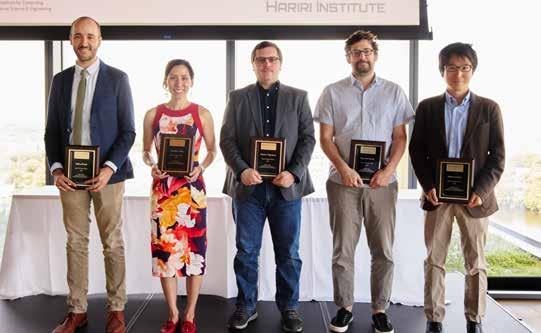
2024 Junior Faculty Fellows at the Hariri Institute Community Recognition Awards Ceremony on May 30, 2024.
Our Junior Faculty Fellows program aims to both recognize outstanding early-career computing and data-driven researchers at Boston University and support their continued development by connecting them with one another and with the Institute community at large through various mechanisms and activities. Junior Faculty Fellows are early-career faculty researchers who are selected for a three-year appointment.


“Receiving the Hariri Institute fellowship positively impacted my experience by providing the resources needed to advance my research. The award facilitated collaborations with industry partners, enhancing the practical relevance and reach of my work.”
—Garrett Johnson (Questrom, JFF 2021)
“The fellowship helped me develop a sense of community with other scholars in the Institute and across Boston University who have different backgrounds but with common interests in computations. I would highly encourage other junior faculty to seek this opportunity.”
—Jihye Jeon (CAS, Economics, JFF 2021)
Data Science Mentorship Circles (DSMC) is a Hariri Institute program that connects BU alumni who are working in the data science field with BU graduate students from diverse fields spanning astronomy, biostatistics, computer science, data science, engineering, and math and statistics. DSMC selects mentors through a call for applicants done annually in September. Throughout the year, DSMC organizes workshops for professional development and networking, and student mentees meet with mentors monthly. In FY24, DSMC enrolled 62 student mentees from an applicant pool of 82, and 17 mentors. It organized six events drawing 185 attendees. Four workshops were held, covering topics such as the art of networking, tips and tricks for resume crafting, nailing interviews, and assessing a company’s financial health. Two events were organized to connect all mentors and mentees: a speed networking event (online) and a program farewell panel discussion and networking session (in-person).

“I was impressed by the program format shared during the mentee info session, prompting me to apply to become a mentee. I believed they could provide me with valuable resources, but to my surprise, the experience has exceeded my expectations, providing valuable guidance in transitioning from a fresh grad to an early career professional. I’ve acquired techniques, networking skills, and timeless wisdom. Conversations with mentors from different industries have been enlightening. With my mentor’s support, I improved my resume, interview skills, and networking, leading to a successful job offer. I’m grateful for the rapid growth and continuous support. Even after the official event ended, the support and feedback from different mentors have been a constant source of inspiration and guidance.”
—Ranfei Xu, M.S. Statistical Practice, Class of 2023
“The Data Science Mentorship Circles program has been one of the most beneficial experiences I have had in graduate school. Receiving mentorship from BU (Bio)Statistics alumnus ensured that career advice and guidance was tailored precisely to my experiences and training. In this way, the interactions with my mentor consistently addressed challenges I was facing while beginning a career in Data Science. This program underscores BU’s continued dedication to its students beyond the traditional classroom environment.”
—Benjamin Draves, PhD Student in Statistics, Class of 2021



MOC Alliance

Software & Application Innovation Lab (SAIL)

Center for Reliable Information Systems and Cyber Security (RISCS)

Center for Computational Science

AI Research Initiative (AIR)

Red Hat



Collaboratory AI and Education Initiative Center for Information and Systems Engineering (CISE)

Boston Women’s Workforce Council

Digital Health Initiative
The AI and Education Initiative facilitates research at the intersection of AI and learning for all people and backgrounds, and all the topics and contexts where learning happens. The Initiative transcends disciplinary boundaries, drawing on perspectives on learning spanning computing, education, design, social sciences, medicine, business, and beyond. It aims to use AI to inform human learning and teaching, take inspiration from human learning and teaching to advance AI, and build use-inspired AI technologies learners can use to transform themselves and the world. The Initiative is led by Naomi Caselli, Associate Professor of Deaf Education and Director of the Deaf Center at Wheelock College of Education & Human Development.
The AI and Education Initiative continued to thrive in the 2023-2024 academic year. Following a successful faculty search, Michael Chang was hired as an Assistant Professor in AI and Education; Chang’s research focuses on enhancing personalized learning experiences through AI and examining its ethical implications in classrooms. Additionally, the Initiative welcomed Ola Ozernov-Palchik as a Research Assistant Professor to the AI and Education core faculty. Her interdisciplinary research utilizes quantitative, neuroimaging, and AI approaches to study language development and improve children’s literacy outcomes. The group now includes 56 affiliated faculty from 17 departments across the university, fostering a diverse and collaborative environment.
Facilitating the professional growth of our community, the Initiative hosted multiple events, including a workshop on using ChatGPT in educational contexts, and a symposium on AI and Education featuring an international lineup of presenters. Wheelock Clinical Associate Professor Nermeen Dashoush shared her work developing Lyla in the Loop, a new PBS show to promote AI literacy in early childhood. Presenters also shared open science practices to spur innovation in AI and Education, such as how Boston Public Schools are adapting to AI, and how teachers might implement AI in the classroom.
Wheelock faculty Ashley Moore and Andrea Bien led a workshop on academic integrity and the use of generative AI.
To support innovative research, the Initiative funded four faculty research grants for a total of $80,000, and four doctoral fellowships for a total of $20,000. These awards will further research on diverse topics, including technologies to support math instruction, enhancing language comprehension and second language proficiency, and improving reinforcement learning models and student exercise outcome predictions.
The impact of the AI and Education Initiative this year has been remarkable. Core and affiliated faculty published 76 groundbreaking scholarly articles and secured more than $6,000,000 in grant funding. Strategic collaborations were forged with key partners including school districts in the greater Boston Area. Reflecting on BU’s commitment to the critical embrace of AI, the Initiative has begun drafting a proposal for a new degree in AI and Learning, aiming to formalize and expand BU’s academic offerings in this innovative field. These accomplishments highlight the Initiative’s dedication to advancing research, enhancing educational practices, and building a robust network of partnerships that drive innovation and excellence in the field of AI and education.
Naomi Caselli was awarded a subcontract (BU $605,529) from the National Institute on Disability, Independent Living, and Rehabilitation Research to develop metrics to evaluate automatic sign language translation technology. She was also awarded a NIH R01 subcontract (BU $1,175,080) on a project documenting language acquisition in every deaf and hard of hearing child in the state of California. Machine learning techniques will be used to identify patterns in language experiences that lead to successful outcomes. She also won an NIH supplement to a project entitled “Effects of input qual-
ity on ASL vocabulary acquisition in deaf children” designed to increase mentorship capacity and data science education for deaf scholars through NIH NIDCD ($360,594).
Ola Ozernov-Palchik led a collaborative project with colleagues at MIT, securing an $80,000 grant aimed at closing equity gaps in vocabulary knowledge using AI. The project will develop and evaluate a speechbased, LLM-empowered conversational tutor to enhance vocabulary knowledge in 3rd grade children from diverse socio-demographic backgrounds. Additionally, as a co-PI, she received a $75,000 Red Hat Collaboratory grant to develop an open-source, AI-integrated data repository for educational data.
Xu, Paiheng, Liu Jing, Jones, Nathan, Cohen, Julie & Ai, Wei. (2024). The Promises and Pitfalls of Using Language Models to Measure Instruction Quality in Education. Proceedings of the 2024 Conference of the North American Chapter of the Association for Computational Linguistics: Human Language Technologies. (Vol 1: Long Papers) 4375-4389. DOI:10.18653/v1/2024.naacl-long.246.
Yu, H., Allessio, D. A., Lee, W., Rebelsky, W., Sylvia, F., Murray, T., ... & Betke, M. (2023, October). COVES: A Cognitive-Affective Deep Model that Personalizes Math Problem Difficulty in Real Time and Improves Student Engagement with an Online Tutor. In Proceedings of the 31st ACM International Conference on Multimedia (pp. 6152-6160). DOI:10.1145/3581783.3613965.
Cui, C., Abdalla, A., Wijaya, D., Solberg, S., Bargal, S.A. (2024). Large Language Models for Career Readiness Prediction. In: Olney, A.M., Chounta, IA., Liu, Z., Santos, O.C., Bittencourt, I.I. (eds) Artificial Intelligence in Education. Proceedings of the 25th International Conference on Artificial Intelligence in Education (AIED 2024). Communications in Computer and Information Science, vol 2150. Springer, Cham. doi.org/10.1007/978-3-031-64315-6_26.
Kim, K., Chen, X., & Liu, X. Automating spoken data analysis with commercial NLP support: A tutorial of accuracy scoring of elicited imitation. Research Methods in Applied Linguistics. Vol 3, Issue 3. 2024, doi.org/10.1016/j.rmal.2024.10012
2024 AI and Education Initiative Faculty Research Grant Awards
“BLAST (Benefits and Limitations of AI in Supporting Teachers of Mathematics)” PI: Leslie Dietiker, Associate Dean for Research (Wheelock)
“First Language-Second Language Proficiency with MultiAutoEIT: An Open Access Measure of Oral Language Proficiency” PI: Kathy MinHye Kim (Wheelock)
“Giving the Gift of Time: An AI Trained Curriculum Coach for K-12 Teachers” PI: TJ McKenna (Wheelock)
“Triangulating Translation: An Inquiry into the Use of Generative AI to Bridge Language and Comprehension” PI: Zachary Rossetti (Wheelock)
2024 AI and Education Initiative Doctoral Fellowship Awards
Erin Barno, PhD candidate (Wheelock)
Erning (Henry) Chen, PhD candidate (Wheelock)
Zhongkai Shangguan, PhD candidate (ENG)
Hao Yu, PhD candidate, (CAS, Computer Science)
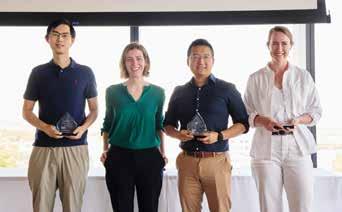
AI and Education Initiative Doctoral Fellowship Award recipients at the Hariri Community Recognition Awards Ceremony
The Artificial Intelligence Research (AIR) Initiative brings together researchers from diverse disciplines to advance research in machine intelligence. Their work aims to create intelligent systems that reliably make decisions, reason about data, and communicate with humans. The Initiative is co-led by Computer Science Professors Margrit Betke and Kate Saenko. AIR Core Faculty members include Computer Science Professors Iddo Drori, Bryan Plummer, Stan Sclaroff, and Derry Wijaya, and Engineering Professors Brian Kulis, and Venkatesh Saligrama. AIR researchers include 12 affiliated faculty from various disciplines, including biomedical engineering, computer science, electrical and computer engineering, computing and data sciences, linguistics, mathematics and statistics, management, and physics.
This year, AIR faculty were recognized for their groundbreaking work. AIR faculty received five new grants (from NSF, NIGMS, Sandia National Laboratories, and Hariri Institute), and won two awards (a Best Poster Award from 2023 IEEE International Joint Conference on Biometrics (IJCB), and a Best Paper Runner Up Award at 2023 AI for Content Creation Workshop, IEEE Computer Vision and Pattern Recognition Conference.)
AIR faculty collaborated across BU Charles River and Medical campuses to advance AI research in healthcare and medicine, resulting in numerous papers. Margrit Betke with AIR faculty affiliates Prakash Ishwar (ENG) and Janusz Konrad (ENG) collaborated with Swathi Kiran (Sargent) and Archana Venkataraman (ENG) to develop AI models that predict a patient’s responsiveness to aphasia rehabilitation. Supported by a Hariri Institute internal grant, their work resulted in two NIH proposal submissions and several publications. Additionally, with Christopher Gill (SPH) and BMC clinicians Bindu Setty and Ilse Castro-Aragon, AIR faculty presented a pediatric lung US dataset in the influential journal Radiology: Artificial Intelligence, “Curated and Annotated Dataset of Lung US Images in Zambian Children with Clinical Pneumonia” https://doi.org/10.1148/ryai.230147). A collaboration between Margrit Betke and Vijaya
Kolachalama (Chobanian & Avedisian SOM) also yielded several publications for AI solutions in digital pathology.
The AI and Emerging Media (AIEM) team, co-led by Margrit Betke and Derry Wijaya, published papers related to AI and communication scholarship, including “The Affective Nature of AI-Generated News Images: Impact on Visual Journalism,” in 2023 11th International Conference on Affective Computing and Intelligent Interaction (ACII), doi: 10.1109/ ACII59096.2023.10388166; and “Enhancing Emotion Prediction in News Headlines: Insights from ChatGPT and Seq2Seq Models for Free-Text Generation,” Proceedings of the 2024 Joint International Conference on Computational Linguistics, Language Resources and Evaluation (LREC-COLING 2024), pages 5944–5955.
AIR remains active in statistical machine learning. Mark Kon and collaborators published a solution for data imputation in large medical datasets: W. Li, et al.,”Multilevel Stochastic Optimization for Imputation in Massive Medical Data Records,” in IEEE Transactions on Big Data, vol. 10, no. 02, pp. 122-131, 2024. doi: 10.1109/TBDATA.2023.3328433.
This year, six AIR students defended their PhD theses, including: Dina Bashkirova, “Domain Invariance for Semantically Consistent Image Manipulation,” advised by Kate Saenko; Andrea Burns, “Learning and Evaluating Multimodal Representations for Digital Domains,” co-advised by Kate Saenko and Bryan Plummer; Vitali Petsiuk, “Neural Network Interpretations as Means for Model Analysis and Improvement,” advised by Kate Saenko; Ximeng Sun, “Efficient Deep Learning for Image and Video Understanding,” advised by Kate Saenko; Reuben Tan, “Grounding Language in Image, Video, and Audio Modalities,” co-advised by Kate Saenko and Bryan Plummer; and Yi Zheng, “Context-aware Digital Pathology: Enhancing Whole Slide Image Analysis through Global-Local Feature Learning,” co-advised by Margrit Betke and Vijaya Kolachalama.
Professional services included leadership roles for the influential NeurIPS 2023: Kate Saenko served as program co-chair, Bryan Plummer as area chair, and Brian Kulis as co-organizer of the “ML for Audio’’ workshop. Bryan Plummer was also area chair for several computer vision and machine learning conferences, including CVPR’23 and ACL’23.
Kate Saenko and Bryan Plummer, as program co-directors, also led outreach efforts in the AI4All summer program, promoting greater diversity and inclusion in the field of AI. Margrit Betke served as a panelist on “Experiences as a Woman in STEM,” which was organized by the Women in Science and Engineering for Warren Towers, a student group at Boston University. She also gave an invited lecture at the Weston High School on “Artificial Intelligence for Healthcare, Conservation, and News Analysis.”
AIR research seminars and talks were held throughout the year and attended by over 2,100+ faculty, students, staff and guests. Seven Distinguished Speaker events were held, featuring speakers renowned around the world for their contributions to the field of AI. Weekly AIR meetings and “coffee hours” with faculty and students were also held, providing opportunities for research presentations and the sharing of ideas.

Collaborative Research: “NeTS: Medium: Large Scale Analysis of Configurations and Management Practices in the Domain Name System.” NSF. $525,000. PI: Mark Crovella (CAS, CS)
“ATD - Anomaly detection and functional data analysis with applications to threat detection for multimodal satellite data,” NSF DMS. $250,000. PI: Julio Castrillon (CAS, Mathematics & Statistics). Co-PI: Mark Kon (CAS, Mathematics & Statistics).
“Multilevel stochastic orthogonal subspace transformations for robust machine learning with applications to biomedical data and Alzheimer’s disease subtyping,” NSFDMS/NIGMS. $600,000. PI: Julio Castrillon. Co-PI: Mark Kon.
Adobe Systems. $20,000 gift to Bryan Plummer.
2023 IEEE International Joint Conference on Biometrics (IJCB) Best Poster Award: “Age-constrained Ear Recognition: The EICZA Dataset and SASE Baseline Model.” (Margrit Betke with CS PhD student Wenda Qin and collaborators)
2023 AI for Content Creation Workshop, IEEE Computer Vision and Pattern Recognition Conference Best Paper Runner Up: “Text-to-image Editing by Image Information Removal.” (Bryan Plummer with CS PhD student Zhongping Zhang and collaborators)
BWWC is a public-private partnership between the Boston Mayor’s Office and Greater Boston employers dedicated to closing gender and racial wage gaps. Employers sign the 100% Talent Compact pledging to assess if their organization has wage gaps and, if so, work toward closing them with our help. Kim Borman, BWWC Executive Director, leads the Council.
Every two years the BWWC, in partnership with the Hariri Institute, collects and analyzes payroll data anonymously from its members to show a snapshot of the progress being made to close wage gaps. BWWC now covers 17% of the Greater Boston demographic in their wage gap research. New metrics will be available in December 2025.
In 2023, the BWWC found that the gender wage gap in Greater Boston declined by 30% – from 30¢ to 21¢. This is the first measured progress since the BWWC started reporting in 2016. The BWWC attributes this increase in salaries to two factors, the first being women’s advancement into highly paid senior positions. Women in the C-Suite, or the executive-level managers within a company, rose by 3% this year. In addition, women in the level right below C-Suite, first/mid-level officials, saw a 2% increase this year as well. The second factor was the intentionality paid to the issue since the pandemic. Many of the policies put in place due to COVID like schedule flexibility and hybrid work could be helping retain women which is needed for eventual promotion. While this 30% decline in the gender wage gap is significant, it looks only at base compensation, or most often known as an hourly rate, monthly income, or annual salary. When looking at total compensation, which includes both base compensation and performance pay, the gender wage gap increased to 30¢. The BWWC’s research proved that on average, men earned over 3x the amount of performance pay as women.
The BWWC analyzes wage gaps beyond just gender, and emphasizes that a prevalent wage gap also exists when you look at the payroll data based on race/ethnicity. White workers earned more in 2023 than non-white workers, with a 27¢ wage gap in base compensation – a 3¢ increase from the 2021 measurement. Looking at total compensation, the racial wage gap increased to 31¢ in 2023 – up from 28¢ in 2021.
In FY24, the BWWC held four quarterly briefings for its members highlighting academic experts and practitioners in the field of gender and racial equity as it relates to pay gaps. The events drew nearly 400 attendees.
Garry Straker, VP of Compensation and Consulting at Salary.com and BWWC Co-Chair Evelyn Murphy discussed pay transparency laws with moderator Tizana Dearing, host of WBUR’s Radio Boston.
At our 9th Annual Effective Practices Conference, Megan Ann Greenfield, Partner at McKinsey and Company who leads diversity and inclusion initiatives, discussed the company’s recent findings and research. We also released our 2023 data results and hosted a conversation with Beth Chandler, President and CEO of YW Boston and BWWC Council Member.
Ian Matthew-Clayton, VP and Chief Inclusion, Diversity, and Equity Officer for Dana-Farber Cancer Institute, Shirley Leung, Boston Globe Columnist and Editor and Host of the “Say More” podcast, and Eric Nguyen, Director of InclusionBoston at YW Boston had a 60 minute panel discussion about ways to enhance and reshape DEI efforts, moderated by BWWC Executive Director Kim Borman.
Our spring event was our biennial awards ceremony where the BWWC recognizes employers who led the charge on wage equity in Greater Boston by implementing successful policies aimed at closing gender and racial wage gaps, now called the Wage Equity Impact Awards. We had six winners this year who engaged in a panel discussion about their initiatives, moderated by Crystal Haynes, Emmy-winning journalist, Senior Communications Director of United Way of Massachusetts Bay, and former host of GBH’s Greater Boston and Basic Black. Winners included: The Bulfinch Companies Inc., Charlestown Nursery School, DiMella Shaffer, State Street, Sun Life, and Trillium Asset Management.
FOUR
IN THE FIELD OF GENDER AND RACIAL EQUITY AS IT RELATES TO PAY GAPS.

13 NEW ORGANIZATIONS SIGNED THE 100% TALENT COMPACT IN FY24 MAKING THE TOTAL NUMBER OF EMPLOYEES COVERED IN THE GREATER BOSTON AREA OVER 200,000.
New Compact Signers
• New England Aquarium
• Racepoint Global
• Benchmark Strategies
• Franklin Cummings Tech
• Acentech
• Perry Dean Rogers Partners Architects
• Rapid7
• MDS/Miller Dyer Spears architects
• FlexProfessionals
• Franklin Templeton
• PwC
• Gale Associates
New Anchor Signer
• Beth Israel Lahey Health/BIDMC
The Center for Computational Science (CCS) connects BU computational scientists to support collaborations across departments and colleges. Enabling the cross-fertilization of new computational ideas and methodologies, the CCS serves as a conduit for collaborations between experimental researchers who are synthesizing and collecting real-world data and computational researchers and expertise in model building, simulation, and analysis. The Center is led by David Coker, Professor of Chemistry and Materials Science and Engineering.
This year, CCS participated in diverse research and community activities. CCS hosted the 36th annual Workshop on Recent Developments in Electronic Structure (ES24) at BU on June 2nd-5th, 2024. This national conference brought together 20 invited speakers and 180 graduate students, postdocs, and faculty from around the world. The workshop featured hands-on tutorials and discussions of new methods for computing, breakthroughs in computational efficiency and accuracy, and novel applications of these approaches to the study of molecules, liquids, and solids. The event was led by Sahar Sharifzadeh (ENG) and a BU organizing committee of affiliated faculty from the departments of physics and chemistry.

Poster session for ES24 held at the BU Center for Computing & Data Sciences
To develop and extend international research collaborations, CSS hosted a Computational Biophysics and Chemistry Symposium in September featuring presentations by six leading researchers from Kyoto University, Kyushu University, Nagoya University (NU), Japan, and from BU ENG, Mary Dunlop and John Ngo. Additionally a poster session followed the event, highlighting research by CSS affiliated students and postdoctoral associates from the departments of chemistry, computational chemistry and physics.
CCS also hosted three research visitors who gave hour-long seminars on various thematic areas, including simulating quantum dynamical processes, strong coupling light matter interactions, and quantum thermodynamics. These events drew over 100 faculty, students and staff. Speakers included:
Prof. Suggy Jang, Queens College CUNY, “Fermi’s Golden Rule, Master Equation, and Magnus Expansion for Quantum Transitions and Dynamical Processes,” April 25th, 2024
Prof. Abraham Nitzan, UPenn, “Collective response in light-matter interactions: The Interplay between strong coupling, local dynamics, and disorder,” April 29th, 2024
Prof. Yoshitaka Tanimura, Kyoto University, “Classical and quantum thermodynamic theory described by a system–baths model: The minimum work and exothermic principles”, February 21st, 2024
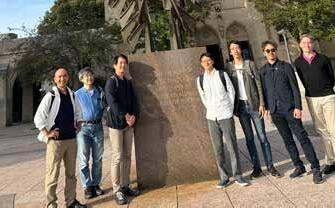
CCS visiting researches at BU’s Marsh Plaza
CSS continued its strong engagement initiated with the FY23 Quantum Convergence FRP. Promoting development of quantum computing applications in high energy and condensed matter physics and quantum chemical applications, CCS researchers developed a collaboration with researchers at Northeastern, UMass Boston, the Massachusetts Green High Performance Computing Center (MGHPCC) and the neutral atom quantum computer company, QuEra. The team submitted a proposal to NSF’s National Quantum Virtual Laboratory (NQVL) initiative to develop the New England Quantum Advantage Institute (NEQAI). This ambitious project includes development of fundamental research in quantum computing applications, workforce development training, and co-design and development of next generation quantum hardware, among other tasks. The project aims to launch our team on a significantly funded long-term research and development program and establishment of a regional center for quantum computing. Future plans include partnering with MassTech and other collaborators to develop an NSF Engine proposal around quantum computing technology development.
CCS researchers also collaborated with faculty from BU Institute for Global Sustainability (IGS) on a submission for a $3 million NSF NRT training grant that looks promising. The proposed project would aim to create a new training program, unifying resources in engineering, chemistry, computer science, and data sciences, to prepare BU PhD students to undertake convergent research to tackle the urgent societal problem of developing sustainable energy conversion and storage.
Biswas, S., Zhao, R., Alowa, F. et al. “Exciton polaron formation and hot-carrier relaxation in rigid Dion–Jacobson-type two-dimensional perovskites.” Nat. Mater. 23, 937–943 (2024). https://doi. org/10.1038/s41563-024-01895-z.
Catrina P. Oberg, Leah C. Spangler, David F. Coker, and Gregory D. Scholes. “Chirped Laser Pulse Control of Vibronic Wavepackets and Energy Transfer in Phycocyanin 645,” The Journal of Physical Chemistry Letters 2024 15 (28), 7125-7132, DOI: 10.1021/acs.jpclett.4c01455.
The Center for Information & Systems Engineering (CISE) is a university-wide research center whose mission is to deepen and broaden interdisciplinary research in the study and design of intelligent systems with broad societal applications. From concepts and algorithms to implementation in software systems and hardware, CISE researchers engage in interdisciplinary and convergent research to advance the science and societal impact of intelligent systems. CISE research has made seminal contributions and impacted a plethora of application areas, from robotics and autonomy, energy systems, computer systems, and communication networks, to medical imaging, computational medicine, video surveillance, and bioinformatics. The Center is led by Ayşe Coşkun, Professor of Engineering and Associate Dean for Research and Development, College of Engineering (July 1st, 2023-June 30th, 2024).
This past year, CISE invited three new faculty affiliates: Gianluca Stringhini (ENG), Tianyu Wang (ENG), and Sabrina Neuman (CAS, CS); the total of CISE affiliated faculty is now 53. CISE faculty published over 124 scholarly papers in FY24, and 14 of those papers were collaborations within the CISE community. Additionally, CISE affiliates received Red Hat Collaboratory Research Incubation Awards in the Small and Speculative Project categories. To raise awareness of affiliated faculty and student work, CISE wrote and promoted 23 faculty and student spotlight stories.
Throughout the year, CISE hosted seminars, workshops, and conferences that have brought together experts from academia, industry, and government to discuss the latest trends and challenges in systems engineering and computer science. On March 4th, CISE and Hariri Institute, in conjunction with BU Government and Community Affairs, co-organized and promoted the grand opening and ribbon cutting for the 2,000-square-foot BU Robotics and Autonomous Systems Teaching and Innovation Center (RASTIC), a $9 million project, supported by BU and the Massachusetts Technology Collabora-
tive (MassTech). The opening event hosted over 200 guests, including Boston University leadership, state dignitaries, and industry leaders. The stateof-the-art facility provides students with hands-on training in robotics, autonomous systems, and AI.
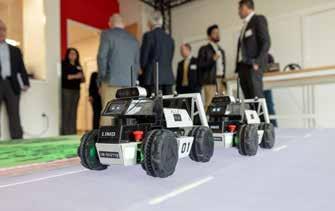
On November 10th, CISE hosted the AI for Understanding Earthquakes workshop, in collaboration with La Sapienza Università di Roma. The event featured prominent experts in AI and seismology that highlighted research in AI applications for earthquake predictions and responses. As a result of this collaborative workshop, ENG Professors Brian Kulis, Janusz Konrad, and Prakash Ishwar were awarded a Hariri Institute Focused Research Program titled “AI for Understanding Earthquakes”, further enabling interdisciplinary research alliances with major labs in this critical field.
Additionally, Ayşe Coşkun and Ajay Joshi (ENG) were awarded another Hariri Institute Focused Research Program entitled “Privacy Preserving Energy Analytics for Data Centers” with Adam Smith (CAS). Other CISE faculty involved in the project include ENG Professors Michael Caramanis, Alexander Olshevsky, Yannis Paschalidis.
CISE organized a total of 32 events this year, drawing over 1,650 attendees. To promote collaboration
with external academic and industry researchers, CISE organized 27 seminars, including four co-sponsored Joint and Distinguished speakers with Hariri Institute. CISE also hosted two visiting researchers through the Resident Scholar Program.
To support student development, the Center organized a Student Best Paper Competition, promoting graduate student original research for which they are listed as the first author. The Center also held the 10th annual CISE Graduate Student Workshop (CGSW 10.0), a day-long symposium for PhD scholars from diverse disciplines to present their original research. This year’s event was attended by over 100 faculty, students, and alumni.

CISE showcased its innovative work at the AI Expo for National Competitiveness in Washington, DC, a leading robotics conference. The exhibition aimed to enhance visibility and foster relationships with federal and industry stakeholders. At the expo, CISE and Hariri Institute promoted the innovative research and events at BU, including RASTIC and other significant events and projects.
“Neuro-Autonomy: Neuroscience-Inspired Perception, Navigation, and Spatial Awareness for Autonomous Robots,” Department of Defense and Office of Naval Research. $7.5M. PI: Yannis Paschalidis and Co-PIs: John Baillieul (ENG), Roberto Tron (ENG).
“EMERGE: ExaEpi for Elucidating Multiscale Ecosystem Complex for Robust Generalized Epidemiology,” Department of Energy. $450K. Co-PI: Yannis Paschalidis.
“CPS: Medium: Federated Learning for Predicting Electricity Consumption with Mixed Global/Local,” National Science Foundation. $1.2M. PI Alexander Olshevsky and Co-PIs Yannis Paschalidis, Michael Caramanis (ENG), Venkatesh Saligrama (ENG).
“AI-powered Performance Analytics for Heterogeneous HPC Systems,” Sandia National Laboratories. $495K. PI: Ayşe Coşkun and Co-PIs: Manuel Egele (ENG) and Brian Kulis.
J. Hall, L. E. Beaver, C. G. Cassandras and S. B. Andersson, “A Bilevel Optimization Scheme for Persistent Monitoring,” 2023 62nd IEEE Conference on Decision and Control (CDC), Singapore, Singapore, 2023, pp. 247-252, doi: 10.1109/CDC49753.2023.10383756.
B. Aksar, et al (A. Coşkun, M. Egele, B. Kulis, collab w Sandia Nat. Lab)., “Runtime Performance Anomaly Diagnosis in Production HPC Systems Using Active Learning,” in IEEE Transactions on Parallel and Distributed Systems, vol. 35, no. 4, pp. 693-706, April 2024, doi: 10.1109/TPDS.2024.3365462.
Janusz Konrad, Mertcan Cokbas, Prakash Ishwar, Thomas D.C. Little, Michael Gevelber, “High-accuracy people counting in large spaces using overhead fisheye cameras,” Energy and Buildings, Vol 307, 2024, doi.org/10.1016/j.enbuild.2024.113936.
Sarabeth Buckley, Catherine L. Connolly, Jonathan I. Levy, Pamela H. Templer, Jacqueline Ashmore, Luis Carvalho, Nathan Phillips, M. Patricia Fabian, “Carbon, indoor air, energy and financial benefits of coupled ventilation upgrade and enhanced rooftop garden installation: An interdisciplinary climate mitigation approach,” Sustainable Cities and Society, Vol 97, 2023, doi.org/10.1016/j.scs.2023.104792.
Wilson, Daniel C. and Acun, Fatih and Jana, Siddhartha and Ardanaz, Federico and Eastep, Jonathan M. and Paschalidis, Ioannis Ch. and Coşkun, Ayşe K., ”An End-to-End HPC Framework for Dynamic Power Objectives,” 2023, doi.org/10.1145/3624062.3624262.
The Center for Reliable Information Systems and Cyber Security (RISCS) promotes and coordinates high-impact multidisciplinary research and education focused on cybersecurity, cryptography, system reliability, and safe, trustworthy software, and algorithm development. The Center draws on the expertise of 22 faculty and over 100 graduate students from the College of Arts and Sciences, College of Engineering, Faculty of Computing & Data Sciences, Metropolitan College, and Questrom School of Business as well as industry, government, community and established partners. It spearheads the BU Cyber Security, Law, and Society Alliance (Cyber Alliance) — a collaboration between computer science, law, business, and social science researchers to position BU as a leader in the burgeoning global discussion on cybersecurity. RISCS also supports the BU Security Group, advancing research in cryptography and network Through RISCS, this year BU was re-certified as a National Center of Academic Excellence in Information Assurance Education and Research (NCAE-C). The Center is led by co-directors Ran Canetti, Professor of Computer Science, and Mayank Varia, Associate Professor of Computing and Data Sciences.
In FY24, RISCS organized 28 seminars drawing over 550+ attendees. Three Cyber Alliance seminars were organized; speakers included Professors of Law Gaia Bernstein (Seton Hall) and Haochen Sun (University of Hong Kong) and Datasphere Initiative Co-Founder Carolina Rossini. Moreover, RISCS sponsored, 19 RISCS-BUSec Cryptography Seminars, and six Practical Security Seminars.

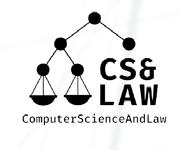
RISCS was instrumental in hosting the Third Computer Science and Law Symposium at BU in March 2024. The symposium is a centerpiece for the burgeoning community of joint CS and law research, and placing it at BU underlines the prominence of BU faculty and students in this new field. Ran Canetti co-chaired the symposium’s program committee; Stacey Dogan (LAW) served as a program committee member; and Mayank Varia chaired local arrangements.

Stacey Dogan with Hariri Institute also co-hosted the October 25th BU Research on Tap panel entitled “Towards Responsible AI: Privacy, Fairness, and Accountability.,” Speakers included RISCS and other Hariri Institute faculty affiliates including Mark Crovella (CAS, Computer Science), Tesary Lin (Questrom), Yannis Paschalidis (ENG), Andrew Sellars (LAW), Adam Smith (CAS, Computer Science), Chris Chao Su (COM), and Marshall Van Alstyne (Questrom).
RISCS engaged in a number of high-impact research collaborations:
In a joint effort, RISCS researchers from CS and Law submitted a response to a request for comments by the National Telecommunications and Information Administration (NTIA) at the Department of Commerce regarding the regulation of AI systems. The opinion has been cited multiple times by the summary document issued by the NTIA.
In a culmination of a multi-year effort, the Israeli Ministry of Health published an anonymized dataset of all births in Israel on February 24th; this is one of the most significant applications of differential privacy by a government statistics organization outside the US and was designed and carried out by RISCS researchers.
RISCS hosted the preparation and the research leading to the NSF interdisciplinary, multi-institution GCR (growing convergence research) project led by BU Physics, CS and Mathematics faculty, with participation of Cornell University and the University of Southern Florida. This is a $2.5 million, five-year program that is bound to have significant impact on novel, physics-inspired design of cryptographic algorithms.
RISCS continued its contribution and participation in the Quantum Convergence Initiative (QCI). RISCS contributed a year of PhD student RAship to the QCI and hosted the preparation of a successful joint proposal for the NSF interdisciplinary GCR program. RISCS also enabled cross-disciplinary teaching and research across CS and Physics.
With the Questrom School of Business, RISCS initiated a collaboration with the Center for Research toward Advancing Financial Technologies (CRAFT) at Boston University led by Eran Tromer (CAS, CS).
Ari Karchmer (CS PhD 2024, advised by Ran Canetti) was awarded the Best Student Paper award at the Innovations in Theoretical Computer Science Conference (ITCS 2024) for “Distributional PAC-Learning from Nisan’s natural proofs.”
Shlomi Hod was invited to Washington D.C. to present a workshop to congressional staff on the ethical, legal, and societal implications of AI with the goal of improving congressional staffers’ Responsible AI literacy.
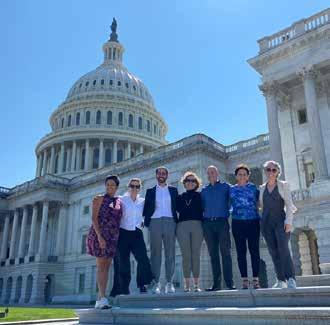
Shlomi Hod at the Capitol with his co-presenters of the Operationalizing Responsible AI Congressional Workshop
RISCS researchers have published over 60 papers this year, in a variety of areas. A non-exhaustive list includes quantum computation, complexity, and cryptography; foundational and applied cryptography; system security; foundational and applied data privacy; trustworthy AI; public policy; mechanism design.
The Digital Health Initiative (DHI) focuses on the essential role digital technologies play in the health and wellness of populations, and the integration of these technologies into people’s lives and health systems. DHI projects span AI, computing and data sciences, medical informatics, computational biology, healthcare technology and automation, health behavior change, and healthcare delivery. This year, a number of initiatives were organized that advanced DHI goals, including funding for research, research talks, and seminar series.
For the second year, the Institute issued a special funding call for proposals for the DHI initiative, which is cosponsored by the Hariri Institute, the BU School of Public Health Population Health Data Science Program, the Clinical and Translational Science Institute, and the Evans Center for Interdisciplinary Biomedical Research. On February 6th, 2024 an event was organized for researchers to learn about the proposal call and featured presentations from clinicians and faculty researchers from diverse disciplines spanning the scope of DHI disciplines and covering diverse medical applications such as gynecology, health equity, infectious diseases, medical imaging, neurological and psychiatric disorders, oncology, opioid use, urban firearm violence, cell biology, and tissue engineering. On May 15th, it was announced that DHI FRPs were awarded to: (1) Clare Poynton (Chobanian & Avedisian SOM) and Kayhan Batmanghelich (ENG), who will lead a project on “Enhancing Models for Breast Cancer Risk Prediction and Bias Mitigation through Clinician AI Collaboration”, and (2) Xin Zhang (ENG), and Chad Farris (Chobanian & Avedisian SOM) who will lead a project on “Multimodal Transformer Architectures for Neuropathology Study of Alzheimer’s Disease.”
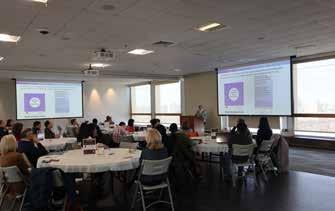
Health Data Science Focused Research Program Funding Event held at the BU Medical Campus on February 6th, 2024
The Institute cosponsored six Health Data Science Distinguished Speaker seminars with the BU School of Public Health Population Health Data Science Program, the BU School of Public Health Department of Biostatistics, and the Providence/ Boston Center for AIDS Research (CFAR), attended by over 560+ faculty, students and staff.
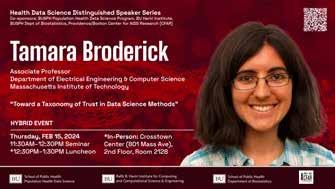
The Institute continued collaborative work with the BU Center on Emerging Infectious Diseases (CEID), cosponsoring two events. A panel discussion on “Reflecting On One Year of MPOX Response” was held August 17th, 2023, to identify best practices from the MPOX response to future infectious diseases threats. Moderated by CEID Director Dr. Nahid Bhadelia, the event featured opening remarks from Dr. Ashish Jha, Dean of Brown University’s School of Public Health, and panelists Dr. Nikki Romanik, Chief of Staff of the White House Office of Pandemic Preparedness and Response Policy; Dr. Demetre Daskalakis, Deputy Coordinator of the White House National Monkeypox Response Team; Dr. Céline Gounder, CBS News Medical Contributor, Senior Fellow and Editor-at-Large for Public Health at KFF and KFF Health News; and Adrianna Boulin, Director of Community Impact and Engagement at Fenway Health. The hybrid event drew over 194 attendees (54 in-person; 140 zoom). On April 8th, the Institute welcomed Melissa Fleming, United Nations Under Secretary General for Global Communications, for a lecture titled “Building Resilience: The Transformative Role of AI in Global Public Health Communication.” Flemming shared insights into the United Nations’ perspective on harnessing AI to build resilience in global communications. The hybrid event was attended by 133 (88 in-person; 45 zoom) faculty, students and staff.
This was the second year that DHI co-sponsored the Machine Learning in Medicine (MLxMed) Seminar Series. This multi-institutional series focuses on new algorithms, real-world deployment, and future trends in machine learning for supporting, enabling and improving medical discovery and clinical decision making in areas such as medical imaging, cancer diagnostics, precision medicine, clinical trials, and predictive modeling based on electronic health records. Series cosponsors include University of Pittsburgh, University of Pittsburgh Medical Center, and University of Toronto and is hosted at BU by Kayhan Batmanghelich (ENG). In FY24, 18 seminars were organized with an estimated 1,230+ number of attendees.
DHI affiliated faculty also received three new grants (from DoE, NSF, and Merck Research) and had multiple papers published.

Yannis Paschalidis (ENG), Rhoda Au (Chobanian & Avedisian SOM) and Vijaya Kolachalama (Chobanian & Avedisian SOM) and collaborators published “Prediction of Alzheimer’s disease progression within 6 years using speech: a novel approach leveraging language models” in Alzheimer’s & Dementia: The Journal of the Alzheimer’s Association. (doi.org/10.1002/alz.13886).
Kayhan Batmanghelich, with collaborators, published a paper that uses anatomy-aware generative AI and explainable AI methods to improve synthesizing 3D images with specific abnormalities. (Xu Y, Sun L, Peng W, Jia S, Morrison K, Perer A, Zandifar A, Visweswaran S, Eslami M, Batmanghelich K. MedSyn: Text-guided Anatomy-aware Synthesis of High-Fidelity 3D CT Images. IEEE Trans Med Imaging. 2024 Jun 20;PP. doi: 10.1109/TMI.2024.3415032.)
DHI faculty researchers published several papers as part of the NSF Predictive Intelligence for Pandemic Prevention (PIPP) grant, including: Jingmei Yang, Kenji C. Walker, Ayse A. Bekar-Cesaretli, Boran Hao, Nahid Bhadelia, Diane Joseph-McCarthy, Ioannis Ch. Paschalidis, “Automating biomedical literature review for rapid drug discovery: Leveraging GPT-4 to expedite pandemic response,” International Journal of Medical Informatics, Volume 189, 2024, doi.org/10.1016/j.ijmedinf.2024.105500; and Eugenio Paglino Dielle J. Lundberg, Elizabeth Wrigley-Field, and Andrew C. Stokes, “Excess natural-cause mortality in US counties and its association with reported COVID-19 deaths,” PNAS. February 1, 2024. 121 (6) e2313661121. doi.org/10.1073/ pnas.2313661121.
The Mass Open Cloud (MOC) Alliance, launched in 2013, has transformed into the MOC Alliance – a partnership between higher education, government, and industry to create an open production cloud which will provide domain researchers with predictable low-cost services while enabling innovation by a broad community of academic researchers and industry collaborators. The MOC Alliance supports and coordinates a set of interrelated projects, including production cloud services supported institutionally by BU and Harvard University, a national testbed for cloud researchers, the $20 million Red Hat Collaboratory at BU, and a planned national center on cloud and datacenter-scale computing. The MOC Alliance is led by Orran Krieger (ENG).
In March, the MOC Alliance hosted its annual workshop. The two-day hybrid event featured over 35 targeted speakers, 250 in-person attendees, hundreds of virtual attendees, including 34 companies, 16 institutions of higher education, and multiple government agencies. The workshop was divided into four sections: AI and the AI Alliance, the Marriage of Data and Compute, the Open Cloud and Governance and Partnerships, Education, Support for System Research, and User Outreach Facilitation.

The MOC Alliance provides administrative management of the New England Research Cloud (NERC), an affordable production cloud powered by high-performance GPUs that is operated by BU and Harvard Research IT and was founded with a $875,000 award from the Massachusetts Technology Collaborative (MTC). This year, MOC Alliance Director Orran Krieger received a $1.3 million MTC award that will be used to accelerate the expansion of the NERC’s capabilities. Additionally, with a unique consumption model with Lenovo, the NERC deployed 64A100 GPUs into the datacenter in Holyoke in March. This acquisition reduces the time to complete extensive training models, which attracts many AI researchers to the NERC. NERC production services were also made available to general research and education users this year; NERC services are currently used by the core MOC institutions, BU, Harvard, Northeastern, MIT, UMASS and Yale as well as Boston Children’s Hospital, Code for Boston, Bentley, WPI, URI and several others.
Krieger was also awarded a $750,000 National Science Foundation Collaborative Award with Northern University. The award will be used to establish The Center for Systems Innovation at Scale (i-Scale), an industry-university research partnership that will explore unique challenges of computing systems at large scale, across software, networking, and hardware layers, seeking answers to problems of pre-competitive research. Industry leads met in March to discuss research themes of the program and will convene in the fall to establish which faculty projects will be funded.
In December, the MOC Alliance became a founding member of the AI Alliance, launched by IBM and Meta. Comprised of an international community of leading technology developers, researchers, and adopters, the AI alliance aims to foster an open community to advance open, safe, responsible AI.

The MOC Alliance announces the launch of the AI Alliance as a founding member
A partnership between Red Hat and Boston University, the Red Hat Collaboratory connects BU faculty and students with industry practitioners working in open-source software communities. Through BU and Red Hat’s $20 million expanded partnership, announced in 2021, the Red Hat Collaboratory seeks to create more trustworthy, reliable, scalable, self-operating, distributed, heterogeneous compute platforms that stretch from edge devices to cloud datacenters.
The Red Hat Collaboratory also enables innovative partnerships between academic researchers and open source communities. Collaboration in systems research at this scale can have a profound impact on society. Projects funded through the Red Hat Collaboratory Research Incubation Award are open source and focus on problems of distributed, operating, security, or network systems whose solutions show promise for advancing their fields and impacting the tech industry.
This year, the Red Hat Collaboratory awarded 12 projects to BU faculty members and industry collaborators, totaling more than $1.8 million in funding. The Collaboratory also funded the Software & Application Innovation Lab (SAIL) at Boston University with $330,000 to enable software development and integration that is needed to support new New England Research Cloud (NERC) projects. SAIL collaborates with Red Hat engineers while actively introducing faculty to the NERC.
Speculative projects
• Jonathan Appavoo (CAS, Computer Science), Symbiotes: a new step in Linux’s evolution
• Manuel Egele (ENG), Lock ’n load: deadlock detection in binary-only kernel modules
• Eshed Ohn-Bar, (ENG), Minimal mobile systems via cloud-based adaptive task processing
• David Starobinski (ENG), Improving cybersecurity operations using knowledge graphs
• Jonathan Appavoo (CAS, Computer Science), Optimizing kernel paths for performance and energy
• Martin Herbordt (ENG), Practical programming of FPGAs with open source tools
• Vasia Kalavri (CAS, Computer Science), Towards high performance and energy efficiency in open source stream processing
• Ajay Joshi (ENG), CoFHE: compiler for fully homomorphic encryption
• Martin Herbordt (ENG), DISL: a dynamic infrastructure services layer for reconfigurable hardware
• Jonathan Appavoo, (CAS, Computer Science), Discovering opportunities for optimizing OpenShift energy consumption
• Manuel Egele (ENG), HySe: hypervisor security through component-wise fuzzing
• Eshed Ohn-Bar (CAS), Co-Ops: collaborative open source and privacy-preserving training for edge and automotive AI

The Red Hat Collaboratory funded Student Research Projects geared towards providing BU students with research and experiential learning opportunities that advance open source projects in cloud computing, systems engineering infrastructure, and security. Eleven undergraduates received funding for open-source projects, totaling $122,000, that aim to improve the security, efficiency, and intelligence of computing systems.
This year, project recipients of the Red Hat Collaboratory 2023 and 2024 Research Incubation Awards were recognized for excellence at preeminent research conferences, including “On-the-fly Data Transformation in Action,” (https://disc.bu.edu/papers/vldb23-mun) which received the Best Demo Award at the 2023 Proceedings of the Very Large Data Bases (VLDB) Endowment, and “Optimal Control of Connected Automated Vehicles with Event-Triggered Control Barrier Functions: a Test Bed for Safe Optimal Merging,” (doi: 10.1109/CCTA54093.2023.10253379), which was selected as the Outstanding Student Paper at the 2023 IEEE Conference on Control Technology and Applications (CCTA) . Project recipients also received seven grant awards including $1.8 million from five National Science Foundation (NSF) awards.
The Red Hat Collaboratory also supports the BU Computer Systems Seminar and Red Hat Colloquium Series which hosted 24 events throughout the year featuring BU faculty members, Red Hat engineers, student research presentations, and international researchers with expertise in systems engineering. The series attracted 960 attendees.
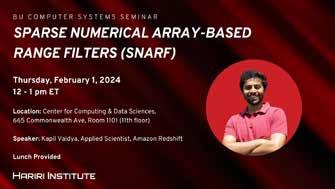
The Red Hat Collaboratory has been co-led by Orran Krieger (ENG) and Hugh Brock (Red Hat) since its inception in 2016. In April, Hugh Brock transitioned to new opportunities as Senior Director, Product Software Architecture and Engineering at Equinix. We wish him success and look forward to ongoing research collaborations with him in his new role.
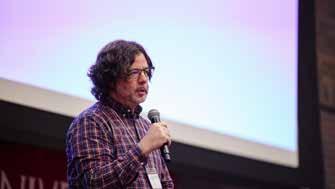
SAIL is the premier professional research, software engineering, and consulting lab within the Hariri Institute. SAIL acts as both a driver and a collaborative partner in the creation of cutting-edge solutions for the data-driven, computational, and software engineering aspects of research across the university and beyond. SAIL’s range of services includes full-stack web and mobile application development, code base refactoring and maintenance, software best-practice consulting, project and product management guidance, and assistance with proposal and grant writing to secure extramural funding for research projects.
SAIL was awarded a $330,000 Red Hat Collaboratory grant to support research and development from many different domain science areas into the NERC. For David Boas (ENG), SAIL continued its contribution to adding features to a web user interface tool used to facilitate creating, managing, and sharing fNIRS neuroimaging datasets across the community. For BU’s DAMP Lab, led by Douglas Densmore (ENG), SAIL is developing a web-based tool that improves workflow and information access for microbiological researchers and clinical services.
SAIL engaged in new multidisciplinary projects focused on improving healthcare and patient outcomes through technology advances. SAIL engaged with the Biomedical Innovation Technologies Affinity Research Collaborative (BIT-ARC), an initiative led by the Evans Center for Interdisciplinary Biomedical Research with collaborative support with the Clinical & Translational Science Institute and Office of Technology Development. For the project, SAIL developed a web-based application that houses a machine learning algorithm for a BIT-ARC project designed to automate measurement and analysis of kidney glomerular ultrastructure. The BIT-ARC project is led by Chobanian & Avedisian SOM Professors Weining Lu (MD), Chao Zhang (PhD), Joel Henderson (MD), and Vijaya Kolachalama (PhD) and SAIL Director William Tomlin-
son (PhD). SAIL also played a key role in the technical development of the Life Impact Burn Recovery Evaluation (LIBRE) Profile, collaborating with clinicians and researchers of the Spaulding Rehabilitation Center at Mass General Brigham and the LIBRE team at BU SPH. The LIBRE Profile is a mobile application designed to assess the social recovery of burn survivors. LIBRE Profile development was funded by The App Factory, which is supported by the National Institute on Disability, Independent Living, and Rehabilitation Research (NIDILRR) within HHS.
SAIL is also collaborating on innovative research projects aimed at strengthening equity in and through education. For Naomi Caselli (Wheelock), SAIL is advancing development of the ASL-LEX, a database of lexical and phonological properties of American Sign Language signs designed to facilitate collaborative and/or independent research. In collaboration with TJ McKenna (Wheelock), SAIL is developing the STEM EquityCoach, a web application designed to address the critical need for culturally relevant and inclusive STEM education in K-12 settings.
SAIL initiated new collaborations with researchers of the Center for Space Physics. For Marianna Felici and Paul Withers, SAIL developed a web application that allows for the simulation of microbial communities. The SAIL-developed application utilizes the COMETS (Computation Of Microbial Ecosystems in Time and Space) tool to simulate the complex growth patterns of bacterial colonies. SAIL also helped develop refactor software for the NASA-sponsored Lunar Environment heliospheric X-ray Imager (LEXI), an x-ray telescope which will be going to the moon later this year. The project was led by Brian Walsh (ENG).
SAIL also engaged with the Global Development Policy Center on work for the China’s Overseas Development Finance database. SAIL developed a web application that enables the scraping, language translation, consolidating, and generation
of recommended content/article labels for information sourced from websites of interest.
A major area of expansion for SAIL was its software internship program, a pathway to enhanced experiential learning opportunities for undergraduate and graduate students and partnerships with larger research centers and organizations within BU. SAIL was awarded a Shipley Center for Digital Learning and Innovation award to pilot the SAIL Microservices And Software Tools (MAST) program for BU students interested in developing microservices and software tools for university research (under the supervision of a SAIL Engineer). Entering its second year, the MAST program has successfully generated outcomes for five research projects, while providing enhanced experiential learning opportunities for 15 students. Additionally, SAIL received a Massachusetts Life Science Center Grant that provides internships to computer science and data science students. SAIL will use these resources to continue to provide impact to student learning outcomes, while driving the progress of university research and creating leadership opportunities for its technical staff. SAIL also initiated a collaboration with Boston University Academy (BUA) to conduct hands-on coding seminars to enhance student software engineering and machine learning skills. The same collaboration spawned a pilot project, with the help of BUA Leadership, that provides their high school seniors with SAIL internship opportunities, enabling them to contribute to actual research projects as part of their senior thesis project.
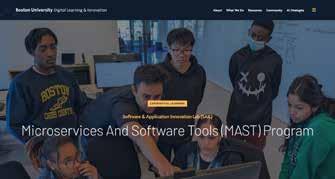
SAIL COLLABORATES WITH 80+ FACULTY MEMBERS ACROSS 20+ DEPARTMENTS.
SAIL PORTION OF SUBMITTED PROPOSALS ($3.1M).
RECEIVED OVER 50 APPLICATIONS FOR SOFTWARE ENGINEERING INTERNSHIPS (2 SELECTED).
15 ACTIVE PROJECTS
Generative Artificial Intelligence (GenAI) is poised to have a transformative impact on education and research. While presenting incredible opportunities for innovation and knowledge creation, GenAI also raises challenges related to academic integrity, intellectual property, security, skill acquisition and retention, and future job security. Recognizing the need for a unified approach, BU Provost ad interim Kenneth Lutchen (ENG) established the AI Task Force in September 2023 to help guide BU in responsibly addressing GenAI in education and research.
Led by Professors Yannis Paschalidis and Wesley Wildman (STH, CDS), the task force is comprised of faculty experts from diverse disciplines (including the sciences, engineering, humanities, law, business, and education). The task force was charged with developing specific recommendations for how generative AI can be used successfully in education and research, as well as policies and best practices regarding the use of AI by students and faculty to help prevent its misuse or negative impact.
The culmination of the task force’s work was a report released in April that informs and educates faculty, and advises the BU administration on issues related to the use of GenAI tools in education and research. The report contains many important observations, policy proposals, and best practice guidelines, as well as examples for where caution is warranted. A key recommendation is to “critically embrace” the use of GenAI.

In addition to the report, the task force developed several resources: (1) an analysis of GenAI detector reliability, providing a practical guide for faculty as they consider how to detect GenAI material in student submissions; (2) a web-based app that provides a searchable repository of GenAI policy and advice documents from institutions of higher education; and (3) semantic network and topic modeling analyses of these policy documents.
The full BU AI Task Force report and supplemental resources can be found on the Hariri Institute for Computing website (www.bu.edu/hic).
Yannis Paschalidis, (Co-Chair) Distinguished Professor of Engineering, College of Engineering; Founding Professor of Computing & Data Sciences; Director, Rafik B. Hariri Institute for Computing and Computational Science & Engineering
Wesley J. Wildman, (Co-Chair) Professor of Philosophy, Theology and Ethics, School of Theology; Founding Professor of Computing & Data Sciences and Chair of Faculty Affairs, Faculty of Computing & Data Sciences
Mary Churchill, Associate Dean for Strategic Initiatives & Community Engagement; Professor of the Practice and Program Director, Higher Education Administration, Wheelock College of Education & Human Development
Mark Crovella, Professor of Computer Science, College of Arts & Sciences; Founding Professor of Computing & Data Sciences and Chair of Faculty Affairs, Faculty of Computing & Data Sciences
Anne Danehy, Associate Dean of Academic Affairs; Associate Professor of the Practice, College of Communication
Pary Fassihi, Senior Lecturer, Arts & Sciences Writing Program, College of Arts & Sciences
Juliet Floyd, Borden Parker Bowne Professor of Philosophy, College of Arts & Sciences; Director, BU Center for the Humanities
Priya Garg, Associate Dean, Office of Medical Education, Chobanian & Avedisian School of Medicine
Amie Grills, Associate Provost for Undergraduate Affairs; Professor of Counseling Psychology & Applied Human Development, Wheelock College of Education & Human Development
Tal Gross, Associate Professor of Markets, Public Policy & Law, Questrom School of Business
Wendy Heiger-Bernays, Clinical Professor of Environmental Health, School of Public Health
Keith Hylton, William Fairfield Warren Distinguished Professor; Professor of Law, School of Law
Daniel Kleinman, Associate Provost for Graduate Affairs; Professor of Sociology, College of Arts & Sciences
Gail McCausland, Assistant Dean of Academic Affairs; Clinical Professor of Periodontology, Henry M. Goldman School of Dental Medicine
Matt Parfitt, Associate Professor of Rhetoric, College of General Studies
Wilson Wong, Associate Professor of Biomedical Engineering, College of Engineering
BU AI task force members were assisted by Deidre Fisher, project manager for strategic initiatives in the Office of the Provost.
In FY24, the Hariri Institute engaged in strategic communications and marketing to elevate awareness of the Institute and its affiliate centers, initiatives, faculty, and students. Stories highlighting diverse research disciplines were written and promoted through public relations, social media, and newsletters. Additionally, marketing created videos and microsites promoting faculty-driven initiatives. Through these efforts, marketing raised the visibility of the Institute and its affiliates, achieving broad coverage in media and across social channels.
Editorial Content: The Institute’s marketing staff wrote 48 stories highlighting faculty, student and Institute work. Additionally, marketing created four promotional videos to raise visibility of faculty-led initiatives, including for computational humanities research led by Cathie Jo Martin (CAS, Political Science), for the Robotics & Autonomous Systems Teaching and Innovation Center (RASTIC) led by Kenneth Sebesta (ENG), for the AI and Education Initiative led by Naomi Caselli (Wheelock) and for AI-driven Alzeimer’s research led by Yannis Paschalidis.
Press Coverage: There were 277 media stories mentioning Hariri Institute with over 4,500 total engagement on X (shares, comments, or likes). The stories appeared in prominent outlets such as The Boston Globe, The Boston Herald, Futurity, Health Brew, Reuters Today, WBUR, WBZ Radio, as well as vertical press. The FY24 earned media coverage, based on the viewership, brand strength and reach of media outlets, is equivalent to $4.7 million worth of advertising in the same outlets.
Website: Hariri Institute website averaged monthly page views of 13,294 in FY24. To support faculty-led initiatives, marketing developed three microsites hosted on the Hariri Institute website for the BU AI Task Force, Quantum Convergence, and ES24 national conference, garnering 6,630 page views.
Social Media: Hariri Institute continued to achieve growth across LinkedIn, X, Instagram, and Youtube. The Institute grew its follower base to over 4,400, an increase of over 30 percent. Total engagement was over 3,000, an over 18% increase from the previous year.
Events: Hariri Institute organizes and supports a diverse range of events, often highlighting high-impact multidisciplinary research in collaboration across and external to BU. The Institute’s Distinguished Speaker Seminars bring renowned global researchers across academia, industry, non-profit organizations, and government to speak at Boston University. The Institute also organizes seminars featuring expert speakers across the research domains of the Institute’s centers and initiatives. Large scale research symposiums and workshops are also organized throughout the year.
In FY24, the Institute organized and cosponsored 215 events with an estimated total attendance of 9,000+. The majority of Institute events are in-person, facilitating opportunities for the meet and exchange of ideas with colleagues with similar interests in interdisciplinary research.
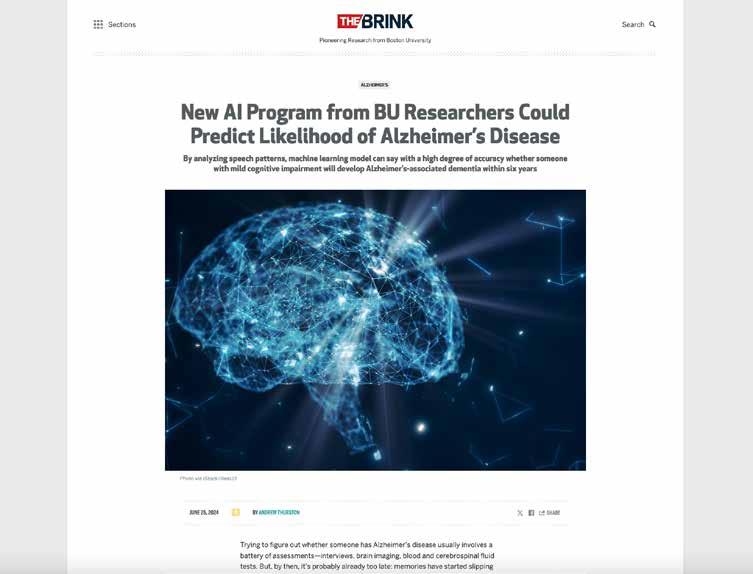
June 25, 2024 - The Brink, “AI Program for Early Alzheimer’s Detection” featured published research led by Yannis Paschalidis (ENG) with Chobanian & Avedisian SOM Professors Vijaya B. Kolachalama and Rhoda Au, and collaborators. Globally covered in prominent media, including Wall Street Journal, Boston Herald, and National Public Radio, among others.
Press Stories and Media Mentions
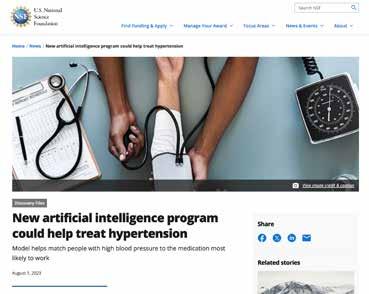
Hariri Institute Authored Stories NSF News Research Story
1
6
Of the BU Brink‘s Top Stories of 2023



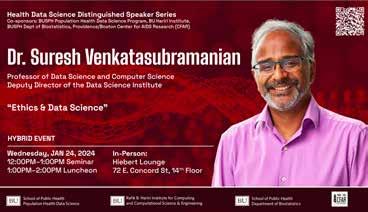
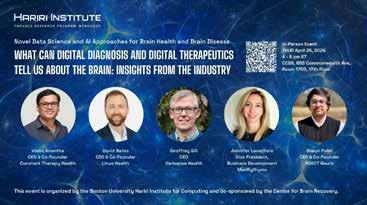
$4.7M 3K+ (+18%)
Estimated Advertising Equivalency of Earned Media
Total Engagement
4.4K+ (+30%)
Total Followers

Total Attendees 215 9,000+
Events
The 2024 Hariri Institute Community Recognition Awards celebrate Hariri Institute personnel whose contributions have been instrumental in helping to bring success to their team and to our organization. This program also aims to raise awareness of the important work that transpires, at all levels, within the Institute and broaden understanding of how personnel efforts help advance the Institute’s mission. Award recipients were selected through voting by the community.

AI and Education Initiative Awards at the Hariri Institute Community Recognition Awards Ceremony on May 30, 2024.

Hariri Institute Community Recognition Awards recipients at the awards ceremony on May 30, 2024.
Recipient: Emily Johnson, Associate Director, Research Administration, Hariri Institute
Finalists: Katherine D’Angelo, Assistant Director, Program and Events, Hariri Institute
Innovation Award
Orran Krieger, Director, MOC Alliance, Co-Director, Red Hat Collaboratory, Professor, Electrical & Computer Engineering, Computer Science, Boston University
Rishi Shah, Computer Science, Software Engineer Intern, SAIL
Margaret Stanton, International Relations and Chinese Language and Literature, Marketing Assistant, Hariri Institute
Johnathan Eaton, International Relations and National Security Studies, Office Assistant, Hariri Institute
Ross Mikulskis, Computer Science, Cloud Engineering Intern, MOC Alliance/Red Hat Collaboratory
Maureen Stanton, Assistant Director of Marketing & Communications, Hariri Institute
Jennifer McDonough, Administrative Manager, Boston Women’s Workforce Council (BWWC)
Ken Rudolph, Marketing & Communications Specialist, MOC Alliance/Hariri Institute
Ziba Cranmer, Director, BU Spark! (FCDS), Steering Committee Member, Hariri Institute
Cansu Demikran, PhD candidate advised by Ajay Joshi (ENG), was selected as one of the 2024 ML and Systems Rising Stars.
Farbin Fayza, PhD student advised by Ajay Joshi (ENG), received the Institute for Global Sustainability (IGS) Summer Fellowship.
Shlomi Hod, PhD candidate advised by Ran Canetti (CAS, CS) was invited to Washington D.C. to present a workshop to congressional staff on the ethical, legal, and societal implications of AI with the goal of improving congressional staffers’ Responsible AI literacy.
Ari Karchmer, CS PhD 2024 advised by Ran Canetti, was awarded the Best Student Paper award at the Innovations in Theoretical Computer Science Conference (ITCS 2024) for “Distributional PAC-Learning from Nisan’s natural proofs.”
Chen Ling, Hariri Institute GSF and PhD candidate advised by Gianluca Stringhini (ENG), has been selected to attend the 2023 EECS Rising Stars Program.
ENG PhD candidates Ehsan Sabouni, advised by Christos Cassandras (ENG), and H. M. Sabbir Ahmad, advised by Wenchao Li (ENG), received the 2023 IEEE Conference on Control Technology and Applications (CCTA) Best Student Paper Award for “Optimal Control of Connected Automated Vehicles with Event-Triggered Control Barrier Functions: a Test Bed for Safe Optimal Merging.” doi: 10.1109/ CCTA54093.2023.10253379.
Lingyi Xu, Hariri Institute GSF and CDS PhD student advised by Vijaya Kolachalama (Chobanian & Avedisian SOM), received the BU Women’s Guild Scholarship.
Clarivate’s 2023 World’s Most Influential Researchers
Sandro Galea (Dean, Robert A. Knox Professor, School of Public Health).
Benjamin Sovacool (Professor, College of Arts & Sciences, Department of Earth & Environment; Director, Institute for Global Sustainability).
Eugene Stanley (Professor Emeritus, College of Arts & Sciences, Department of Physics).
Curtis Woodcock (Professor, College of Arts & Sciences, Department of Earth & Environment).
Distinguished Society Fellowships & Awards
Siddharth Ramachandran (ENG), named AAAS Fellow.
Daniel Segrè (CAS, Biology), named AAAS Fellow.
Cara Stepp (Sargent), named AIMBE Fellow.
Distinguished Foundation Fellowships & Awards
Rhoda Au (Chobanian & Avedisian SOM), awarded the 2023 Melvin R. Goodes Prize for Excellence in Alzheimer’s Drug Development by the Alzheimer’s Drug Discovery Foundation.
Chuanfei Dong (CAS, Astronomy), named Sloan Research Fellow.
Vivek Goyal (ENG), named Guggenheim Foundation Fellow.
Jaime Gradus (SPH), awarded the Carol J. Rowland Hogue Award for Outstanding Mid-Career Achievement by the Society for Epidemiologic Research.
Lucy Hutyra (CAS, Earth & Environment), named MacArthur Foundation Fellow.
Swathi Kiran (Sargent), received Honors of the Association from the the American American Speech-Language-Hearing Association, the highest award bestowed by ASHA.
Hadi Nia (ENG), named Sloan Research Fellow.
Alex Sushkov (CAS, Physics), named to the Gordon and Betty Moore Foundation’s 2023 cohort of Experimental Physics Investigators.
Priscilla Slanetz (Chobanian & Avedisian SOM), received the 2023 Honored Educator Award from the Radiological Society of North America (RSNA).
Marshall Van Alstyne (Questrom), named one of Thinker50’s Most Influential Management Thinkers in the World.
Najoung Kim (CAS, Computer Science), awarded Google Cloud Platform (GCP) credits from Google to support work on analyzing multimodal representation.
Orran Krieger (ENG), received the 2023 Excellence in Technology Transfer Award from Federal Laboratory Consortium for Technology Transfer with collaborators.
Cathie Jo Martin (CAS, Political Science), co-winner of the Best Book Award from the APSA European Politics and Society section for her book Education for All?
Emma Lejeune (ENG) selected to the 2024 National Academy of Engineering US Frontiers of Engineering Cohort.
Elaine Nsoesie (SPH), named a Change Agent for Cultivating Inclusive AI by Mozilla.
Alyssa Pierson (ENG), awarded the inaugural MassRobotics Rising Star in Robotics Medal .
Yorghos Tripodis (SPH), received a Fulbright U.S. Scholar Award to pursue statistical methods for dementia and aging in France (2024-25).
Rabia Tugce Yazicigil (ENG), selected to the 2024 National Academy of Engineering US Frontiers of Engineering Cohort.
Hua Wang (ENG), named one of the 2023 Most Influential Asian American Pacific Islanders in Boston.
Xin Zhang (ENG), awarded the 2024 Robert Henry Thurston Lecture Award from the American Society for Mechanical Engineers.
Margrit Betke (CAS, Computer Science) with CS PhD student Wenda Qin and collaborators received the 2023 IEEE International Joint Conference on Biometrics (IJCB) Best Poster Award for “Age-constrained Ear Recognition: The EICZA Dataset and SASE Baseline Model.”
Ayşe Kivilcim Coşkun (ENG), with co-authors, won the IEEE TCAD Donald O. Pederson Best Paper Award for “PACT: An Extensible Parallel Thermal Simulator for Emerging Integration and Cooling Technologies,” DOI:10.1109/TCAD.2021.3079166.
Nina Mazar (Questrom) received the 2024 AMA-EBSCO-RRBM Award for Responsible Research in Marketing for the co-authored paper, “Increasing Organ Donor Registrations with Behavioral Interventions: A Field Experiment,” Journal of Marketing. 85, no. 3 (2021): 168-183. https://doi. org/10.1177/00222429219900.
Bryan Plummer (CAS, Computer Science) with CS PhD student Zhongping Zhang and collaborators received the 2023 AI for Content Creation Workshop, IEEE Computer Vision and Pattern Recognition Conference Best Paper Runner Up:“Text-to-image Editing by Image Information Removal.
Eran Tromer (CAS, Computer Science) received a Test of Time Award at the IEEE Symposium on Security and Privacy (S&P) 2024 for his co-authored paper “Zerocash: Decentralized Payments from Bitcoin,” https://ieeexplore.ieee.org/document/6956581/authors#authors.
Hafsah Shahzad (ENG, PhD Student), Martin Herbordt (ENG), and Red Hat co-authors received the Best Paper Award at the 25th International Symposium on Quality Electronic Design (ISQED) for “AutoAnnotate: Reinforcement Learning based Code Annotation for High Level Synthesis,” 1-9, doi: 10.1109/ISQED60706.2024.10528738.
BU and Red Hat won the VLDB 2023 Conference Best Demo award for “On-the-fly Data Transformation in Action;” led by BU Postdoc Ju Hyoung Mun with collaborators, from BU: Renato Mancuso (CAS, Computer Science), Manos Athanassoulis (CAS, Computer Science), Konstantinos Karatsenidis, Tarikul Islam Papon, Shahin Roozkhosh; from Red Hat: Ahmed Sanaullah and Ulrich Drepper; and Denis Hoornaert (Technical University of Munich). https:// doi.org/10.14778/3611540.3611593.
Lucy Hutyra (CAS, Earth & Environment), A&S Distinguished Professor
Andrei Ruckenstein (CAS, Physics), A&S Distinguished Professor
Bobak Nazer (ENG), the 2024 Gerald and Deane Gitner Family Award for Innovation in Teaching with Technology
Priscilla Slanetz, MD (Chobanian & Avedisian SOM), Alpha Omega Alpha, Faculty Membership (lifetime)
Full Professor
John Connor (Chobanian & Avedisian SOM)
Catherine Espaillat, (CAS, Astronomy)
Traci Hong (COM)
Stefano Monti (Chobanian & Avedisian SOM)
Associate Professor
Naomi Caselli (Wheelock)
Elizabeth Coppock (CAS, Linguistics)
James Cummings (COM)
Christina L. Dobbs (Wheelock)
Neha Gondal (CAS, Sociology)
Garrett Johnson (Questrom)
Mahesh Karra (Pardee)
Deepak Kumar (Sargent)
Kevin Lane (SPH)
Wenchao Li (ENG)
Renato Mancuso (CAS, Computer Science)
Christoph Nolte (CAS, Earth and Environment)
Mickey Salins (CAS, Mathematics & Statistics)
Lei Tian (ENG)
Shengzhi Zhang (MET, CS)
Clinical Assistant Professor
TJ McKenna (Wheelock)
National Center of Excellence Award
BU was re-designated a Center of Academic Excellence (CAE-R) in Cyber Defense and Research by the National Security Agency and Department of Homeland Security. This effort was led by RISCS affiliates Dean Tanya Zlateva (MET), and Professors Yuting Zhang (MET), Ran Canetti (CAS, CS) and Mayank Varia (CDS).
Ana Fiszbein (CAS, Biology), NSF Early CAREER Award
Jonathan Huggins (CAS, Mathematics & Statistics), NSF Early CAREER Award
Wenchao Li (ENG), NSF Early CAREER Award
Andrew Sabelhaus (ENG), NSF Early CAREER Award
Rabia Yazicigil (ENG), NSF Early CAREER Award
Renato Mancuso (CAS, Computer Science), ACM SIGBED Early Researcher Career Award
Jonathan Huggins (CAS, Mathematics & Statistics), Blackwell-Rosenbluth Award for outstanding junior Bayseian researchers
Featured Grants
“A Strategic Approach to Building High-Quality, High-Impact Cybersecurity Curriculum for the Nation.” Towson University. Awardees: Yuting Zhang and Shengzhi Zhang.
“AI-powered Performance Analytics for Heterogeneous HPC Systems,” Sandia National Laboratories. $495,000. PI: Ayşe Coskun (ENG).
Co-PI: Brian Kulis (ENG).
“ATD - Anomaly detection and functional data analysis with applications to threat detection for multimodal satellite data,” NSF DMS. $250,000. PI: Julio Castrillon (CAS, Mathematics & Statistics). Co-PI: Mark Kon (CAS, Mathematics & Statistics).
“C2H2 RCN GeoCAFE - An RCN to Convene, Accelerate, Foster, and Expand Geosciences Research Addressing Climate Change Impacts on Human Health” National Science Foundation.” PI: Gregory Wellenius, (SPH), Co-PIs: Lucy Hutyra (CAS, Earth & Environment) and Dan Li (CAS, Earth & Environment). $500,000.
“Combining AI with Physics-Based Models for the Prediction of Antigen-Antibody and MHC-Peptide Structure and Binding. Merck Research.” PI: Diane Joseph-McCarthy (ENG). Co-PIs: Yannis Paschalidis (ENG) and Sandor Vajda (ENG). $200,000.
“Comprehensive assessment of speech physiology and acoustics in Parkinson’s disease progression.” National Institute of Health. PI: Cara Stepp (Sargent). $691,289.
“EAGER: The Biothreats Emergence, Analysis, and Communications Network (BEACON).” NSF Directorate for Biological Sciences. PI: Nahid Bhadelia (Chobanian & Avedisian SOM). Co-PIs: Yannis Paschalidis (ENG) and John Brownstein, Boston Children’s Hospital. $199,979.
“Evaluating the abilities of large language models (LLMs) at performing academic machine learning research.” Open Philanthropy. Co-PI: Najoung Kim (CAS, CS, Linguistics). $756,396.
“Extending Reach, Accuracy, and Therapeutic Capabilities: A Soft Robot for Peripheral EarlyStage Lung Cancer.” NIH National Institute of Biomedical Imaging and Bioengineering. PI: Sheila Russo (ENG). $297,000.
“Environmental Resources for Individual Cognitive Health/Resilience (EnRICH).” National Institute of Health. PI: Marcia Pescador Jimenez (SPH). $824,386.
“EMERGE: ExaEpi for Elucidating Multiscale Ecosystem Complexities for Robust, Generalized Epidemiology.” DOE. PIs: Yannis Paschalidis (ENG), Peter Nugent, Lawrence Berkeley National Lab. Co-PIs: Alexander Olshevsky (ENG) and Helen Jenkins (SPH). $449,943.
“Federated Learning for Predicting Electricity Consumption with Mixed Global/Local Models.” NSF. $1.2M. PI: Alex Olshevsky (ENG) and Co-PIs: Venkatesh Saligrama, Michael Caramanis, and Yannis Pascalidis.
“IUCRC Phase I Boston University: Center for Systems Innovation at Scale (i-Scale),” Award Period of Performance: Start Date: 01/01/2024 End Date: 12/31/2028. PI: Orran Krieger. Total Intended Award Amount: $750,000.
“Multilevel stochastic orthogonal subspace transformations for robust machine learning with applications to biomedical data and Alzheimer’s disease subtyping,” NSFDMS/NIGMS. $600,000. PI: Julio Castrillon. Co-PI: Mark Kon.
“MRA: Using NEON and other network data to anchor a continental multi-scale carbon cycle assimilation and forecast.” NSF. PI: Michael Dietze (CAS, Earth & Environment). Co-PI: Jonathan Huggins (CAS, Mathematics & Statistics). DEB2406258.
“NSF Medium Effortless Data Locality Through Near-memory On-the-fly Data Transformation.” NSF. $728,000. PI: Renato Mancuso (CAS, Computer Science), CoPI Manos Athanassoulis (CAS, Computer Science).
“Neuro-Autonomy: Neuroscience-Inspired Perception, Navigation, and Spatial Awareness for Autonomous Robots,” Department of Defense and Office of Naval Research. $7.5M. PI: Yannis Paschalidis and Co-PIs: John Baillieul (ENG), Roberto Tron (ENG).
“Towards Mechanistic Audits of LLMs.” NSF:DOE National AI Research Resource (NAIRR) Pilot Award. PI: Mark Crovella (CAS, Computer Science). NAIRR240038.
“Visions of Salvation: Chinese Christian Propaganda Posters in an Age of Revolution,” J.M. Kaplan Fund’s Furthermore (Book) Grant. AwardeeL Daryl Ireland (STH).
Internal Funding
College of Communication Faculty Research Seed Grant.
”Learning information with generative AI: Implications for elaborative processing.” Co-PI: James Cummings (COM), $19,835.
Health Data Science Research on Tap Seed Funding Award
“Novel methods to detect spatially varying genes in spatial transcriptomics data sets.” PI: Shariq Mohammed (SPH). $5,000.
Ignition Awards by the BU Technology Department
Lou Awad (Sargent)
Hank Fien (Wheelock)
Vijaya Kolachalama (Chobanian & Avedisian SOM)
Red Hat Incubation Awards
Speculative projects
• Jonathan Appavoo (CAS, Computer Science), “Symbiotes: a new step in Linux’s evolution”
• Manuel Egele (ENG), “Lock ’n load: deadlock detection in binary-only kernel modules”
• Eshed Ohn-Bar, (ENG), “Minimal mobile systems via cloud-based adaptive task processing”
Small projects
• David Starobinski (ENG), “Improving cybersecurity operations using knowledge graphs”
• Jonathan Appavoo (CAS, Computer Science), “Optimizing kernel paths for performance and energy”
• Martin Herbordt (ENG), “Practical programming of FPGAs with open source tools”
• Vasia Kalavri (CAS, Computer Science), “Towards high performance and energy efficiency in open source stream processing”
• Ajay Joshi (ENG), “CoFHE: compiler for fully homomorphic encryption”
• Martin Herbordt (ENG), “DISL: a dynamic infrastructure services layer for reconfigurable hardware”
• Jonathan Appavoo, (CAS, Computer Science), “Discovering opportunities for optimizing OpenShift energy consumption”
• Manuel Egele (ENG), “HySe: hypervisor security through component-wise fuzzing”
• Eshed Ohn-Bar (CAS), “Co-Ops: collaborative open source and privacy-preserving training for edge and automotive AI”
AI and Education Initiative Faculty Research Grants
“BLAST (Benefits and Limitations of AI in Supporting Teachers of Mathematics),” PI: Leslie Dietiker, Associate Dean for Research (Wheelock)
“First Language-Second Language Proficiency with MultiAutoEIT: An Open Access Measure of Oral Language Proficiency,” PI: Kathy MinHye Kim (Wheelock)
“Giving the Gift of Time: An AI Trained Curriculum Coach for K-12 Teachers,” PI: TJ McKenna (Wheelock)
“Triangulating Translation: An Inquiry into the Use of Generative AI to Bridge Language and Comprehension,” PI: Zachary Rossetti (Wheelock)
Hariri Institute Focused Research Program Awards
“First Trip to Mars: How to Pack Light” FRP. Leaders: Marianna Felici (Center for Space Physics) and Paul Withers (CAS, Astronomy)
“Health Equity in the Wake of Continued Climate Change: Leveraging Big Data to Inform Action” FRP, cosponsored with Institute of Global Sustainability (IGS). Leaders: Gregory Wellenius (SPH) and Lucy Hutyra (CAS, Earth and Environment)
“Novel data science and AI approaches for Brain Health and Brain Disease” FRP, cosponsored with the School of Public Health and the Clinical &
Translational Science Institute (CTSI).” Leaders: Swathi Kiran (Sargent), David Boas (ENG), Margrit Betke (CAS, Computer Science), and Prakash Ishwar (ENG).
“Optimal Bio-Inspired Design of Holistic Rehabilitation Systems” FRP. Leaders: Eshed OhnBar (ENG) and Alexander Olshevsky (ENG).
2024 AI and Education Initiative Graduate Student Fellows
Erin Barno, PhD candidate (Wheelock). Advised by Leslie Dietiker (Wheelock)
Erning (Henry) Chen, PhD candidate (Wheelock). Advised by Yasuko Kanno (Wheelock)
Zhongkai Shangguan, PhD candidate (ENG). Advised by Eshed Ohn-Bar (ENG)
Hao Yu, PhD candidate, (CAS, Computer Science). Advised by Margrit Betke (CAS, Computer Science)
Hariri Institute Junior Faculty Fellow Awards
Dillon Brout, (CAS, Astronomy)
Jacob Brown, (CAS, Political Science)
James Chapman, (ENG )
Huimin Cheng, (SPH)
Kimberly Crespo, (Wheelock)
Brian DePasquale, (ENG)
Masao Fukui, (CAS, Economics)
Charlene Ong, (Chobanian & Avedisian SOM)
Hariri Institute Graduate Student Fellow Awards
Fatih Acun, (ENG). Advised by Ayşe Coşkun (ECE, SE)
Sarah Bald, (CDS). Advised by Daniel Segrè (CAS, Biology)
Taylor Beauvais, (CAS, Sociology). Advised by Joan Donovan (COM, Journalism and Emerging Media Studies), Jonathan Mijs (CAS, Sociology), and Neha Gondal (CAS, Sociology)
Xinyi Hu, (CDS)
Masha Lazou, (ENG). Advised by Diane JosephMcCarthy (ENG) and Sandor Vajda (ENG)
Ryan Senne, (Chobanian & Avedisian SOM). Advised by Brian DePasquale (ENG) and Benjamin Scott (CAS, Psychology & Brain Sciences)
During the past year, the Institute made important progress on advancing research convergence and integrated initiatives. The Institute will continue to advance its goal of elevating Boston University’s AI, data science and computing research to national prominence, and strengthening its position as the research hub within BU’s universe of programs and initiatives that intersect with computing and computational science and engineering.
Our strategic priorities are:

1
We will continue to expand the circle of experts and research leaders from whom we obtain feedback regarding proposed programs. Working with BU in DC, we want to make FRPs more predictive than reactive, identifying areas where there are strengths at BU, emerging research leaders, and good prospects for future sponsored projects. We also plan to leverage our newly formed and growing industry advisory board and seek feedback on areas we should be investing that would be of interest to industry.
2
During the last two FRP cycles we have funded three FRP programs that brought together CRC and BUMC faculty to work on important problems, such as leveraging AI methods in brain disease domains, including Alzheimer’s disease, and enhancing AI models that predict breast cancer risk to mitigate possible biases for specific population groups (e.g., black women). These programs have been made possible by collaborating and pooling resources from the Hariri Institute, BU’s Clinical and Translational Science Institute, the School of Public Health, and the Evans Center for interdisciplinary biomedical research. There is significant interest for these programs and many exciting initiatives that go beyond what we were able to fund. We will be looking to maintain and expand these efforts that bring closer the medical campus to the rest of the University.

Advances in AI require significant computational (GPU) resources. For instance, training or even fine-tuning large foundational models requires access to very expensive GPU servers. Acquiring these resources goes beyond what a single faculty lab can afford, no matter how well-funded it is. The model of buying top-ofthe-line GPU computing equipment for dedicated use by a single faculty lab is no longer viable. Recognizing this challenge, and through our Red Hat Collaboratory and the Mass Open Cloud Alliance (MOC-A), we invested in greatly expanding GPU capacity at the New England Research Cloud (NERC) run by MOC-A. During the Fall of 2024, we expect that 192 Nvidia H100 GPUs will be available for use at a GPU/ hour rate that is a fraction (about ⅓) of rates offered by commercial cloud providers. We will be launching a program to support faculty requests for access to these resources, similar in spirit to the NSF NAIRR program.
The Institute promotes research advances and collaborations through its service function. From SAIL support to PIs, to funding and incubation support to FRPs, grant financial management, and the programs to support Junior Faculty Fellows and Graduate Student Fellows, the Institute is focused on providing goal-oriented services, programs and resources to our community. We will continue to maintain and improve the services that we provide. Areas of focus are providing SAIL engineering support to junior faculty and faculty from non-STEM fields and expanding the capacity of our events and communication teams.
The Hariri Institute for Computing is a federation of centers, labs, and initiatives. Our leadership team consists of the Directors or Co-Directors of each federated area, plus the Institute’s Director. Each of these leaders serves on the Institute’s Steering Committee in an ex-officio capacity.

Director, Hariri Institute for Computing and Computational Science & Engineering
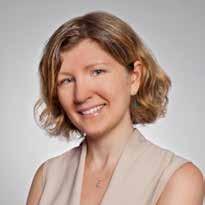
KATE SAENKO
Co-Director, Artificial Intelligence Research (AIR) Initiative

Director, AI and Education Initiative

Co-Director, Artificial Intelligence Research (AIR) Initiative
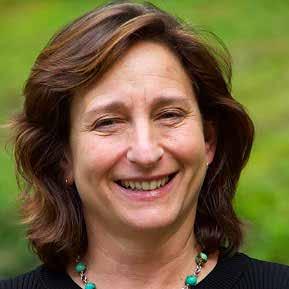

Executive Director, Boston Women’s Workforce Council (BWWC)
Director, Center for Computational Science

Director, Center for Information & Systems Engineering (CISE)

Co-Director, Red Hat Collaboratory

Co-Director, Center for Reliable Information Systems & Cyber Security (RISCS)

Co-Director, Red Hat Collaboratory Director, MOC Alliance

Co-Director, Center for Reliable Information Systems & Cyber Security (RISCS)

Director, Software & Application Innovation Lab (SAIL)
Members of the Institute’s Steering Committee are appointed by the Office of Research to assist the Director with overall strategic planning and management of the Institute’s operations. Members assist in reviewing ongoing activities, identifying and evaluating opportunities for investment of resources, developing proposals for new programs or initiatives, communicating the Institute’s vision, and promoting its goals to the constituents they represent.

Bill Adams
Professor, Pediatrician, BMC, Director, BU-CTSI


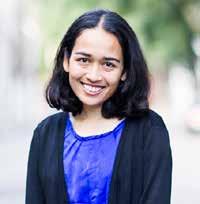
Professor, Anatomy, Neurobiology, & Edpidemiology, CAMED
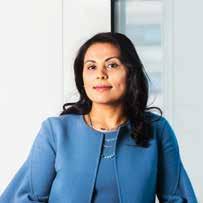
Professor, Mathematics and Statistics, CAS

Professor, Computer Science, CAS, Faculty of Computing & Data Sciences
Associate Professor, CAMED, Founding Director, CEID
Executive Director, Boston Women’s Workforce Council



Co-Director, Red Hat Collaboratory

David Coker
Professor, Chemistry, CAS, Faculty of Computing & Data Sciences

Professor, Earth and Environment, CAS
Professor, Computer Science, CAS, Faculty of Computing & Data Sciences
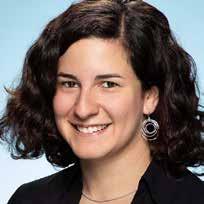
Ayse Coskun
Professor, ECE, SE, ENG, Director, CISE
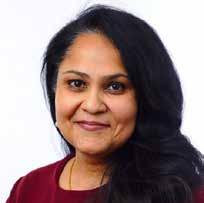
Professor, Speech, Language, and Hearing Sciences, SAR, Faculty of Computing & Data Sciences
Assistant Professor, Wheelock, Deaf Studies
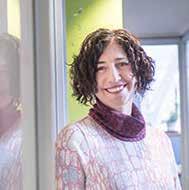
Ziba Cranmer Director, BU SPARK!
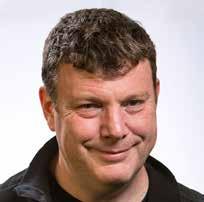
Professor, Electrical & Computer Engineering, ENG

Loretta Lees
Professor, CAS, Sociology; Director of the Initiative on Cities
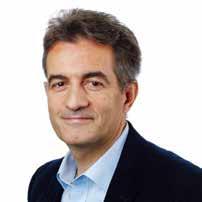
Ioannis (Yannis) Paschalidis
Distinguished Professor, ENG, ECE, BME, SE, Faculty of Computing & Data Sciences


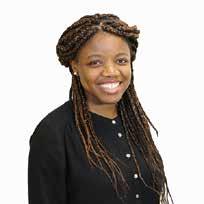
Elaine Nsoesie
Vice President, Information Services & Technology
Professor, Political Science, CAS
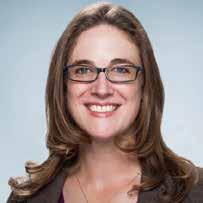
Emily Ryan
Associate Professor, ME, MSE, ENG, Faculty of Computing & Data Sciences

Cara Stepp
Professor, SLHS, Sargent College; Director, Sensorimotor Rehabilitation Engineering Lab
Associate Professor, Global Health, SPH
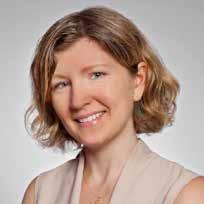
Kate Saenko
Professor, Computer Science, CAS, Faculty of Computing & Data Sciences Science, CAS
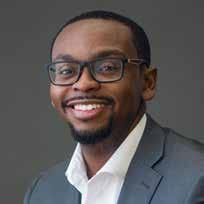
William Tomlinson
Director, SAIL



Associate Professor, Faculty of Computing & Data Sciences
Professor, Biostatistics, SPH
Professor, Philosophy, Theology, and Ethics, STH, Faculty of Computing & Data Sciences
Institute Advisory Board members are appointed by the Director in consultation with the Office of Research for two-year terms to provide feedback and strategic advice to the Director related to the overall mission of the Institute, its positioning within the university, its relationship to various academic units and programs, and its engagements with external organizations. The board reflects a diversity of leadership experiences, spanning academia, industry, government, non‐profits, philanthropy, and alumni.

Munther Dahleh
Professor, Electrical Engineering and Computer Science (EECS), MIT

Cathy Elizabeth Minehan
Co-chair, Boston Women’s Workforce; Director, Bright Horizons Family Solutions; Trustee, MITRE Corporation and Brookings Institution

Carolyn A. Kirk
Executive Director of the Massachusetts Technology Collaborative

Professor, Electrical Engineering and Applied Mathematics, Harvard University

Institute Advisory Board members are appointed by the Director in consultation with the Office of Research for one-year terms to provide feedback and strategic advice to the Director related the Institute’s pursuit of cutting-edge research opportunities and emerging market trends within industry partners. They guide the Institute’s investments in seeding and initiating new research programs at BU and in supporting the Institute’s various activities and programs that are meant to nurture the BU computing community, broadly conceived. Membership represents senior leadership from a variety of businesses including healthcare, venture capital, cybersecurity, AI, amongst others.
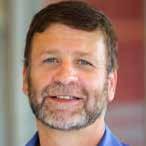

President and CEO, Red Hat, Inc., Boston

Rania Khalaf
Chief Information and Data Officer, Inari Paul Cormier
IBM Fellow, Director of HCLS Research, Global Science Leader, AI for Healthcare at IBM

Aneesh Kulkarni
Former Chief Technology Officer, Datavant

Lefebvre
Executive Vice President, Chief Technology & Operations Officer, Travelers

Frank Nielsen
Managing Director Quantitative Research at Strategic Advisers, a Fidelity

Erik
Larsen
Senior Vice President, Clinical Development & Customer Success, Sonde Health
The Hariri Institute has assembled a team of talented and dedicated professionals to help researchers make connections, identify additional support resources, and lift the burden of administrative support, so that more research is accomplished with far fewer barriers.
The Institute’s administrative staff provide program and project management, grant administration, event planning, communications support, and more.
Hariri Institute
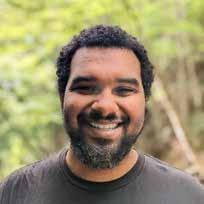
Stephen Brown
Executive Director, Hariri Institute

Daniela Demaestri
Financial Manager, Hariri Institute

Katherine D’Angelo
Assistant Director, Programs & Events, Hariri Institute

Kristen Dionne
Senior Administrative Assistant, Hariri Institute

Emily Johnson
Associate Director, Research Administration, Hariri Institute
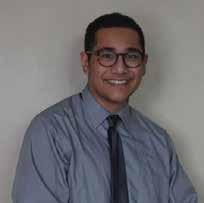
Kenneth Rudolph
Marketing Communications Specialist, Hariri Institute

Kardoose-Michelini Grants Manager, Hariri Institute

Maureen Stanton Assistant Director, Marketing & Communications, Hariri Institute
MOC Alliance

Nancy Clinton Managing Director, MOC Alliance

Tara Moran Senior Administrative Coordinator, MOC Alliance
Boston Womens’ Workforce Council (BWWC)
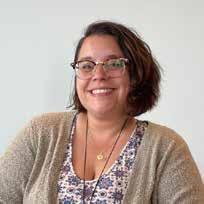
Jennifer McDonough
Administrative Manager, Boston Women’s Workforce Council
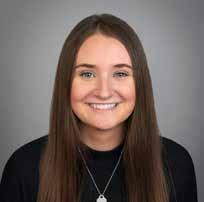
Marketing and Events Manager, Boston Women’s Workforce Council
Center for Information & Systems Engineering (CISE)

Christina Polyzos Associate Director, CISE
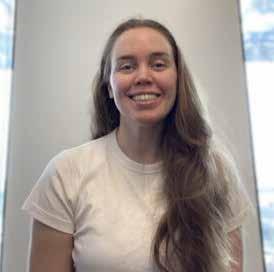
Hannah Dallman Grants Administrator, CISE

Lea Sabra Marketing Communications Specialist, CISE
SAIL consists of a small team of professional software architects and developers who are assigned to work directly with faculty members (and their research teams) on specific software and application development projects. Additionally, these professional software engineers supervise a team of BU student interns through the SAIL Internship Program. Professional SAIL staff act as the clearing house for software developed by students, thus allowing the research community to leverage the untapped software development capacity of undergraduate and graduate students at BU, while ensuring project continuity.
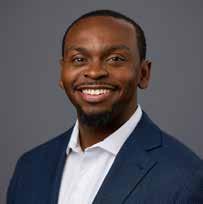



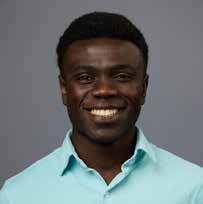


Zoe Chitty
Software Engineer, SAIL

Shashank Karthikeyan
Software Engineer, SAIL

Wenhan Wang
Software Engineer, SAIL

Karina Hickman
Technical Project Associate, SAIL

Asad Malik
Software Engineer, SAIL

Software Engineer, SAIL

Arezoo Sadeghi
Senior Software Engineer, SAIL

Michael Daitzman Director of Engineering and Product

Senior Software Engineer

Technical Project Manager

Lars Kellogg-Stedman
Senior Principal Software Developer



Postdoctoral Research Associates have recently earned a PhD from Boston University or other institutions. They are currently collaborating with faculty researchers and other PhD students on projects at the Hariri Institute.
Venkitesh Ayyar, Postdoctoral Associate (Center for Computational Science), Boston University
Dina Bashkirova, Postdoctoral Associate (Image and Video Computing Group), Boston University
Seyed Mohammad Hadi Daneshmand, Postdoctoral Associate (Foundation of Data Science Institute), Boston University, and MIT
Han Dong, Postdoctoral Associate (Red Hat Research), Boston University
Cody Freitag, Postdoctoral Associate (Khoury College Distinguished Postdoctoral Fellowship), Boston University and Northeastern University
Alexander Hino, Postdoctoral Associate, Boston University
Nobuyuki Matsumoto, Postdoctoral Associate, Boston University
Marcel Neunhoeffer, Postdoctoral Associate (Center for Reliable Information Systems and Cyber Security), Boston University and Ludwig Maximilian University of Munich
Thomas Unger, Postdoctoral Associate, Boston University
Visiting Scholars are scholars from other institutions spending time at the Hariri Institute in collaborative research endeavors.
Maryam Aliakbarpour, Visiting Researcher (Center for Reliable Information Systems and Cyber Security), Michael B. Yuen and Sandra A. Tsai Assistant Professor, Rice University
Seyed Mohammad Hadi Daneshmand, Visiting Researcher (Foundation of Data Science Institute), Boston University, and MIT
Heidi Dempsey, Visiting Researcher (Red Hat Collaboratory), Research and Innovation Director, Red Hat
Peter Desnoyers, Visiting Researcher (MOC Alliance), Associate Professor, Khoury College of Computer Sciences, Northeastern University
Lars Kellodd-Stedman, Visiting Researcher (MOC Alliance), Senior Principal Software Engineer, Red Hat
Abhishek Pratap, Visiting Researcher (Hariri Institute), Head, Data Innovation & Intuition Study Biogen Digital Health, Biogen, Boston
Larry Rudolph, Visiting Researcher (MOC Alliance), Principle Research Scientist, Computer Science and Artificial Intelligence Laboratory, MIT
Ata Turk, Visiting Researcher (MOC Alliance), Research Scientist, Red Hat
Larry Woodman, Visiting Researcher (MOC Alliance), Senior Distinguished Engineer, Red Hat
Kayhan Batmanghelich (2023), Assistant Professor, ENG, Electrical & Computer Engineering
Dillon Brout (2024), Assistant Professor, CAS, Astronomy
Jacob Brown (2024), Assistant Professor, CAS, Political Science
James Chapman (2024), Assistant Professor, ENG, Mechanical Engineering
Huimin Cheng (2024), Assistant Professor, SPH, Biostatistics
Kimberly Crespo (2024), Assistant Professor, Sargent, Department of Speech, Language, & Hearing Sciences
Brian DePasquale (2024), Assistant Professor, ENG, Biomedical Engineering
Ana Fiszbein (2021), Assistant Professor, CAS, Biology
Masao Fukui (2024), Assistant Professor, CAS, Economics
Scott Hirst (2021), Associate Professor, LAW, Law
Jonathan Jay (2022), Assistant Professor, SPH, Community Health Science
Jihye Jeon (2021), Assistant Professor, CAS, Economics
Garrett Johnson (2021), Assistant Professor, Questrom, Marketing
Laura Lewis (2021), Assistant Professor, ENG, Biomedical Engineering
Tesary Lin (2022), Assistant Professor, Questrom, Marketing
Yuhei Miyauchi (2022), Assistant Professor, CAS, Economics
Shariq Mohammed (2022), Assistant Professor, SPH, Biostatistics
Eshed Ohn-Bar (2023), Assistant Professor, ENG, Electrical & Computer Engineering
Charlene Ong (2024), Assistant Professor, Chobanian & Avedisian SOM, Neurology
Prasad Patil (2021), Assistant Professor, SPH, Biostatistics
Bryan Plummer (2023), Assistant Professor, CAS, Computer Science
Max Reppen (2022), Assistant Professor, Questrom, Finance
Xiaozhou Ruan (2023), Assistant Professor, CAS, Earth & Environment
Chris Chao Su (2023), Assistant Professor, COM, Emerging Media Studies
Preeti Sunderaraman (2023), Assistant Professor, Chobanian & Avedisian SOM, Neurology
Adriana Tomic (2023), Assistant Professor, ENG, Biomedical Engineering and Virology, Immunology & Microbiology
Jinglong Zhao (2022), Assistant Professor, Questrom, Operations & Technology Mgt
Fatih Acun (2024), PhD Student, ENG, Electrical & Computer Engineering
Afra Feyza Akyurek (2021), PhD Student, CAS, Computer Science
Courtney Aul (2023), PhD Student, CAS, Psychological and Brain Sciences
Sarah Bald (2024), PhD Student, CDS, Bioinformatics
Taylor Beauvais (2024), PhD Student, CAS, Sociology
Daria Dragicevic (2022), PhD Student, Sargent, Speech, Language & Hearing Sciences
Anqi Guo (2022), PhD Student, ENG, Electrical & Computer Engineering
Munib Hasnain (2021), PhD Student, ENG, Biomedical Engineering
Xinyi Hu (2024), PhD, Student, CDS, Computing & Data Sciences
Hiba Kobeissi (2022), PhD Student, ENG, Mechanical Engineering
Masha Lazou (2024), PhD Student, ENG, Biomedical Engineering
Chen Ling (2021), PhD Student, ENG, C omputer Engineering
Devlin Moyer (2021), PhD Student, CDS, Bioinformatics
Chika Onubogu (2022), PhD Student, CAS, Astronomy
Margaret (Greta) Rauch (2023), PhD Student, CAS, History
Edward Ruiz (2023), PhD Student, Chobanian & Avedisian SOM, Medicine, Hematology/Oncology
Adam Samuels (2021), PhD Student, CAS, Astronomy
Ryan Senne (2024), PhD Student, Chobanian & Avedisian SOM, Neuroscience
Michael Silverstein (2022), PhD Student, C DS, Bioinformatics
Adrianna Spindle-Jackson (2021), PhD Student, SSW, Social Work
Jack Vincent (2023), PhD Student, ENG, Biomedical Engineering
Connor Wagaman (2023), PhD Student, CAS, Computer Science
Hao Wang (2021), PhD Student, ENG, Electrical & Computer Engineering
Jianing Wang (2021), PhD Student, CDS, Biostatistics
Olivia Wyatt (2022), PhD Student, Wheelock, Counseling Psychology & Applied Human Development
Lingyi Xu (2022), PhD Student, CDS, Computing & Data Sciences
Yixin (Amy) Zhang (2023), PhD Student, CAS, Biostatistics
Zeying Zhu (2023), PhD Student, ENG, Electrical & Computer Engineering
Rhoda Au, Professor, Anatomy & Neurobiology, Chobanian & Avedisian SOM
Lou Awad, Associate Professor, Physical Therapy, SAR
Margrit Betke, Professor, Associate Chair of the Faculty, Computer Science, CAS
David Boas, Distinguished Professor, Director of Neurophotonics Center, Biomedical Engineering, and Electrical & Computer Engineering, ENG
Andrew Budson, Professor, Neurology, Chobanian & Avedisian SOM
Theresa Ellis, Associate Professor, Physical Therapy, SAR
Mike Esterman, Associate Professor, Psychiatry, Chobanian & Avedisian SOM
Alice Cronin Golomb, Professor & Director, Psychological and Brain Sciences, CAS Prakash Ishwar, Professor, Electrical and Computer Engineering, ENG
Vijaya Kolachalama, Associate Professor, Computational Biomedicine, Chobanian & Avedisian SOM
Swathi Kiran, Professor, Neurorehabilitation, SAR
Janusz Konrad, Professor, Electrical & Computer Engineering, ENG
Shariq Mohammed, Assistant Professor, Biostatistics, SPH
Eshed Ohn-Bar, Assistant Professor, Electrical and Computer Engineering, ENG
Ioannis (Yannis) Paschalidis, Distinguished Professor, ENG, ECE, BME, SE; Director, Rafik B. Hariri Institute for Computing and Computational Science and Engineering
Bryan Plummer, Assistant Professor, Computer Science, CAS
Jose Rafael Romero, Associate Professor, Chobanian & Avedisian SOM, Neurology, Neurology, Chobanian & Avedisian SOM
Rob Reinhart, Associate Professor, Psychological and Brain Sciences, CAS
David Somers, Professor, Psychological and Brain Sciences, CAS
Cara Stepp, Professor & Director, Speech, Language and Hearing Sciences, STEPP LAB, SAR
Chantal Stern, Professor & Chair, Psychological and Brain Sciences, Cognitive Neuroimaging Laboratory, CAS
Yorghos Tripodis, Professor, Biostatistics, SPH
Archana Venkataraman, Associate Professor, Electrical and Computer Engineering, ENG
Derry Wijaya, Assistant Professor, Computer Science, CAS
Meryem Yucel, Research Associate Professor, Biomedical Engineering, ENG
Jennifer Bhatnagar, Associate Professor, Biology, CAS
Marianna Felici, Research Scientist, Center for Space Physics, CAS
Prakash Ishwar, Professor, Electrical & Computer Engineering, ENG
Jeffrey Marlow, Assistant Professor, Biology, CAS
Majd Mayyasi, Senior Research Scientist, Center for Space Physics
Pankaj Metha, Professor, Physics, CAS
Daniel Segrè, Professor, Biology, CAS
Joshua Semeter, Professor, Electrical and Computer Engineering, ENG
Paul Withers, Professor, Department Chair, Astronomy, CAS
Jonathan Buonocore, Assistant Professor, Environmental Health, SPH
Stephanie A Ettinger de Cuba, Research Assistant Professor, Health, Law, Policy, & Management, SPH
Patricia Fabian, Associate Professor, Environmental Health, SPH
Mark Friedl, Professor, Earth & Environment, CAS; Director, Center for Remote Sensing
Emma Gause, Research Scientist, Environmental Health, SPH
Lucy Hutyra, Distinguished Professor, Earth & Environment, CAS
Marcia Jimenez, Assistant Professor, Epidemiology, SPH
Muskaan Khemani, Research Assistant, Environmental Health, SPH
Patrick Kinney, Professor, Environmental Health, SPH
Kevin Lane, Assistant Professor, Environmental Health, SPH
Chad Milando, Research Scientist, Environmental Health, SPH
Amruta Nori-Sarma, Assistant Professor, Environmental Health, SPH
Madeleine Scammel, Associate Professor, Environmental Health, SPH
Ian Smith, PhD, Earth & Environment, CAS
Keith Spangler, Research Scientist, Environmental Health, SPH
Ian Sue Wing, Professor, Earth & Environment, CAS
Koen Tieskens, Postdoctoral Associate, Environmental Health, SPH
Gregory Wellenius, Professor, Environmental Health, SPH
Lou Awad, Associate Professor, Physical Therapy, SAR
Calin Belta, Professor & Director, Mechanical Engineering, BU Robotics Lab, ENG
Alice Cronin-Golomb, Professor & Director, Psychological and Brain Sciences, CAS
Terry Ellis, Associate Professor, Physical Therapy, SAR
Elliot Lee Saltzman, Associate Professor, Physical Therapy, SAR
Wenchao Li, Assistant Professor, Electrical and Computer Engineering, ENG
Eshed Ohn-Bar, Assistant Professor, Electrical and Computer Engineering, ENG
Alexander Olshevsky, Assistant Professor, Electrical & Computer Engineering, ENG
Alyssa Pierson, Assistant Professor, Mechanical Engineering, ENG
Andrew Sabelhaus, Assistant Professor, Mechanical Engineering, ENG
Manos Athanassoulis (CAS, Computer Science), Associate Editor, PVLDB Vol 18, Associate Editor, ACM SIGMOD Record
Lou Awad (Sargent), Associate Editor, IEEE Open Journal of Engineering, Medicine and Biology; Associate Editor for the Journal of Neuroengineering and Rehabilitation; Standing Member of the Musculoskeletal Rehabilitation Sciences NIH Study Section
Naomi Caselli (Wheelock), Editorial Board, Journal of Deaf Studies and Deaf Education and Applied Psycholinguistics
Christos Cassandras (ENG), Chair, IFAC Fellow Section Committee (2020 - 2023)
Ran Canetti (CAS, Computer Science), Associate Editor, Journal of Cryptology and Information and Computation
Swathi Kiran (Sargent), Editor, AJSLP Clinical Aphasiology Conference Special Issue
Janusz Konrad (ENG), Deputy Editor-in-Chief, IEEE Transactions on Image Processing
J. Gregory McDaniel (ENG), Associate Editor, JASA Express Letters
Priscilla Slanetz (Chobanian & Avedisian SOM), Chair of Commission, Publications and Lifelong Learning (CoPLL) for the American College of Radiology, Member on the Board of Chancellors, American College of Radiology, Board of Radiology Advocacy Network
Laura White (SPH), Oversight Committee Member, New England Statistical Society Council (NESS)
Rachel Abercrombie, Research Professor, College of Arts & Sciences, Earth & Environment
William Adams, Professor, Chobanian & Avedisian School of Medicine, Department of Pediatrics; Director, Clinical & Translational Science Institute; Director, Child Health Informatics
Karen Allen, Professor & Department Chair, College of Arts & Sciences, Department of Chemistry, College of Engineering, Division of Materials Sciences Engineering
Marshall Van Alstyne, Professor, Questrom School of Business, Department of Management
Michael Alosco, Associate Professor, Chobanian & Avedisian School of Medicine, Department of Medicine, Neurology
Michelle Amazeen, Associate Professor, College of Communications, Department of Mass Communication, Advertising, & Public Relations; Director, Communication Research Center
Stacy Anderson, Assistant Professor, Chobanian & Avedisian School of Medicine, Department of Medicine
Ting Fang Alvin Ang, Research Assistant Professor, Chobanian & Avedisian School of Medicine, Department of Anatomy & Neurobiology
Jonathan Appavoo, Associate Professor, College of Arts & Sciences, Department of Computer Science
Manos Athanassoulis, Assistant Professor, College of Arts & Sciences, Department of Computer Science; Director, DiSC Lab
Rhoda Au, Professor, Chobanian & Avedisian School of Medicine, Department of Anatomy, Epidemiology, & Neurobiology
Lou Awad, Associate Professor, Sargent College of Health & Rehabilitation Sciences, Department of Physical Therapy, College of Engineering, Department of Mechanical Engineering
Stephan Anderson, Professor, Chobanian & Avedisian School of Medicine, Department of Medicine, Radiology
Sean B. Andersson, Professor, College of Engineering, Department of Mechanical Engineering, Division of Systems Engineering; Department Chair, Department of Mechanical Engineering
Andrew Bacher-Hicks, Assistant Professor, Wheelock College of Education & Human Development, Department of Educational Leadership & Policy Studies
John Baillieul, Distinguished Professor, College of Engineering, Departments of Mechanical Engineering, Electrical & Computer Engineering, Division of Systems Engineering
Jennifer Balakrishnan, Clare Boothe Luce Professor, College of Arts & Sciences, Department of Mathematics & Statistics
Sarah Bargal, Research Assistant Professor, College of Arts & Sciences, Department of Computer Science
Juan Fuxman Bass, Associate Professor, College of Arts & Sciences, Department of Biology
Soumendra Basu, Professor, College of Engineering, Department of Mechanical Engineering, Division of Materials Science & Engineering; Associate Division Head of Materials Science & Engineering,BU
Kayhan Batmanghelich, Assistant Professor, College of Engineering, Department of Electrical & Computer Engineering
Marianne Baxter, Professor, College of Arts & Sciences, Department of Economics
Orkun Baycik, Clinical Associate Professor, Questrom School of Business, Department of Markets, Policy, & Law
Samuel Bazzi, Assistant Professor, College of Arts & Sciences, Department of Economics; Core Faculty, HCI, Global Development Policy Center
Jennifer Beane, Associate Professor, Chobanian & Avedisian School of Medicine, Department of Medicine, College of Engineering, Department of Mechanical Engineering
Alexander Becker, Assistant Professor, College of Engineering, Department of Mechanical Engineering, Metropolitan College, Department of Finance
Aaron Beeler, Associate Professor, College of Arts & Sciences, Department of Chemistry
Enrico Bellotti, Professor, College of Engineering, Department of Electrical & Computer Engineering, Division of Material Sciences & Engineering
Calin Belta, Professor & Director, College of Engineering, Departments of Mechanical Engineering, Electrical & Computer Engineering, Division of Systems Engineering
Janine Bempechat, Clinical Professor, Wheelock College of Education & Human Development, Department of Applied Human Development
Gerdus Benade, Assistant Professor, Questrom School of Business, Department of Information Systems
Gregory Benoit, Lecturer, Wheelock College of Education & Human Development, Department of Mathematics Education; Assistant Director, Earl Center for Learning & Innovation
Gary Benson, Associate Professor, College of Arts & Sciences, Departments of Biology, Computer Science
Kimberly Bertrand, Associate Professor, Chobanian & Avedisian School of Medicine, Department of Preventive Medicine
Azer Bestavros, William Fairfield Warren Distinguished Professorship; Professor, Department of Computer Science; Associate Provost, Faculty of Computing & Data Sciences
Margrit Betke, Professor, College of Arts & Sciences, Department of Computer Science; Associate Chair of the Faculty Department of Computer Science; Co-Director, Artificial Intelligence Research
Nahid Bhadelia, Founding Director Center on Emerging Infectious Diseases; Infectious Diseases Physician; Associate Professor, Chobanian & Avedisian School of Medicine
Jennifer Bhatnagar, Associate Professor, College of Arts & Sciences, Department of Biology
David Bishop, Professor, College of Engineering, Departments of Electrical & Computer Engineering, Mechanical Engineering, Biomedical Engineering, College of Arts & Sciences, Department of Physics; Head, Division of Materials Science & Engineering; Director, CELL-MET Engineering Research Center
Peter Blake, Associate Professor, College of Arts & Sciences, Department of Psychological & Brain Sciences
David Boas, Distinguished Professor, College of Engineering, Departments of Mechanical Engineering, Electrical & Computer Engineering; Director, Neurophotonics Center
Taylor Boas, Professor, College of Arts & Sciences, Department of Political Science
William Boley, Assistant Professor, College of Engineering, Departments of Mechanical Engineering, Division of Materials Science & Engineering
Collin Bolles, Software Engineer, Software & Application Innovation Lab
Jacob Bor, Associate Professor, School of Public Health, Department of Global Health
Belinda Borrelli, Professor, School of Dental Medicine, Department of Health Policy & Health Services Research; Director, Center for Behavioral Sciences Research
Tereasa Brainerd, Professor, College of Arts & Sciences, Department of Astronomy
Ksenia Bravaya, Associate Professor, College of Arts & Sciences, Department of Chemistry
Hugh Brock, Co-Director, Red Hat Collaboratory
Dillon Brout, Assistant Professor, College of Arts & Sciences, Department of Astronomy
Richard Brower, Professor, College of Engineering, Department of Electrical & Computer Engineering
Jacob Brown, Assistant Professor, College of Arts & Sciences, Department of Political Science
Keith Brown, Associate Professor, College of Engineering, Department of Mechanical Engineering, Division of Materials Science & Engineering
Timothy Brown, Professor, College of Arts & Sciences, Department of Psychological & Brain Sciences; Director of Research & Research Administration, Center for Anxiety & Related Disorders
Andrew Budson, Professor, Chobanian & Avedisian School of Medicine, Department of Neurology; Associate Director and Outreach, Recruitment, and Engagement Core Leader, Boston University Alzheimer’s Disease Research Center; Lecturer, Department of Neurology, Harvard Medical School; Chief of Cognitive & Behavioral Neurology, Associate Chief of Staff for Education and Director, Translational Cognitive Neuroscience, Veterans Affairs Boston Healthcare System;
Mark Bun, Assistant Professor, College of Arts & Sciences, Department of Computer Science
Jonathan Buonocore, Assistant Professor, School of Public Health, Department of Environmental Health
John Byers, Professor, College of Arts & Sciences, Department of Computer Science; Senior Associate Dean of the Faculty Division of Mathematical & Computational Sciences
Thomas Byrne, Associate Professor & Charles River Campus Advisor, School of Social Work, Department of Social Welfare Policy
Michael Caramanis, Professor, College of Engineering, Department of Mechanical Engineering, Division of Systems Engineering
Catherine Caldwell-Harris, Associate Professor, College of Arts & Sciences, Department of Psychology
David Campbell, Professor, College of Arts & Sciences, Department of Physics, College of Engineering, Department of Electrical & Computer Engineering, Division of Materials Science & Engineering
Joshua Campbell, Assistant Professor, Chobanian & Avedisian School of Medicine, Department of Computational Biomedicine
Ran Canetti, Professor, College of Arts & Sciences, Department of Computer Science; Director, Center for Reliable Information System and Cyber Security
Paul Carlile, Professor, Questrom School of Business, Department of Information Systems; Senior Associate Dean, Online Learning
Luis Carvalho, Associate Professor, College of Arts & Sciences, Department of Mathematics & Statistics; Director, MS in Statistical Practice
Naomi Caselli, Assistant Professor, Wheelock College of Education & Human Development Department of Deaf Studies; Director, AI & Education Initiative
Christos Cassandras, Distinguished Professor, College of Engineering, Department of Electrical & Computer Engineering; Head, Division of Systems Engineering
David Castañón, Professor, College of Engineering, Department of Electrical & Computer Engineering, Division of Systems Engineering
Claudio Chamon, Professor, College of Arts & Sciences, Department of Physics, College of Engineering, Division of Materials Science & Engineering
Anushya Chandran, Associate Professor, College of Arts & Sciences, Department of Physics
James Chapman, Assistant Professor, College of Engineering, Department of Mechanical Engineering
Tanima Chatterjee, Clinical Assistant Professor of Computing & Data Sciences; Director of Undergraduate Studies, Faculty of Computing and Data Science
Christine Cheng, Adjunct Assistant Professor, College of Arts & Sciences, Department of Biology
Debbie Cheng, Professor, School of Public Health, Department of Biostatistics
Olivia Chi, Assistant Professor, Wheelock College of Education & Human Development, Educational Leadership & Policy Studies
Peter Chin, Adjunct Professor, College of Arts & Sciences, Department of Computer Science
Vipul Chitalia, Associate Professor, Chobanian & Avedisian School of Medicine, Department of Medicine
Lou Chitkushev, Senior Associate Dean for Academic Affairs, Associate Professor, Metropolitan College, Department of Computer Science; Director, Health Informatics & Health Sciences
Brian Cleary, Assistant Professor, College of Engineering, Department of Biomedical Engineering
David Coker, Professor, College of Arts & Sciences, Department of Chemistry, College of Engineering, Division of Materials Science & Engineering
John Connor, Associate Professor, Chobanian & Avedisian School of Medicine, Department of Virology, Immunology, & Microbiology
Ronald Corley, Emeritus Professor, Chobanian & Avedisian School of Medicine, Department of Virology, Immunology, & Microbiology
Canan Gunes Corlu, Associate Professor, Metropolitan College, Department of Administrative Sciences; Coordinator, Supply Chain Management; Codirector, Decision Sciences Research Laboratory BU
Ayşe Kivilcim Coşkun, Interim Associate Dean for Research & Faculty Development, Professor, College of Engineering, Department of Electrical & Computer Engineering; Director, Center for Information & Systems Engineering
Ziba Cranmer, Director, SPARK!
Felicity Crawford, Clinical Associate Professor, Wheelock College of Education & Human Development, Department of Special Education
Kimberly Crespo, Assistant Professor, Wheelock College of Education & Human Development, Department of Speech, Language, and Hearing Sciences
Nicholas Crossland, Assistant Professor, Chobanian & Avedisian School of Medicine Department of Pathology & Laboratory Medicine
Mark Crovella, Professor, College of Arts & Sciences, Department of Computer Science; Professor & Chair of Academic Affairs, Faculty of Computing & Data Sciences
Qiang Cui, Professor, College of Arts & Sciences, Department of Chemistry
Ashok Cutkosky, Assistant Professor, College of Engineering, Department of Electrical & Computer Engineering, Division of Systems Engineering
Julie Dahlstrom, Clinical Associate Professor, School of Law, Department of Law; Associate Dean, Experiential Education
Nermeen Dashoush, Clinical Assistant Professor, Wheelock College of Education & Human Development, Department of Early Childhood Education
Joanna Davidson, Associate Professor, College of Arts & Sciences, Department of Anthropology; Associate Director, Kilachand Honors College
Gerald Denis, Shipley Prostate Cancer Research Professor, Chobanian & Avedisian School of Medicine, Department of Medicine
Douglas Densmore, Professor, College of Engineering, Departments of Electrical & Computer Engineering, Biomedical Engineering, Division of Materials Science & Engineering
Peter Desnoyers, Associate Professor, Computer Science, Northeastern University
Anita Destefano, Professor, School of Public Health, Department of Biostatistics
Jerome Detemple, Morton H. And Charlotte Friedman Professor In Finance, Questrom School of Business, Department of Finance
Anand Devaiah, Professor, Chobanian & Avedisian School of Medicine, Department of Otolaryngology
Leslie Dietiker, Associate Professor, Wheelock College of Education & Human Development Department of Mathematics Education; Associate Dean, Research
Michael Dietze, Professor, College of Arts & Sciences, Department of Earth & Environment
Christina Dobbs, Associate Professor, Wheelock College of Education & Human Development Department of English Education, Program Director
Linda Doerrer, Professor, College of Arts & Sciences, Department of Chemistry, College of Engineering, Division of Materials Science & Engineering; Associate Director, Kilachand Honors College
Stacey Dogan, Professor, School of Law, Department of Law
Chuanfei Dong, Assistant Professor, College of Arts & Sciences, Department of Astronomy
Iddo Drori, Associate Professor of the Practice, College of Arts & Sciences, Department of Computer Science; Director of Masters Admissions, Masters in Artificial Intelligence
Chuanhua Duan, Associate Professor, College of Engineering, Mechanical Engineering
Mary Dunlop, Associate Professor, College of Engineering, Department of Biomedical Engineering; Graduate Chair, Department of Biomedical Engineering
Tugba Efendigil, Clinical Associate Professor, Questrom School of Business, Department of Operations and Technology Management
Manuel Egele, Associate Professor, College of Engineering, Department of Electrical & Computer Engineering
Katherine Einstein, Associate Professor, College of Arts & Sciences, Department of Political Science
Theresa Ellis, Professor & Chair, Sargent College of Health & Rehabilitation Sciences, Department of Physical Therapy; Director, Center for Neurorehabilitation
Andrew Emili, Adjunct Professor, College of Arts & Sciences, Department of Biology & Department of Biochemistry
Alina Ene, Associate Professor & Associate Chair of Academics, College of Arts & Sciences, Department of Computer Science
Dora Erdos, Senior Lecturer & Director of Undergraduate Studies, College of Arts & Sciences, Department of Computer Science
Catherine Espaillat, Director of Undergraduate Studies, Associate Professor, College of Arts & Sciences, Department of Astronomy; Director, Institute for Astrophysical Research BU
Mike Esterman, Associate Professor, Chobanian & Avedisian School of Medicine, Department of Psychiatry
Stephanie Ettinger de Cuba, Research Assistant Professor, School of Public Health, Department of Health, Law, Policy, & Management
M. Patricia Fabian, Associate Professor, School of Public Health, Department of Environmental Health
Sergio Fagherazzi, Professor, College of Arts & Sciences, Earth & Environment
Lindsay Farrer, Distinguished Professor, Chobanian & Avedisian School of Medicine, Department of Medicine
Chad Farris, Assistant Professor, Chobanian & Avedisian School of Medicine, Department of Medicine, Radiology
James Feigenbaum, Assistant Professor, College of Arts & Sciences, Department of Economics
Marianna Felici, Research Scientist, College of Arts & Sciences, Center for Space Physics
Hank Fien, Nancy H. Roberts Professor of Educational Innovation, Wheelock College of Education & Human Development, Department of Teaching & Learning; Director, Wheelock College of Education & Human Development Institute for the Science of Education; Director, National Center on Improving Literacy
Ana Fiszbein, Assistant Professor, College of Arts & Sciences, Department of Biology
Martin Fiszbein, Assistant Professor, College of Arts & Sciences, Department of Economics
Andrew Fitzpatrick, Associate Professor, College of Arts & Sciences, Department of Physics
Juliet Floyd, Borden Parker Bowne Professor, College of Arts & Sciences, Department of Philosophy; Director, Center for the Humanities
Elena Forzani, Assistant Professor, Wheelock College of Education & Human Development, Department of Literacy Education
Andrey Fradkin, Dean’s Research Scholar, Assistant Professor, Questrom School of Business, Department of Marketing
Greg Frasco, Associate Director of Engineering, Software & Application Innovation Lab
Sarah Frederick, Director of Undergraduate Studies, Associate Professor, College of Arts & Sciences, Department of World Languages & Literatures
Mark Friedl, William Goodwin Aurelio Professor of Mathematics & Statistics, Professor, College of Arts & Sciences, (Earth & Environment; Director, Center for Remote Sensing
Masao Fukui, Assistant Professor, College of Arts & Sciences, Department of Economics
Daniel Fulford, Associate Professor, Sargent College of Health & Rehabilitation Sciences, Department of Occupational Therapy
Marco Gaboardi, Director of Graduate Studies, Associate Professor, College of Arts & Sciences, Department of Computer Science
Peter Gacs, Professor Emeritus, College of Arts & Sciences, Department of Computer Science
Kevin Gallagher, Professor, Frederick S. Pardee School of Global Studies, Department of Global Development Policy; Director, Global Development Policy Center
Emma Gause, Research Scientist, School of Public Health, Department of Environmental Health
Michael Gevelber, Associate Professor, College of Engineering, Department of Mechanical Engineering, Divisions of Materials Science & Engineering, Systems Engineering
Amir Emad Ghassami, Assistant Professor, College of Arts & Sciences, Mathematics & Statistics
Roscoe Giles, Professor, College of Engineering, Department of Electrical & Computer Engineering
Simone Gill, Associate Professor, Sargent College of Health & Rehabilitation Sciences, Department of Occupational Therapy
Kira Goldner, Assistant Professor, College of Arts & Sciences, Department of Computer Science, Faculty of Computing & Data Sciences
Sharon Goldberg, Associate Professor, College of Arts & Sciences, Department of Computer Science
Alice Cronin-Golomb, Professor, College of Arts & Sciences, Department of Psychological & Brain Sciences; Director, Vision & Cognition Laboratory
Joshua Goodman, Associate Professor, Wheelock College of Education & Human Development, Department of Educational Leadership & Policy Studies; Program Director of Doctoral Studies
Sucharita Gopal, Professor, College of Arts & Sciences, Department of Earth & Environment
Vivek Goyal, Professor & Associate Chair of Doctoral Programs, College of Engineering, Department of Electrical & Computer Engineering
Sheryl Grace, Associate Professor, College of Engineering, Department of Mechanical Engineering
Jennifer Green, Professor, Wheelock College of Education & Human Development, Department of Special Education
Jonathan Greenacre, Assistant Professor, Frederick S. Pardee School of Global Studies, Department of Global Development Policy
Stephen Grossberg, Wang Professor of Cognitive and Neural Systems; Professor Emeritus, College of Engineering, Departments of Mathematics & Statistics, Psychological & Brain Sciences
Bin Gu, Everett W. Lord Distinguished Faculty Scholar; Professor & Department Chair, Questrom School of Business Department of Information Systems
Adam Guren, Associate Professor, College of Arts & Sciences, Department of Economics
Olga Gursky, Professor, Chobanian & Avedisian School of Medicine, Department of Pharmacology, Physiology, & Biophysics
Leyla Han, Assistant Professor, Questrom School of Business, Department of Finance
Joel Henderson, Associate Professor, Chobanian & Avedisian School of Medicine, Department of Pathology & Laboratory Medicine
Martin Herbordt, Professor, College of Engineering, Department of Electrical & Computer Engineering
Scott Hirst, Associate Professor, School of Law, Department of Law
Anna Hohler, Associate Professor, Chobanian & Avedisian School of Medicine, Department of Neurology
Douglas Holmes, Associate Professor, College of Engineering, Departments of Mechanical Engineering, Division of Materials Science & Engineering
Steve Homer, Professor, College of Arts & Sciences, Department of Computer Science
Traci Hong, Associate Professor, College of Communication, Department of Mass Communication, Advertising, & Public Relations
Marc Howard, Professor, College of Arts & Sciences, Psychology & Brain Sciences; Program Director, Brain, Behavior, and Cognition; Director, Theoretical Cognitive Neuroscience Lab
Dean Howarth, Postdoctoral Associate, CCS
Jonathan Huggins, Assistant Professor, College of Arts & Sciences, Mathematics & Statistics
Lucy Hutyra, Distinguished Professor, College of Arts & Sciences, Earth & Environment
Daryl Ireland, Research Associate Professor, School of Theology, Department of Mission; Associate Director, Center for Global Christianity & Mission
Samuel Isaacson, Professor, College of Arts & Sciences, Department of Mathematics & Statistics
Harunobu Ishii, Software Engineer, SAIL
Prakash Ishwar, Professor, College of Engineering, Department of Electrical & Computer Engineering, Division of Systems Engineering
Jonathan Jay, Assistant Professor, School of Public Health, Department of Community Health Science
Malika Jeffries-El, Associate Professor, College of Arts & Sciences, Department of Chemistry; Associate Dean, Graduate School of Arts & Sciences
Helen Jenkins, Associate Professor, School of Public Health, Department of Biostatistics
Jihye Jeon, Assistant Professor, College of Arts & Sciences, Department of Economics
Yi Ji, Assistant Professor, Chobanian & Avedisian School of Medicine, Department of Medicine
Marcia Jimenez, Assistant Professor, School of Public Health, Department of Epidemiology
Garrett Johnson, Assistant Professor, Questrom School of Business, Department of Marketing
Nathan Jones, Associate Professor, Wheelock College of Education & Human Development Department of Special Education
Svetlana Jorstad, Senior Research Scientist, Institute for Astrophysical Research
Ajay Joshi, Professor, College of Engineering, Department of Electrical & Computer Engineering
Suresh Kalathur, Assistant Professor, Metropolitan College, Department of Computer Science; Director, Analytics
Vasiliki Kalavri, Assistant Professor, College of Arts & Sciences, Department of Computer Science
Bindu Kalesan, Assistant Professor, Chobanian & Avedisian School of Medicine, Department of Medicine
Maria (Masha) Kamenetska, Assistant Professor, College of Arts & Sciences, Departments of Chemistry, Physics; Professor, College of Engineering, Division of Materials Science & Engineering
Vijay Kanabar, Associate Professor, Metropolitan College, Department of Computer Science and Administrative Sciences
Gabriel Kaptchuk, Research Assistant Professor, College of Arts & Sciences, Department of Computer Science
W. Clem Karl, Professor & Department Chair, College of Engineering, Department of Electrical & Computer Engineering
Mark Karpovsky, Professor Emeritus, College of Engineering, Department of Electrical and Computer Engineering
Mahesh Karra, Assistant Professor, Frederick S. Pardee School of Global Studies, Department of Global Development Policy
Simon Kasif, Professor, College of Engineering, Department of Biomedical Engineering
James Katz, Feld Professor, College of Communication, Department of Emerging Media Studies
Lewis Kazis, Professor, School of Public Health, Department of Health Policy & Management; Director, Center for the Assessment of Pharmaceutical Practices
Thomas Kepler, Emeritus Professor, Chobanian & Avedisian School of Medicine, Department of Virology, Immunology, & Microbiology
Gerald Keusch, Emeritus Professor, Chobanian & Avedisian School of Medicine, Department of Medicine
Thomas Keyes, Professor Emeritus, College of Arts & Sciences, Department of Chemistry
Assaf Kfoury, Professor, College of Arts & Sciences, Department of Computer Science
Rania Khalaf, Chief Information & Data Officer, Inari
Muskaan Khemani, Research Assistant, School of Public Health, Department of Environmental Health
Hyunuk Kim, Assistant Professor, Metropolitan College, Department of Administrative Sciences
Kathy Kim, Clinical Assistant Professor, Program Director, Wheelock College of Education & Human Development, Department of Language Education, Program Director
Najoung Kim, Assistant Professor, College of Arts & Sciences, Departments of Computer Science, Linguistics
Patrick Kinney, Professor, School of Public Health, Department of Environmental Health
Swathi Kiran, James and Cecilia Tse Ying Professor in Neurorehabilitation, Sargent College of Health & Rehabilitation Sciences; Director, Aphasia Research Laboratory
Catherine Klapperich, Professor, College of Engineering, Departments of Biomedical Engineering, Mechanical Engineering, Division of Materials Science & Engineering, Director, Design Automation Manufacturing Processes Lab
Vijaya Kolachalama, Associate Professor, Chobanian & Avedisian School of Medicine, Department of Medicine
George Kollios, Professor, College of Arts & Sciences, Department of Computer Science
Mark Kon, Professor, College of Arts & Sciences, Department of Mathematics & Statistics
Janusz Konrad, Professor, College of Engineering, Department of Electrical & Computer Engineering
Kirill Korolev, Associate Professor, College of Arts & Sciences, Department of Physics
P. Robert Kotiuga, Associate Professor, College of Engineering, Department of Electrical & Computer Engineering
Mark Kramer, Professor, College of Arts & Sciences, Department of Mathematics & Statistics
Orran Krieger, Professor, College of Engineering, Department of Electrical & Computer Engineering; Director of Massachusetts Open Cloud Alliance; Co-Director, Red Hat Collaboratory
Arunima Krishna, Associate Professor, College of Communication, Department of Mass Communication, Advertising, & Public Relations
Nalin Kulatilaka, Wing Tat Lee Family Professor, Questrom School of Business, Department of Finance
Brian Kulis, Associate Professor, College of Engineering, Department of Electrical & Computer Engineering, Division of Systems Engineering
Deepak Kumar, Assistant Professor, Sargent College of Health & Rehabilitation Sciences, Department of Physical Therapy
Kevin Lane, Assistant Professor, School of Public Health, Department of Environmental Health
Nelson Lau, Associate Professor, Chobanian & Avedisian School of Medicine, Department of Biochemistry & Cell Biology; Director of Genome Science Institute
Christopher Laumann, Associate Professor, College of Arts & Sciences, Department of Physics
Dokyun Lee, Kelli Questrom Associate Professor, Questrom School of Business, Department of Information Systems
Loretta Lees, Professor, College of Arts & Sciences, Department of Sociology; Faculty Director, Initiative on Cities
Emma Lejeune, Assistant Professor, College of Engineering, Department of Mechanical Engineering
Marc Lenburg, Professor, Chobanian & Avedisian School of Medicine, Department of Medicine
Leonid A. Levin, Professor, College of Arts & Sciences, Department of Computer Science
Lev B. Levitin, Distinguished Professor, College of Engineering, Department of Electrical & Computer Engineering, Division of Systems Engineering
Cara Lewis, Associate Professor, Sargent College of Health & Rehabilitation Sciences, Department of Physical Therapy; Program Director, Rehabilitation Sciences
Laura Lewis, Assistant Professor, College of Engineering, Department of Biomedical Engineering
Dan Li, Associate Professor, College of Arts & Sciences, Earth & Environment
Wen Li, Director of Graduate Studies; Associate Professor, College of Arts & Sciences, Department of Department of Astronomy
Wenchao Li, Assistant Professor, College of Engineering, Department of Electrical & Computer Engineering, Division of Systems Engineering
Ioannis (John) Liagouris, Assistant Professor, College of Arts & Sciences, Department of Computer Science
Peixi Liao, Clinical Associate Professor, Henry S. Goldman School of Dental Medicine, Department of Restorative Sciences & Biomaterials
Tesary Lin, Isabel Anderson Career Development Professor, Assistant Professor, Questrom School of Business, Department of Marketing
Xi Ling, Assistant Professor, College of Arts & Sciences, Department of Chemistry
Thomas Little, Professor, College of Engineering, Department of Electrical & Computer Engineering, Division of Systems Engineering; Associate Dean, Educational InitiativesBU
Noora Lori, Associate Professor, Frederick S. Pardee School of Global Studies, Department of International Relations
Benjamin Lubin, Clinical Associate Professor, Questrom School of Business, Department of Information Systems
Katharine Lusk, Executive Director, Initiative on Cities
Andrew Lyasoff, Associate Professor, Questrom School of Business, Department of Finance
Renato Mancuso, Assistant Professor, College of Arts & Sciences, Department of Computer Science
Jeffrey Marlow, Assistant Professor, College of Arts & Sciences, Department of Biology
Alan Marscher, Professor, College of Arts & Sciences, Department of Department of Astronomy
Cathie Jo Martin, Professor, College of Arts & Sciences, Department of Political Science
Abraham Matta, Professor & Chair, College of Arts & Sciences, Department of Computer Science
Majd Mayyasi, Senior Research Scientist, Center for Space Physics
Nina Mazar, Professor, Questrom School of Business, Department of Marketing
Diane Joseph-McCarthy, Professor of the Practice, College of Engineering, Department of Biomedical Engineering; Executive Director, Bioengineering Technology & Entrepreneurship Center
J. Gregory McDaniel, Associate Professor, College of Engineering, Department of Mechanical Engineering, Division of Materials Science & Engineering
Joe McGuire, Associate Professor, College of Arts & Sciences, Department of Psychological & Brain Sciences; Director, Cognition & Decision Lab BU
Keith McInnes, Research Associate Professor, School of Public Health, Department of Health Law Policy & Management
Allison McDonald, Assistant Professor of Computing & Data Sciences, Faculty of Computing & Data Sciences
TJ McKenna, Lecturer, Wheelock College of Education & Human Development, Department of Science Education
Patrick McNamara, Associate Professor, Chobanian & Avedisian School of Medicine, Department of Neurology
Pankaj Mehta, Professor, College of Arts & Sciences, Department of Physics
Eugenio Menegon, Director of Undergraduate Studies; Associate Professor, College of Arts & Sciences, Department of History
Chad Milando, Research Scientist, School of Public Health, Department of Environmental Health
Yuhei Miyauchi, Assistant Professor, College of Arts & Sciences, Department of Economics
Sanaz Mobasseri, Assistant Professor, Questrom School of Business, Department of Management & Organizations
Shariq Mohammed, Assistant Professor, School of Public Health, Department of Biostatistics
Ashley Moore, Assistant Professor, Wheelock College of Education & Human Development, Teaching English to Speakers of Other Languages (TESOL)
Elise Morgan, Professor, College of Engineering, Departments of Mechanical Engineering, Biomedical Engineering, Division of Materials Science & Engineering
Maggie Mulvihill, Associate Professor of the Practice, College of Communications, Department of Computational Journalism
Jordana Muroff, Associate Professor, School of Social Work, Department of Clinical Practice
Eleanor Murray, Assistant Professor, School of Public Health, Department of Epidemiology
Bobak Nazer, Associate Professor, College of Engineering, Department of Electrical & Computer Engineering, Division of Systems Engineering; Associate Chair for Undergraduate Programs, Department of Electrical & Computer Engineering
Abdoulaye Ndao, Assistant Professor, College of Engineering, Department of Electrical & Computer Engineering
Luca Dal Negro, Professor, College of Engineering, Department of Electrical & Computer Engineering, Division of Materials Science & Engineering
Carol Neidle, Professor Emerita, College of Arts & Sciences, Department of Romance Studies
Nancy Nelson, Assistant Professor, Wheelock College of Education & Human Development, Department of Special Education; Deputy Director, National Center on Improving Literacy & Lead for Literacy Center
Sabrina Neuman, Assistant Professor, College of Arts & Sciences, Department of Computer Science
Hadi Nia, Assistant Professor, College of Engineering, Department of Biomedical Engineering, Division of Materials Science & Engineering
Christoph Nolte, Assistant Professor, College of Arts & Sciences, Department of Earth & Environment
Amruta Nori-Sarma, Assistant Professor, School of Public Health, Department of Environmental Health
Elaine Nsoesie, Associate Professor, School of Public Health, Department of Global Health
Gabriel Ocker, Assistant Professor, College of Arts & Sciences, Department of Mathematics & Statistics
Eshed Ohn-Bar, Assistant Professor, College of Engineering Department of Electrical & Computer Engineering
Alexander Olshevsky, Associate Professor, College of Engineering, Department of Electrical & Computer Engineering
Charlene Ong, Assistant Professor, Chobanian & Avedisian School of Medicine, Department of Neurology
Merav Opher, Professor, College of Arts & Sciences, Department of Department of Astronomy
Meers Oppenheim, Professor, College of Arts & Sciences, Department of Department of Astronomy; Associate Director, Center for Space Physics
Michael Otto, Professor, College of Arts & Sciences, Psychological and Brain Sciences; Director, Translational Research Program
Ola Ozernov-Palchik, Senior Research Scientist, Wheelock College of Education & Human Development, Wheelock Institute for the Science of Education
Julie Palmer, Karin Grunebaum Cancer Research Professor, Chobanian & Avedisian School of Medicine, Department of Medicine
Maxwell Palmer, Associate Professor, College of Arts & Sciences, Department of Political Science; Associate Chair
Harold Park, Professor, College of Engineering, Department of Mechanical Engineering, Division of Materials Science & Engineering
Ioannis (Yannis) Paschalidis, Distinguished Professor of Engineering, Department of Electrical & Computer Engineering, Division of Systems Engineering, Department of Biomedical Engineering; Founding Professor, Faculty of Computing & Data Sciences; Director, Rafik B. Hariri Institute for Computing and Computational Science & Engineering
Prasad Patil, Assistant Professor, School of Public Health, Department of Biostatistics
Erol Pekoz, Professor, Questrom School of Business, Operations Technology & Management
James Perkins, Associate Professor, College of Engineering, Department of Mechanical Engineering, Division of Systems Engineering
Thomas Perls, Professor, Chobanian & Avedisian School of Medicine, Department of Medicine
Nathan Phillips, Professor, College of Arts & Sciences, Department of Earth & Environment
Alyssa Pierson, Assistant Professor, College of Engineering, Department ofMechanical Engineering, Division of Systems Engineering
Eugene Pinsky, Associate Professor of the Practice, Metropolitan College, Department of Computer Science; Coordinator, Software Development
Spencer Piston, Associate Professor, Director of Advanced Programs, College of Arts & Sciences, Department of Political Science
Bryan Plummer, Assistant Professor, College of Arts & Sciences, Department of Computer Science
Anatoli Polkovnikov, Professor, College of Arts & Sciences, Department of Physics
Clare Poynton, Assistant Professor, Chobanian & Avedisian School of Medicine Departments of Medicine, Radiology
Pawel Pryztycki, Assistant Professor, Faculty of Computing & Data Sciences, Department of Bioinformatics
Zhongjun Qu, Professor, Director of Graduate Studies, College of Arts & Sciences, Department of Economics
Siddarth Ramachandran, Distinguished Professor, College of Engineering, Department of Electrical & Computer Engineering
Tommaso Ranzani, Assistant Professor, College of Engineering, Departments of Mechanical Engineering, Biomedical Engineering, Division of Materials Science & Engineering
Sofya Raskhodnikova, Professor, College of Arts & Sciences, Department of Computer Science
Katya Ravid, Barbara E. Corkey Professor, Chobanian & Avedisian School of Medicine Departments of Medicine, Cardiovascular Medicine; Founding Director Interdisciplinary Biomedical Research Office; Founding Director, Evans Center for Interdisciplinary Biomedical Research; Principal Investigator, Ravid Lab BU
Reza Rawassizadeh, Assistant Professor, Metropolitan College, Department of Computer Science
Eli Tucker Raymond, Research Associate Professor, Wheelock College of Education & Human Development, Department of Language & Literacy Education
Claudio Rebbi, Professor, College of Arts & Sciences, Department of Physics
Bjoern Reinhard, Professor, College of Arts & Sciences, Department of Chemistry; Director, Nano-Bio Interface Laboratory BU
Rob Reinhart, Associate Professor, College of Arts & Sciences, Department of Psychological & Brain Sciences; Director, Reinhart Laboratory
Max Reppen, Assistant Professor, Questrom School of Business, Department of Finance
Mark Reynolds, Research Scientist, Rafik Hariri Institute for Computing and Computational Science & Engineering
Leonid Reyzin, Professor, College of Arts & Sciences, Department of Computer Science
Sarah Finnie Robinson, Adjunct Clinical Professor, College of Communication; Senior Fellow, Boston University Institute for Sustainable Energy; Founding Director, The 51 Percent Project
Jose Rafael Romero, Associate Professor, Chobanian & Avedisian School of Medicine Department of Neurology
Anthony Rosellini, Associate Professor, School of Public Health, Department of Epidemiology; BU
Andrei Ruckenstein, Distinguished Professor, College of Arts & Sciences, Department of Physics
Abby Rudolph, Assistant Professor, School of Public Health, Department of Epidemiology
Sheila Russo, Assistant Professor, College of Engineering, Department of Mechanical Engineering, Division of Materials Science & Engineering; Founder & Director, Materials Robotics Lab
Emily Ryan, Associate Professor, College of Engineering, Department of Mechanical Engineering, Division of Materials Science & Engineering
Marc Rysman, Professor & Department Chair, College of Arts & Sciences, Department of Economics
Andrew P. Sabelhaus, Assistant Professor, College of Engineering, Department of Mechanical Engineering, Division of Systems Engineering
Kate Saenko, Professor, College of Arts & Sciences, Department of Computer Science; Founder & Co-Director, Artificial Intelligence Research; Director, Computer Vision Learning Group
Nachiketa Sahoo, Associate Professor, Questrom School of Business, Information Systems; Faculty Director, MSBA Program BU
Venkatesh Saligrama, Professor, College of Engineering, Department of Electrical & Computer Engineering, Division of Systems Engineering
Elliot Lee Saltzman, Associate Professor, Sargent College of Health & Rehabilitation Sciences, Department of Physical Therapy; Director, Coordination Dynamics Laboratory
Anders Sandvik, Professor, College of Arts & Sciences, Department of Physics
Madeleine Scammel, Associate Professor, School of Public Health, Department of Environmental Health
Kaija Schilde, Jean Monnet Chair in European Security and Defense; Associate Professor, Frederick S. Pardee School of Global Studies, Department of International Relations; Director, Center for the Study of Europe
Martin Schmaltz, Professor, College of Arts & Sciences, Department of Physics
Carl Schmidt, Research Assistant Professor, College of Arts & Sciences, Department of Astronomy
Heather Schoenfeld, Associate Professor & Director of Undergraduate Studies, College of Arts & Sciences, Department of Sociology
Gustavo Schwenkler, Assistant Professor, Questrom School of Business, Department of Finance
Stan Sclaroff, Professor, College of Arts & Sciences, Department of Computer Sciences; Dean, College of Arts & Sciences
Paola Sebastiani, Adjunct Professor, School of Public Health, Department of Biostatistics
Daniel Segrè, Professor, College of Arts & Sciences, Departments of Biology, Bioinformatics Program; Founding Director Microbiome Initiative; Director, Daniel Segrè Lab
Andrew Sellars, Clinical Associate Professor of Law, School of Law; Founding Director, Technology Law Clinic; Executive Director/MIT Student Innovations Law Clinic
Joshua Semeter, Professor, College of Engineering, Electrical & Computer Engineering; Director, Center for Space Physics
Kamal Sen, Associate Professor & Director of Admissions, Recruitment for Master’s Programs, College of Engineering, Department of Biomedical Engineering; Director, Natural Sounds & Neural Coding Laboratory
Alexander Sergienko, Professor, College of Engineering, Department of Electrical & Computer Engineering
Allyson Sgro, Assistant Professor, College of Engineering, Department of Biomedical Engineering
Rebecca Shangraw, Program Director & Senior Lecturer, Wheelock College of Education & Human Development, Department of Applied Human Development
Sahar Sharifzadeh, Associate Professor, College of Engineering, Department of Electrical & Computer Engineering, Division of Materials Science & Engineering
Shanshan Sheehy, Assistant Professor, Chobanian & Avedisian School of Medicine, Department of Medicine
Jeff Simeon, Associate Director, Programs and Product Management, Software & Application Innovation Lab
Pricilla Slanetz, Professor, Chobanian & Avedisian School of Medicine Departments of Medicine, Radiology
Mary Slavin, Research Assistant Professor, School of Public Health, Department of Health Law, Policy & Management
Adam Smith, Professor, College of Arts & Sciences, Department of Computer Science & Engineering
Ian Smith, Research Scientist, Earth and Environment URBAN Program
Scott Solberg, Professor, Wheelock College of Education & Human Development, Department of Counseling Psychology & Applied Human Development
Mohammad Soltanieh-ha, Clinical Assistant Professor, Questrom School of Business, Department of Information Systems
David Somers, Professor, College of Arts & Sciences, Psychological & Brain Sciences; Director Neuroimaging, Perception, & Attention Laboratory
Benjamin Sovacool, Professor, College of Arts & Sciences, Department of Earth & Environment; Director, Institute for Global Sustainability
Keith Spangler, Research Scientist, School of Public Health, Department of Environmental Health
Konstantinos Spiliopoulos, Professor, College of Arts & Sciences, Department of Mathematics & Statistics; Director, Statistics
David Starobinski, Professor, College of Engineering Department of Electrical & Computer Engineering, Division of Systems Engineering, College of Arts & Sciences, Department of Computer Science
Thor Stein, Associate Professor, Chobanian & Avedisian School of Medicine, Department of Medicine, Pathology & Laboratory Medicine
Cara Stepp, Professor & Program Director, Sargent College of Health & Rehabilitation Sciences, Department of Speech Language & Hearing Sciences; Director, STEPP LAB for Sensorimotor Rehabilitation Engineering BU
Chantal Stern, Professor & Chair, College of Arts & Sciences, Department of Psychological & Brain Sciences; Director, Cognitive Neuroimaging Laboratory, Cognitive Neuroimaging Center
Jessica Stern, Research Professor, Frederick S. Pardee School of Global Studies
Andrew Stokes, Associate Professor, School of Public Health, Department of Global Health, College of Arts & Sciences, Department of Sociology
Alley Stoughton, Research Professor & Visiting Fellow, College of Arts & Sciences, Department of Computer Science
John Straub, Professor, College of Arts & Sciences, Department of Chemistry
Gianluca Stringhini, Associate Professor, College of Engineering, Department of Electrical & Computer Engineering
Alexander Sushkov, Associate Professor, College of Arts & Sciences, Department of Physics; Affiliate Professor, College of Engineering, Department of Electrical & Computer Engineering
Daniel Sussman, Assistant Professor, College of Arts & Sciences, Department of Mathematics & Statistics; Associate Director, Statistics Program
Anatoly Temkin, Assistant Professor & Chair, Metropolitan College, Department of Computer Science
Stephen Terry, Assistant Professor, College of Arts & Sciences, Department of Economics
Evimaria Terzi, Professor, College of Arts & Sciences, Department of Computer Science
Kia Teymourian, Assistant Professor, Metropolitan College, Department of Computer Science; Coordinator, Programming Languages
Lei Tian, Assistant Professor, College of Engineering, Departments of Electrical & Computer Engineering, Biomedical Engineering
Adriana Tomic, Assistant Professor, College of Engineering, Department of Biomedical Engineering, Chobanian & Avedisian School of Medicine, Department of Virology Immunology & Microbiology
William Tomlinson, Director, Software & Application Innovation Lab
Ari Trachtenberg, Professor, College of Engineering, Department of Electrical & Computer Engineering, Division of Systems Engineering, College of Arts & Sciences, Department of Computer Science
Ludovic Trinquart, Adjunct Associate Professor, School of Public Health, Department of Biostatistics
Yorghos Tripodis, Professor, School of Public Health, Department of Biostatistics
Eran Tromer, Professor, College of Arts & Sciences, Department of Computer Science
Roberto Tron, Associate Professor, College of Engineering Department of Mechanical Engineering, Division of Systems Engineering
Paul Trunfio, Senior Research Scientist & Lecturer, College of Arts & Sciences Department of Physics
Mina Tsay-Vogel, Assistant Professor, College of Communication, Department of Communication
Gerry Tsoukalas, Dean’s Research Scholar, Associate Professor, Questrom School of Business, Information Systems
Charalampos Tsourakakis, Assistant Professor, College of Arts & Sciences, Department of Computer Science
Anita Tucker, Larz Anderson Professor in Operations & Technology Management, Questrom School of Business; Department Chair, Operations & Technology Management
Meg Tyler, Associate Professor, College of General Studies, Department of Humanities
Selim Ünlü, Distinguished Professor, College of Engineering, Departments of Electrical & Computer Engineering, Biomedical Engineering, Division of Materials Science & Engineering
Sandor Vajda, Professor, College of Engineering, Department of Biomedical Engineering, Division of Systems Engineering, College of Arts & Sciences, Department of Chemistry; Director, Biomolecular Engineering Research Center
Pirooz Vakili, Research Associate Professor, College of Engineering, Division of Systems Engineering, Department of Mechanical Engineering
Ivan Fernandez Val, Professor, College of Arts & Sciences, Department of Economics
Mayank Varia, Associate Professor, College of Arts & Sciences, Department of Computer Science, Faculty of Computing & Data Sciences
Archana Venkataraman, Associate Professor, College of Engineering, Departments of Electrical & Computer Engineering, Mechanical Engineering
Irena Vodenska, Professor, Metropolitan College, Department of Finance; Director of Finance Programs, Chair of Administrative Sciences
Nicholas Wagner, Assistant Professor, College of Arts & Sciences, Department of Psychological & Brain Sciences; Director, Biobehavioral & SocialEmotional Development Lab
Dylan Walker, Assistant Professor, Questrom School of Business, Department of Information Systems
Michael Jay Walsh, Clinical Research Assistant, Alzheimer’s Disease Research Center, Memory & Aging Clinic
Hua Wang, Associate Professor, College of Engineering, Department of Mechanical Engineering, Division of Systems Engineering; Associate Division Head, Division of Systems Engineering
Monica Wang, Associate Professor, School of Public Health, Department of Community Health Sciences
Tianyu Wang, Assistant Professor, College of Engineering, Department of Electrical and Computer Engineering
Beth Warren, Sylvia Earl Professor, School of Public Health, Department of Language & Literacy Education, Director of the Earl Center for Learning and Innovation
Gregory Wellenius, Professor, School of Public Health, Department of Environmental Health
Chris Wells, Associate Professor, College of Communications, Department of Emerging Media Studies
Joerg Werner, Assistant Professor, College of Engineering, Departments of Mechanical Engineering, Division of Materials Science & Engineering
Richard West, Professor, College of Arts & Sciences, Department of Computer Science
Claire White, Senior Lecturer, Wheelock College of Education & Human Development College of Education & Human Development; Program Director, Child Life & Family Centered Care
Laura White, Professor, School of Public Health, Department of Biostatistics
Emily Whiting, Associate Professor, Director of PH.D Admissions, College of Arts & Sciences Department of Computer Science
Derry Wijaya, Assistant Professor, College of Arts & Sciences, Department of Computer Science
Wesley Wildman, Professor, School of Theology, Department of Philosophy, Theology, & Ethics, Faculty of Computing & Data Sciences
Brooke Williams, Associate Professor of the Practice of Computational Journalism, College of Communications, Department of Journalism
Ian Sue Wing, Professor, College of Arts & Sciences, Department of Earth & Environment
Paul Withers, Professor & Department Chair, College of Arts & Sciences, Department of Department of Astronomy
Curtis Woodcock, Professor, College of Arts & Sciences, Department of Earth & Environment; Director, Center for Remote Sensing
Hongwei Xi, Associate Professor, College of Arts & Sciences Department of Computer Science
Masanao Yajima, Professor of the Practice, College of Arts & Sciences, Department of Mathematics & Statistics; Director, MSSP Consulting
Rabia Tugce Yazicigil, Assistant Professor, College of Engineering, Departments of Electrical & Computer Engineering, Biomedical Engineering
Saul Youssef, Research Assistant Professor, College of Arts & Sciences, Department of Physics
Meryem Yücel, Research Associate Professor, College of Engineering, Department of Biomedical Engineering
Joseph Zaia, Professor, Chobanian & Avedisian School of Medicine, Department of Biochemistry; Associate Director, Center for Biomedical Mass Spectrometry
Muhammad Zaman, HHMI Professor of Biomedical Engineering, College of Engineering, Department of Biomedical Engineering; Director, Center on Forced Displacement
Georgios Zervas, Dean’s Research Scholar, Associate Professor, Questrom School of Business, Department of Marketing
Shengzhi Zhang, Assistant Professor, Metropolitan College, Department of Computer Science
Xiaoling Zhang, Associate Professor, Chobanian & Avedisian School of Medicine, Department of Medicine
Xin Zhang, Distinguished Professor, College of Engineering, Departments of Mechanical Engineering, Electrical & Computer Engineering, Biomedical Engineering, Division of Materials Science & Engineering
Yuting Zhang, Assistant Professor, Metropolitan College, Department of Computer Science; Director of Cybersecurity
Jinglong Zhao, Assistant Professor, Questrom School of Business, Department of Operations & Technology Management
Lawrence Ziegler, Professor, College of Arts & Sciences, Department of Chemistry, College of Engineering, Division of Materials Science & Engineering; Associate Division Head, Division of Materials Science & Engineering
“How to Model Vibration Damping in Complex Materials and Structures,” J. Gregory McDaniel, Presented at the Joint Meeting 186th Meeting of the Acoustical Society of America/Acoustics Week, Ottawa, Ontario, Canada, May 13th–17th, 2024.
“Building Robust Data Systems”, Manos Athanassoulis (CAS, Computer Science).
Presented at Applied AI for Database Systems and Applications at VLDB 2023, Vancouver, BC, Canada, Aug 28th to Sept. 1st, 2023
“AI for Computer System Analytics,” Ayşe Coskun (ENG). Presented at the 34th IEEE International Conference on Application-specific Systems, Architectures and Processors (ASAP), Porto, Portugal, July 19th-21st, 2023.
“Unexpected Results from Structural Acoustic Optimizations,” J. Gregory McDaniel (ENG), Presented at the Joint Meeting 186th Meeting of the Acoustical Society of America/Acoustics Week in Canada Sponsored by the Acoustical Society of America and the Canadian Acoustical Association, May 16th, 2024.
“Eric Ungar and Vibration Damping,” J. Gregory McDaniel (ENG), Presented at the Joint Meeting 186th Meeting of the Acoustical Society of America/Acoustics Week in Canada Sponsored by the Acoustical Society of America and the Canadian Acoustical Association.
“SH43D-3193 The Resilience of the “Croissant” Heliosphere Under Solar-Cycle Varying Conditions” Chika Onubogu (CAS, Astronomy). Presented at the American Geophysical Union 2023 conference meeting.
“Storage Research in an Open Cloud,” Orran Krieger (ENG). Presented at the 15th ACM Workshop on Hot Topics in Storage and File Systems, Hot Storage 2023.
“Enabling Contextual Soft Moderation on Social Media through Contrastive Textual Deviation” Gianluca Stringhini (ENG). Will be presented at the 2024 USENIX Security Symposium.
“Demographic Decibels: how large language models reproduce social stratification using data volume,” Taylor Beauvais (CDS). Will be presented at the 2024 American Sociological Association panel on Artificial Intelligence.
Yannis Paschalidis (ENG) was an invited speaker at the National Academies Workshop on Alzheimer’s Disease and Related Dementias on January 17th, 2024.
Books
Cathie Jo Martin. Education for All? Authors, Culture and Education Development in Britain and Denmark, Cambridge University Press 2023. https:// doi.org/10.1017/9781009419673
Vijay Kanabar and Jason Wong. AI Revolution in Project Management. Pearson, 2024. ISBN-13: 9780138297336 | Published 2023
Daryl Ireland. Visions of Salvation: Chinese Christian Propaganda Posters in an Age of Revolution. Editor. Waco, TX: Baylor University Press, 2023. https:// www.baylorpress.com/9781481316248/visions-ofsalvation/
1. A. Devaiah, H.C. Lee, S. Russo, U. Upahhyay, D. Van Lewen, and, C. Wang, “Capacitive Origami Sensing Modules for Measuring Force in a Neurosurgical, Soft Robotic Retractor”, in the 2024 International Conference on Robotics and Automation (ICRA 2024).
2. Abrahamson, D., Adjapong, E., Albert, L., Alexander, N., Amador, J., Ambrose, R., Dietiker, L., ... & Hiebert, J. (2023). Reviewers for the Journal for Research in Mathematics Education in 2022. Journal for Research in Mathematics Education, 54(5), 351-352.
3. Abramovich, S., Abrams, S., Adair, J., Adams, A., Adams, E., Affolter, T., ... & Bacher-Hicks, A. (2023). The editors of Educational Evaluation and Policy Analysis would like to thank the following people for reviewing manuscripts from October 18, 2022, through October 25, 2023. Educational Evaluation and Policy Analysis, 45(4), 696-701.
4. Adesiji AD, Brown KA, Gongora A, Lawton TJ, Morgan EF, Silverman S, Snapp KL, Verdier B, Whiting E,. Superlative mechanical energy absorbing efficiency discovered through self-driving lab-human partnership. Nature Communications, 2024; 15(1):4290.
5. Adler CH, Alosco ML, Au R, Balcer LJ, Banks SJ,Barr WB, Bernick C, Chen K, Coleman MJ, Cummings JL, Daneshvar DH, Dodick DW, Johnson K, Katz DI, Luo J, Marek KL, Mez J, McClean MD, McKee AC,Palmisano JN, Peskind ER, Protas H, Rabinovici G, Reiman EM, Shenton ME, Stern RA,Su Y, Tripodis Y, Turner RW 2nd, Wethe JV; DIAGNOSE CTE Research Project Investigators. Flortaucipir tau PET findings from former professional and college American football players in the DIAGNOSE CTE research project. Alzheimers Dement. 2023 Dec 22. doi: 10.1002/alz.13602. Epub ahead of print. PMID: 38134231.
6. Adler CH, Alosco ML, Au R,Balcer LJ, Banks SJ, Barr WB,Bernick C, Blennow K, Bondi MW, Bouix S, Cantu RC, Coleman MJ,Cummings JL, Delano-Wood LM, Dodick DW, Hartlage K, Koerte IK, Lin AP, Ly MT, Martin B, McClean MD, Mez JB, Palmisano J, Peskind ER, Reiman EM, Shenton ME,Stern RA, Tripodis Y,Tuz-Zahra
F, Wethe JV, Zetterberg H; for DIAGNOSE CTE Research Project. Association of Vascular Risk Factors and CSF and Imaging Biomarkers With White Matter Hyperintensities in Former American Football Players. Neurology. 2024 Jan 23;102(2):e208030. doi: 10.1212/ WNL.0000000000208030. Epub 2023 Dec 20. PMID: 38165330.
7. Adler CH, Alosco ML,Balcer LJ, Baucom Z, Bernick C, Cummings JL, Johnson KA, Marek KL, McClean MD, McKee AC, Mez J, Palmisano JN, Pulukuri SV, Reiman EM, Shenton ME, Stein TD, Stern RA, Tripodis Y, Trujillo-Rodriguez D; DIAGNOSE CTE Research Project Investigators. Amyloid PET across the cognitive spectrum in former professional and college American football players: findings from the DIAGNOSE CTE Research Project. Alzheimers Res Ther. 2023 Oct 5;15(1):166. doi: 10.1186/s13195023-01315-5. PMID: 37798671; PMCID: PMC10552261.
8. Ahangaran M, Au R, Chaudhry AP, Farrer LA, Jang J, Kolachalama VB, Li R, Yin L, Zhu H. DREAMER: a computational framework to evaluate readiness of datasets for machine learning. BMC Med Inform Decis Mak. 2024 Jun 4;24(1):152. doi: 10.1186/s12911024-02544-w. PMID: 38831432; PMCID: PMC11149315.
9. Akavoor V, Alabdullatif S, Campbell JD, Cao X, Hong R, Jansen F, Johnson WE, Koga Y, Pervaiz N, Sarfraz I, Wang Y, Wang Z, Yajima M, Zaib SA. Interactive analysis of single-cell data using flexible workflows with SCTK2. Patterns (N Y). 2023 Aug 3;4(8):100814. doi: 10.1016/j.patter.2023.100814. PMID: 37602214; PMCID: PMC10436054.
10. Akhter-Khan S, Alosco M, Ang TFA, Au R, Farrer LA, Lunetta K, Killiany RJ, Mercier G, Mez J, Qiu WWQ, Tao Q, Taylor A, Zhang C ,Zhang X, Zhang Z; Alzheimer’s Disease Neuroimaging Initiative. Identification of an APOE ε4-specific blood-based molecular pathway for Alzheimer’s disease risk. Alzheimers Dement (Amst). 2023 Oct 16;15(4):e12490. doi: 10.1002/dad2.12490. PMID: 37854772; PMCID: PMC10579631.
11. Akshay Agarwal, Leonard C. Feldman, Leila Kasei, and Vivek K Goyal, Albert Schultz, “Progress in Secondary Electron Yield Mapping in Charged Particle Microscopy,” Microscopy and Microanalysis, vol. 29, no. S1, pp. 741–742, August 2023.
12. Akshay Agarwal, Vivek K Goyal, and Oguz Kagan Hitit, “Fourier-Ring Correlation Resolution for Time-Resolved Measurement in Charged Particle Microscopy,” Microscopy and Microanalysis, vol. 29, no. S1, pp. 730–731, August 2023
13. Akyürek, A. F., Akyürek, E., Choshen, L., Wijaya, D., & Andreas, J. (2024). Deductive closure training of language models for coherence, accuracy, and updatability. arXiv preprint arXiv:2401.08574.
14. Akyürek, A. F., Akyürek, E., Madaan, A., Kalyan, A., Clark, P., Wijaya, D., & Tandon, N. (2023). Rl4f: Generating natural language feedback with reinforcement learning for repairing model outputs. arXiv preprint arXiv:2305.08844.
15. Akyürek, A. F., Pan, E., Kuwanto, G., & Wijaya, D. (2023). DUnE: Dataset for unified editing. arXiv preprint arXiv:2311.16087.
16. Albastaki O, Au R, Britton GB, Carreira MB, Ho JS, Hu CJ, Huang LK, Joung P, Khemakhem M, Kim N, Kuan YC, Kuo PC, Levey A, Low S, Mushi D, Oviedo DC, Paddick SM, Philippakis A, Rangel G, Ross M, Thompson L, Villarreal AE, Yang CC, Digital phenotyping: An equal opportunity approach to reducing disparities in Alzheimer’s disease and related dementia research. Alzheimers Dement (Amst). 2023 Nov 29;15(4):e12495. doi: 10.1002/dad2.12495. PMID: 38034851; PMCID: PMC10687344.
17. Maryam Aliakbarpour, Konstantina Bairaktari, Gavin Brown, Adam Smith, Nathan Srebro, Jonathan Ullman, “Metalearning with Very
Few Samples Per Task,” Proceedings of Machine Learning Research (PMLR), 37th Annual Conference on Learning Theory, July 2023, 247:46-93, 2024. https://proceedings. mlr.press/v247/aliakbarpour24a.html
18. Ally M, Alosco ML, Alvarez VE, Aparicio HJ, Ashton NJ, Au R, Blennow K, Brinkmalm G, Budson AE, Farrer L, Gobom J, Goldstein LE, Gomes B, Grötschel L, Huber BR,Jun GR, Kowall NW, Lantero-Rodriguez J, Martin B, McKee AC, Mez J, Montoliu-Gaya L, Nilsson J, Palmisano JN, Qiu WQ, Sauer M,Sconzo D, Stein TD, Steinberg EG, Stern RA, Sugarman MA, Simkin I, Tripodis Y, Turk KW, Yhang E, Zetterberg H. Optimal blood tau species for the detection of Alzheimer’s disease neuropathology: an immunoprecipitation mass spectrometry and autopsy study. Acta Neuropathol. 2023 Dec 30;147(1):5. doi: 10.1007/s00401-023-02660-3. PMID: 38159140; PMCID: PMC10757700.
19. Ally M, Alosco ML, Aparicio HJ, Ashton NJ, Au R, Blennow K, Budon AE, Farrer LA, Frank B, Goldstein LE, Jun GR, Karikari TK, Killiany R, Kowall NW, Martin B, McKee AC, Mez J, O’Connor MK, Palmisano JN, Simkin I, Stein TD, Steinberg EG, Stern RA, Sugarman MA, Tripdois Y, Turk KW, Qiu WQ, Zetterberg H. Crosssectional and longitudinal evaluation of plasma glial fibrillary acidic protein to detect and predict clinical syndromes of Alzheimer’s disease. Alzheimer’s Dement. 2023;15:e12492. doi: 10.1002/dad2.12492.
20. Alosco M, Ang TFA, Au R, , Belkina A, Denis GV, Farrer LA, Gong B, Gurnani A, Han J, Huang J, Lunetta KL, Mez J, Qiu WQ, Ross M, Stein TD, Tao Q, Wang Y, Zhang X, Zhu Y . The association between circulating CD34+CD133+ endothelial progenitor cells and reduced risk of Alzheimer’s disease in the Framingham Heart Study. Explor Med. 2024;5(2):193-214. doi: 10.37349/ emed.2024.00216. Epub 2024 Apr 12. PMID: 38854406; PMCID: PMC11160969.
21. Alowa, F., Biswas, S., Coker, D., Sharifzadeh, S,. et al. Exciton polaron formation and hotcarrier relaxation in rigid Dion–Jacobsontype two-dimensional perovskites. Nat. Mater. 23, 937–943 (2024). https://doi. org/10.1038/s41563-024-01895-z
22. Alvin Ang TF, Ahangaran M, Andreu-Arasa VC, Au R, Bargal SA, Dwyer BC,Farris CW, Guney OB, Hao H,Jasodanand VH, Kaliaev A, Karjadi C, Kedar S, Kolachalama VB, Kowshik SS, Lteif D, Mian AZ, Murman DL,O’Shea SA, Paul AB, Pham ST, Plummer BA,Poston KL, Puducheri S,Rohatgi S,Saint-Hilaire MH,Sartor EA, Setty BN,Small JE, Swaminathan A, Taraschenko O, Walia AS, Xue C, Yuan J, Zhang JD, Zhou OT, Zhou Y, Zhu S. AI-based differential diagnosis of dementia etiologies on multimodal data. Nat Med. 2024 Jul 4. doi: 10.1038/s41591024-03118-z. Epub ahead of print. PMID: 38965435.
23. Amini S, Au R, Hao B, Karjadi C, Kolachalama VB, Paschalidis IC, Yang J,. Prediction of Alzheimer’s disease progression within 6 years using speech: A novel approach leveraging language models. Alzheimers Dement. 2024 Jun 25. doi: 10.1002/alz.13886. Epub ahead of print. PMID: 38924662.
24. Anda-Duran I, Au R, De Ding H, Hwang PH, Igwe A, Khan R, Kim M, Kolachalama VB, Kumar A, Lin H, Low S, Oh E, Popp Z, Rahman MS, Shih LC, Sunderaraman P. Shifting From Active to Passive Monitoring of Alzheimer Disease: The State of the Research. J Am Heart Assoc. 2024 Jan 16;13(2):e031247. doi: 10.1161/ JAHA.123.031247. Epub 2024 Jan 16. PMID: 38226518.
25. Anda-Duran I, Au R, Ding H, Goyal K,Hathaway L, Hwang PH, Igwe A, Kim M, Kolachalama VB, Li Z, Lin H, Low S, Monteverde J, Popp Z, Rahman S, Searls E, Sunderaraman P. Corrigendum: Digital neuropsychological measures by defense automated neurocognitive assessment: reference values and clinical correlates. Front Neurol. 2024 May 29;15:1433972. doi: 10.3389/ fneur.2024.1433972. Erratum for: Front Neurol. 2024 Feb 15;15:1340710. doi: 10.3389/ fneur.2024.1340710. PMID: 38867888; PMCID: PMC11167070.
26. Ang TFA, Au R, Auerbach SH, Chen J,Devine S, Durape S, Farrer LA, Gurnani AS, Kang M, Li C, Lunetta KL, Mahajan A, Mez J, Qiu WQ,Sherva R, Spat-Lemus J. Subjective Cognitive Decline Plus and Longitudinal Assessment and Risk for Cognitive Impairment. JAMA Psychiatry. 2024 Jul 3:e241678. doi: 10.1001/ jamapsychiatry.2024.1678. Epub ahead of print. PMID: 38959008; PMCID: PMC11223054.
27. Ang TFA, Au R, Devine S, Ding H, Doraiswamy PM, Li Y. Liu C,Liu Y. Sex-specific blood biomarkers linked to memory changes in middle-aged adults: The Framingham Heart Study. Alzheimers Dement (Amst). 2024 Mar 27;16(1):e12569. doi: 10.1002/dad2.12569. PMID: 38545543; PMCID: PMC10966919.
28. Ang TFA, Au R, Ding H, Hamal A, Melkonyan M, Lin H, Wang B. Prediction of Progression from Mild Cognitive Impairment to Alzheimer’s disease with Longitudinal and Multimodal Data. Front. Dement. 2023. doi:10.3389/ frdem.2023.1271680 (in press).
29. Ang TFA, Au R, Ding H, Hamel AP, Karjadi C, Lin H, Mandapati A, Xia W. Multimodal Machine Learning for 10-Year Dementia Risk Prediction: The Framingham Heart Study. J Alzheimers Dis. 2023;96(1):277-286. doi: 10.3233/JAD-230496. PMID: 37742648.
30. Ang TFA, Au R, Ding H, Hamel AP, Karjadi C, Lin H, Wang B. Exploring cognitive progression subtypes in the Framingham Heart Study. Alzheimers Dement (Amst). 2024 Mar 21;16(1):e12574. doi: 10.1002/dad2.12574. PMID: 38515438; PMCID: PMC10955221.
31. Ang TFA, Au R, Grogan SM, Henderson VW, Insel PS, Karjadi C, Mormino EC, Poston KL, Smith V, Sumner M, Wilcock D, Young CB. Speech patterns during memory recall relates to early tau burden across adulthood. Alzheimer’s & Dementia (in press).
32. Ang TFA, Au R, Kim H, Lyons MJ, Thomas RJ. Long-term blood pressure patterns in midlife and dementia in later life: Findings from the Framingham Heart Study. Alzheimers Dement. 2023 Jul 2. doi: 10.1002/alz.13356. Epub ahead of print. PMID: 37394941.
33. Ang TFA, Au R,Espenilla AL, Farrer LA, Qiu WQ, Rehman H, Tao Q, Zhang X; Alzheimer’s Disease Neuroimaging Initiative. Comparison of Commonly Measured Plasma and Cerebrospinal Fluid Proteins and Their Significance for the Characterization of Cognitive Impairment Status. J Alzheimers Dis. 2024;97(2):621-633. doi: 10.3233/JAD230837. PMID: 38143358.
34. Jonathan Appavoo, Matthew Boyd, Daniel Bristot De Oliveira, Ulrich Drepper, Richard Jones, Orran Krieger, Renato Mancuso, Eric B Munson, Ali Raza, Parul Sohal, Thomas Unger, and Larry Woodman. 2023. “Unikernel Linux (UKL).” In Proceedings of the Eighteenth European Conference on Computer Systems (EuroSys ‘23). 590–605. https://doi. org/10.1145/3552326.3587458
35. Au R, Adra N, Cash SS, Da Silva Cardoso M, Dümmer LW, Ganglberger W, Henry J, Kitchener E, Kumar A, Lam AD, Leveroni CL, Paixao L, Rosand J, Salinas J, Sun H, Tesh RA, Thomas RJ, Westmeijer M, Westover MB,Ye E. Decoding information about cognitive health from the brainwaves of sleep. Sci Rep. 2023 Jul 15;13(1):11448. doi: 10.1038/ s41598-023-37128-7. PMID: 37454163; PMCID: PMC10349883.
36. Au R, Auerbach S, Barnes LL, Devine S, Ding H, Ferretti M, Gurnani A, Liu C, Liu Y, Mez J, Santuccione A. Maximizing utility of neuropsychological measures in sex-specific predictive models of incident Alzheimer’s Dementia in the Framingham Heart Study. Alzheimers Dement (in press).
37. Au R, Azizi Z, Beaton A, Brant LCC, Ciminelli ALA, Din N, Dorsch MP, Gilotra NA, Golbus JR, Hernandez MF, Hwang PH, Lacar K,Longenecker CT, Martin SS, Nallamothu BK, Sandhu AT, Spaulding EM. Challenge of Optimizing Medical Therapy in Heart Failure:
Unlocking the Potential of Digital Health and Patient Engagement. J Am Heart Assoc. 2024 Jan 16;13(2):e030952. doi: 10.1161/ JAHA.123.030952. Epub 2024 Jan 16. PMID: 38226520.
38. Au R, Bakken S, Beam C, Beaton A, Brown NA, Martin S, Marvel FA, Nallamothu B, Peterson ED, Wayte P, Sandhu A,Weyhenmeyer JA. American Heart Association Focusing Research Rigor on Digital Health. J Am Heart Assoc. 2024 Jan 16;13(2):e032870. doi: 10.1161/JAHA.123.032870. Epub 2024 Jan 16. PMID: 38226508.
39. Au R, Balachandra AR, Chin SP, Jadick MF, Joshi PS, Kolachalama VB,Lee PH, Mian AZ, Mohammad S, Nijhawan DA, Paul AB, Qiu S, Romano MF, Small JE,Smith MJ, Zhou X. Deep learning for risk-based stratification of cognitively impaired individuals. iScience. 2023 Aug 2;26(9):107522. doi: 10.1016/j. isci.2023.107522. PMID: 37646016; PMCID: PMC10460987.
40. Au R, Bargal SA, Kolachalama VB, Lteif D, Plummer BA, Sreerama S. Disease-driven domain generalization for neuroimagingbased assessment of Alzheimer’s disease. Hum Brain Mapp. 2024 Jun 1;45(8):e26707. doi: 10.1002/hbm.26707. PMID: 38798082; PMCID: PMC11128757.
41. Au R, Bazzano L, De Anda-Duran I,Devine S, Ding H, Hwang PH, Jin X, Karjadi C, Kolachalama VB,Libon DJ, Lin H, Low S, Moukaled S, Popp Z, Sunderaraman P, Searls E, Shih LC. Comparing Cognitive Tests and Smartphone-Based Assessment in 2 US Community-Based Cohorts. J Am Heart Assoc. 2024 Jan 16;13(2):e032733. doi: 10.1161/JAHA.123.032733. Epub 2024 Jan 16. PMID: 38226519.
42. Au R, Booth B, Cantwell LB, Chen F, Choi YB, Chou S, Chow TW, Chui H, Clark D, Dage JL, Deng M,Faber KM, Feldman HH, Foroud T, George-Hyslop P, Gu Y, Henderson VW, Hsiung GR, Ho PC, Hong TH, Hwang LJ, Jiang L, Joo Y, Jun GR, Kang Y, Kim ES, Kim H, Kim K,Kim WP, Kirsch M, Kukull WA, Kuzma AB, Lam E, Lanata SC, Lee H, Lee K, Li C, Li D, Li M, Li X, Liu C, Liu CL, Liu L, Lieu K, Lu A, Lupo JL, Mayeux R, McCallum J, Mei D, Nguyen K, Peavy GM, Pfleuger SE, Potter ZD,Qian J, Qian W, Ramirez V, Reyes-Dumeyer D, Revta C, Rosen H, Russ KA, Seo EH, Song YE, St Schellenberg GD, Ta Park VM, Tartaglia MC, Tee BL, Tian L, Torres M, Tzuang M, Vardarajan BN, Varma R, Vo N,Wang LS, Wong EC, Xie Y, Yang HS,Yau EB, Yi I, Yokoyama JS, Yu V, Yu WH, Zeng X. Asian Cohort for Alzheimer’s Disease (ACAD) pilot study on genetic and non-genetic risk factors for Alzheimer’s disease among Asian Americans and Canadians. Alzheimers Dement. 2024 Jan 12. doi: 10.1002/alz.13611. Epub ahead of print. PMID: 38215053.
43. Au R, Cordella C, Karjadi C, Kiran S, Kolachalama VB, Paschalidis IC, Xue C. Fusion of Low-Level Descriptors of Digital Voice Recordings for Dementia Assessment. J Alzheimers Dis. 2023;96(2):507-514. doi: 10.3233/JAD-230560. PMID: 37840494; PMCID: PMC10657667.
44. Au R, De Anda-Duran I, Devine SA, Ding H, Goyal K, Hathaway L, Hwang PH, Karjadi C, Kolachalama VB, Lin H, Low S, Monteverde J,Peterson J, Popp Z, Shih LC, Sunderaraman P. Design and Feasibility Analysis of a Smartphone-Based Digital Cognitive Assessment Study in the Framingham Heart Study. J Am Heart Assoc. 2024 Jan 16;13(2):e031348. doi: 10.1161/ JAHA.123.031348. Epub 2024 Jan 16. PMID: 38226510.
45. Au R, De Anda-Duran I, Ding H, Goyal K, Hathaway L, Hwang PH, Igwe A, Kim M, Kolachalama VB, Li Z, Lin H, Low S, Monteverde J, Popp Z, Rahman S, Searls E, Sunderaraman P. Digital neuropsychological measures by defense automated
neurocognitive assessment: reference values and clinical correlates. Front Neurol. 2024 Feb 15;15:1340710. doi: 10.3389/ fneur.2024.1340710. PMID: 38426173; PMCID: PMC10902432.
46. Au R, Frank B, Bandyopadhyay S, Dion C, Formanski E, Matusz E, Penney D, Davis R, O’Connor MK, Amini S, Rashidi P, Tighe P, Libon DJ, Price CC. A Network Analysis of Digital Clock Drawing for Command and Copy Conditions. Assessment. 2024 Mar 18:10731911241236336. doi: 10.1177/10731911241236336. Epub ahead of print. PMID: 38494894.
47. Au R, Kolachalama VB, Paschalidis IC, Romano MF, Shih LC. Large Language Models in Neurology Research and Future Practice. Neurology. 2023 Dec 4;101(23):1058-1067. doi: 10.1212/WNL.0000000000207967. PMID: 37816646; PMCID: PMC10752640.
48. Augsberger, A., Carroll, M., Howard, R. C., Ng, G., Maldonado-Reis, T., Amador, A., ... & Green, J. G. (2024). Youth mental health crisis response: a multiple methods study to map resources and identify facilitators and barriers to service access. School mental health, 16(1), 95-110.
49. Awad, L.N., Jayaraman, A., Nolan, K.J. et al. Efficacy and safety of using auditory-motor entrainment to improve walking after stroke: a multi-site randomized controlled trial of InTandemTM. Nat Commun 15, 1081 (2024). https://doi.org/10.1038/s41467-024-44791-5
50. Azevedo de Amorim, A., Baillot, P., & Gaboardi, M. (2023). Bunched Fuzz: Sensitivity for Vector Metrics. Lecture notes in computer science, 13990.
51. B. Aksar, et al (A. Coşkun, M. Egele, B. Kulis, collab w Sandia Nat. Lab)., “Runtime Performance Anomaly Diagnosis in Production HPC Systems Using Active Learning,” in IEEE Transactions on Parallel and Distributed Systems, vol. 35, no. 4, pp. 693-706, April 2024, doi: 10.1109/ TPDS.2024.3365462
52. B. Hao, Y. Hu, W.G. Adams, S.A. Assoumou, H.E. Hsu, N. Bhadelia, and I.C. Paschalidis, “A GPT-based EHR Modeling System for Unsupervised Novel Disease Detection”, Journal of Biomedical Informatics, 2024.
53. Bacher-Hicks, A., & Chi, O. (2022, March). COVID-19 and the Composition of the Massachusetts Teacher Workforce. In 2021 APPAM Fall Research Conference. APPAM.
54. Bacher-Hicks, A., & Koedel, C. (2023).
Estimation and interpretation of teacher value added in research applications. Handbook of the Economics of Education, 6, 93-134.
55. Bacher-Hicks, A., Chi, O. L., Tichnor-Wagner, A., & Baloch, S. (2023). Who becomes a teacher when entry requirements are reduced?.
56. Bacher-Hicks, A., Musaddiq, T., Goodman, J., & Stange, K. (2023). The Stickiness of Pandemic-Driven Disenrollment from Public Schools. EdWorkingPaper No. 23-820. Annenberg Institute for School Reform at Brown University.
57. Bacher-Hicks, A., Musaddiq, T., Goodman, J., & Stange, K. (2024). The stickiness of pandemic-driven disenrollment from public schools. Economics of Education Review, 100, 102527.
58. Baker, S. K., Kennedy, P. C., Richards, D., Nelson, N. J., Fien, H., & Doabler, C. T. (2023). Measuring Instructional Interactions During Reading Instruction for Students Receiving Intervention in Middle School. Journal of Learning Disabilities, 00222194231211948.
59. Bamidele Aroboto, James Chapman, Shaohua Chen, Tim Hsu,Yang Jiao, Brandon C. Wood; Universal and interpretable classification of atomistic structural transitions via unsupervised graph learning. Appl. Phys. Lett.
28 August 2023; 123 (9): 094103. https://doi. org/10.1063/5.0156682
60. Barbone PE, Gutierrez Marty AG, Morgan EF. Multiscale theoretical model shows that aging-related mechanical degradation of cortical bone is driven by microstructural changes in addition to porosity. Journal of Mechanical Behavior of Biomedical Materials, 2023, 145, 106029
61. Batmanghelich, K., Ghosh, S., Poynton, C. B., & Visweswaran, S. (2024, May 22). MammoClip: A Vision Language Foundation model to enhance data efficiency and robustness in mammography. https://arxiv.org/ html/2405.12255v2
62. Bempechat, J., Jiménez-Silva, M., VillegasReimers, E., & Baca, E. (2024). “I Haven’t had That Conversation Yet”: How Homework is (or isn’t) Addressed in Teacher Preparation. Journal of Education, 204(3), 551-561.
63. Benjamin EJ, Brush B, Chatzidakis S, Du Y, Dupuis J, Greer DM, Huang Q, Kim I, Mallinger LA, Ong CJ, Pohlmann J, Smirnakis SM, Trinquart L, Zhang Y,. Association of Dynamic Trajectories of Time-Series Data and LifeThreatening Mass Effect in Large Middle Cerebral Artery Stroke. Neurocritical Care 2024 (In Press) PMID 38955931.
64. Benoit, G., & Barno, E. (2023). Pre-service teachers’ interrogation of mathematics education following a digital clinical simulation.
65. Benoit, G., & Salopek, G. (2023). What do you meme? an investigation of social media and mathematical identity. Journal of Urban Mathematics Education, 16(1), 40-71.
66. Benoit, G., Beaudine, G., & Hammond, K. E. (2023). MEME-INGFUL mathematics: crafting critical conversations about mathematics through student meme analysis.
67. Berger, L., Lieberman, A., Pyers, J., Caselli, N. (2023). Parent ASL skills correlate with child–but not toddler–ASL vocabulary size. Language Acquisition.
68. Bhatnagar, J.M., Segrè, D., & Silverstein, M.R. Metabolic complexity drives divergence in microbial communities. Nat Ecol Evol (2024). https://doi.org/10.1038/s41559-024-02440-6
69. Blake, M., & Solberg, V. S. H. (2023). Designing elite football programmes that produce quality athletes and future ready adults: incorporating social emotional learning and career development. Soccer & Society, 24(6), 896-911.
70. Boškov, Novak, Ari Trachtenberg, and David Starobinski. “Enabling Cost-Benefit Analysis of Data Sync Protocols.” Computer 56, no. 10 (2023): 62-71. doi: 10.1109/MC.2023.3251195.
71. Brainerd, T. G. & Samuels, A. 2023, “Lopsided Satellite Distributions around Isolated Host Galaxies in a ΛCDM Universe”, ApJ, 947:56, DOI 10.3847/1538-4357/acc069.
72. Gavin Brown, Jonathan Hayase, Samuel Hopkins, Weihao Kong, Xiyang Liu, Sewoong Oh, Juan C Perdomo, Adam Smith, “Insufficient Statistics Perturbation: Stable Estimators for Private Least Squares“ Proceedings of Machine Learning Research (PMLR), 37th Annual Conference on Learning Theory, July 2023, vol 247:1–2, 2024. https://proceedings. mlr.press/v247/brown24b/brown24b.pdf
73. Bruhn, J., Jones, N., Kanno, Y., & Winters, M. A. (2023). Professional Development at Scale: The Causal Effect of Obtaining an SEI Endorsement Under Massachusetts’s RETELL Initiative. Educational Evaluation and Policy Analysis, 45(4), 546-568.
74. Bun, M., Gaboardi, M., Hopkins, M., Impagliazzo, R., Lei, R., Pitassi, T., ... & Sorrell, J. (2023, June). Stability is stable: Connections between replicability, privacy, and adaptive generalization. In Proceedings of the 55th Annual ACM Symposium on Theory of Computing (pp. 520-527).
75. Bun, M., Gaboardi, M., Neunhoeffer, M., & Zhang, W. (2023). Continual release of differentially private synthetic data. arXiv preprint arXiv:2306.07884.
76. Bun, M., Gaboardi, M., Neunhoeffer, M., & Zhang, W. (2024). Continual Release of Differentially Private Synthetic Data from Longitudinal Data Collections. Proceedings of the ACM on Management of Data, 2(2), 1-26.
77. Burns, A., Srinivasan, K., Ainslie, J., Brown, G., Plummer, B. A., Saenko, K., ... & Guo, M. (2023). A Suite of Generative Tasks for Multi-Level Multimodal Webpage Understanding. arXiv preprint
78. Burns, A., Srinivasan, K., Ainslie, J., Brown, G., Plummer, B. A., Saenko, K., ... & Guo, M. (2023). Wikiweb2m: A page-level multimodal wikipedia dataset. arXiv preprint arXiv:2305.05432.arXiv:2305.03668.
79. Butler, J., Knaub, A., Ratcliff, W., Shah, K., Soltanieh-ha, M., & Zenginoglu, A. (2024). Data Science Education in Undergraduate Physics: Lessons Learned from a Community of Practice. ArXiv, abs/2403.00961.
80. Camelo, I., Castro-Aragon, I., Setty, B., Betke, M., Etter, L., Thompson, R., & Gill, C. (2023, February). Concordance Between Chest X Ray (CXR) and Point Of Care Ultrasound (POCUS) Findings In Children Diagnosed With RSV Infection By Nasopharyngeal RT-PCR: The Zambia Experience. In RSVVW’23-A Global Conference on Novel RSV Preventative and Therapeutic Interventions.. Respiratory Syncytial Virus Foundation (ReSViNET).
81. Canetti, R., Cohen, A., Conley, C., Crovella, M., Dogan, S. L., Gaboardi, M., ... & Baird Silbaugh, K. (2023). National Telecommunications and Information Administration: Comments from Researchers at Boston University and the University of Chicago. Available at SSRN.
82. Carroll, M., Baulier, K., Cooper, C., Bettini, E., & Greif Green, J. (2023). US Middle and High School Teacher Attributions of Externalizing Student Behavior. Behavioral Disorders, 48(4), 243-254.
83. Catrina P. Oberg, Leah C. Spangler, David F. Coker, and Gregory D. Scholes. “Chirped Laser Pulse Control of Vibronic Wavepackets and Energy Transfer in Phycocyanin 645,” The Journal of Physical Chemistry Letters 2024 15 (28), 7125-7132, DOI: 10.1021/acs. jpclett.4c01455
84. Chen, P., Gu, B., Hou, J., Liang, C. “Can Telework Adjustment Help Reduce Disaster-Induced Gender Inequality in Job Market Outcomes?”, forthcoming in Information Systems Research, https://pubsonline.informs.org/doi/ full/10.1287/isre.2023.0241.
85. Chen, Y., Metaxas, D., Neidle, C., Xia, Z., & Zhou, Y. (2024, May 25). A multimodal spatiotemporal GCN model with enhancements for isolated sign recognition. https://www.signlang.uni-hamburg.de/lrec/pub/24015.html
86. Chen, Z. S., Pham, C., Wang, S., Doron, M., Moshkov, N., Plummer, B. A., & Caicedo, J. C. (2024). CHAMMI: A benchmark for channeladaptive models in microscopy imaging. Advances in Neural Information Processing Systems, 36.
87. Chen,Weifan, Renato Mancuso, Daniel Oliveira, and Sandro Pinto. Shared Resource Contention in MCUs: A Reality Check and the Quest for Timeliness. In 36th Euromicro Conference on Real-Time Systems (ECRTS 2024). Leibniz International Proceedings in Informatics (LIPIcs), Volume 298, pp. 5:15:25, Schloss Dagstuhl – Leibniz-Zentrum für Informatik (2024) https://doi.org/10.4230/ LIPIcs.ECRTS.2024.5
88. Chennuri, S., Lai, S., Billot, A., Varkanitsa, M., Braun, E. J., Kiran, S., ... & Betke, M. (2023). Fusion Approaches to Predict Poststroke Aphasia Severity from Multimodal Neuroimaging Data. In Proceedings of the IEEE/CVF International Conference on Computer Vision (pp. 2644-2653).
89. Chi, O. L., & Lenard, M. A. (2023). Can a Commercial Screening Tool Help Select Better Teachers?. Educational Evaluation and Policy Analysis, 45(3), 530-539.
90. Chiu, S., Coelho, I. B., Gaboardi, M., Drechsler, J., & Rodriguez, R. (2023, May). Understanding Technical Solutions to Data Sharing and Privacy–Reports from in-Depth Interviews to Differential Privacy. In 78th Annual AAPOR Conference. AAPOR.
91. Chou SH, Dangayach NS, Gebrewold MA, Gilmore EJ, Greige T, Hinson HE, Jha RM, Lele AV, Nobleza CO, Ong CJ, Tao BS, Wahlster S. Cerebral Edema Monitoring and Management Strategies: results from an international practice survey. Neurocritical Care 2024. (In Press).
92. Claiborne-Naranjo, B., Barstow, A., & Dietiker, L. (2023). “ Oh! That’s Interesting!”; Captivating students who hate mathematics with mathematical ideas. Psychology of Mathematics Education-North American Chapter.
93. Crespo, K., Kaushanskaya, M., & Vlach, H., (2023). The effects of bilingualism on children’s cross-situational word learning under different variability conditions. Journal of Experimental Child Psychology, 229, Article Article 105621. https://doi. org/10.1016/j.jecp.2022.105621
94. Crespo, K., Vlach, H. & Kaushanskaya, M. The effects of speaker and exemplar variability in children’s cross-situational word learning. Psychon Bull Rev (2024). https://doi. org/10.3758/s13423-023-02444-6.
95. Crespo, K., Vlach, H., & Kaushanskaya, M. (2023). The effects of bilingualism on children’s cross-situational word learning under different variability conditions. Journal of Experimental Child Psychology, 229, 105621.
96. Cui, C., Abdalla, A., Wijaya, D., Solberg, S., Bargal, S.A. (2024). Large Language Models for Career Readiness Prediction. In: Olney, A.M., Chounta, IA., Liu, Z., Santos, O.C., Bittencourt, I.I. (eds) Artificial Intelligence in Education. Proceedings of the 25th International Conference on Artificial Intelligence in Education (AIED 2024). Communications in Computer and Information Science, vol 2150. Springer, Cham. doi.org/10.1007/978-3-031-64315-6_26.
97. Cummings, J. J. & Shore, A. & (2024). A push for obscurity: The role of social influence on mobile location data disclosure. In Proceedings of the 57th Hawaii International Conference on System Sciences (HICSS). https://scholarspace.manoa.hawaii.edu/ server/api/core/bitstreams/d97c37a9-01bc48a9-9593-ffedb07de6bf/content.
98. Cummings, J. J., Katz, J., & Mays, K. K. E. (2024). The Robot Rights and Responsibilities Scale: Development and Validation of a Metric for Understanding Perceptions of Robots’ Rights and Responsibilities. International Journal of Human-Computer Interaction, 1-18. https://www.tandfonline. com/doi/full/10.1080/10447318.2024.2338332
99. Cummings, J. J., Liu, X., Mu, D.,Sun, B,. & Zhang, L. (2024). Excitation Transfer Across Displays of Different Immersive Quality: Investigating the Temporal Dynamics of Intra-Stimulus Arousal Escalation and Decay. Media Psychology, 1-29. https://www.tandfonline. com/doi/abs/10.1080/15213269.2023.22942 82
100. Cusini, I., F. Yu, C.,Goyal, V., Seidel, S., RuedaChacón, H. Non-line-of-sight snapshots and background mapping with an active corner camera. Nature Communications 14, 3677 (2023). https://doi.org/10.1038/s41467-02339327-2
101. Dan Ariely, Yuval Feldman, Nina Mazar, and Eyal Pe’er, (2024): How pledges reduce dishonesty: The role of involvement and identification, Journal of Experimental Social Psychology, 113, 104614, DOI: 10.1016/j. jesp.2024.104614. – accepted: March 6, 2024.
102. Dasai, A., Berger, L., Minakov, F., Milan, V., Singh, C., Pumphrey, K., Ladner, R., Daume, H., Lu, A., Caselli, N., Bragg, D., (2024). ASL Citizen: A Community-Sourced Dataset for Advancing Isolated Sign Language Recognition. NeurIPS.
103. David Coker, Catrina P. Oberg, Gregory D. Scholes, and Leah C. Spangler. “Chirped Laser Pulse Control of Vibronic Wavepackets and Energy Transfer in Phycocyanin 645,” The Journal of Physical Chemistry Letters 2024 15 (28), 7125-7132, DOI: 10.1021/acs. jpclett.4c01455
104. Davison, K. E., Zuk, J., Mullin, L. J., OzernovPalchik, O., Norton, E., Gabrieli, J. D., ... & Gaab, N. (2023). Examining Shared Reading and White Matter Organization in Kindergarten in Relation to Subsequent Language and Reading Abilities: A Longitudinal Investigation. Journal of cognitive neuroscience, 35(2), 259-275.
105. de Amorim, A. A., Gaboardi, M., & Zhang, C. (2024). Kleene algebra with commutativity conditions is undecidable.
106. Deng, K., Ray, A., Tan, R., Gabriel, S., Plummer, B. A., & Saenko, K. (2023). Socratis: Are large multimodal models emotionally aware?. arXiv preprint arXiv:2308.16741.
107. Diandaru, R., Susanto, L., Tang, Z., Purwarianti, A., & Wijaya, D. (2024). What Linguistic Features and Languages are Important in LLM Translation?. arXiv preprint arXiv:2402.13917.
108. Diandaru, R., Susanto, L., Tang, Z., Purwarianti, A., & Wijaya, D. T. (2024, May). Could We Have Had Better Multilingual LLMs If English Was Not the Central Language?. In Proceedings of the Second International Workshop Towards Digital Language Equality (TDLE): Focusing on Sustainability@ LREC-COLING 2024 (pp. 43-52).
109. Didaskalou, E., Stavroussi, P., & Green, J. G. (2023). Does primary school teachers’ perceived efficacy in classroom management/discipline predict their perceptions of inclusive education?. Pastoral Care in Education, 1-18.
110. Dietiker, L., Claiborne-Naranjo, B., & Barstow, A. (2023). “Oh! That’s Interesting!”: Captivating students who hate mathematics with mathematical ideas. https://www. pmena. org/pmenaproceedings/PMENA% 2045% 202023% 20Proceedings% 20Vol% 202. Pdf.
111. Dietiker, L., Riling, M., & Satyam, V. R. (2023). Aesthetic and affective dimensions of mathematics learning. Working group. https://www. pmena. org/pmenaproceedings/ PMENA% 2045% 202023% 20Proceedings% 20Vol% 202. Pdf.
112. Dietiker, L., Riling, M., Singh, R., I. Nieves, H., & Barno, E. (2023). The aesthetic effects of a new lesson design approach: Mathematical stories. The Journal of Educational Research, 116(1), 33-47.
113. Dietiker, L., Singh, R., Riling, M., Nieves, H. I., & Barno, E. (2023). Narrative characteristics of captivating secondary mathematics lessons. Educational Studies in Mathematics, 112(3), 481-504.
114. Dipak K. Dey, Aritra Halder, Shariq Mohammed, Bayesian Variable Selection in Double Generalized Linear Tweedie Spatial Process Models, N Engl J STAT DATA SCI 1(2023), no. 2, 187-199, DOI 10.51387/23-NEJSDS37
115. Dobbs, C. L., Forzani, E., & Leider, C. M. (2023). How Critical is Critical Enough: Forefronting Critical Consciousness When Engaging in Critical Online Reasoning and Evaluation (CORE). The Reading Teacher, 77(2), 217-225.
116. Dobbs, C. L., Leider, C. M., Bempechat, J., & Jimenez-Silva, M. (2024). “Just for the Sake of Giving It:” An Exploration of Elementary Teachers’ Beliefs About Homework Practices. Journal of Education, 00220574241235685.
117. Donald, E., Fukui, M., Miyauchi, Y. (2024). Unpacking Aggregate Welfare in a Spatial Economy.
118. Donnelly, H. K., Richardson, D., & Solberg, V. S. H. (2023). Identifying important predictors of adolescent suicide ideation, planning, and attempt in low‐and middle‐income countries. Suicide and Life‐Threatening Behavior.
119. Donnelly, H. K., Solberg, V. S. H., & Zaff, J. F. (2023). Impact of community well‐being on individual well‐being: A longitudinal multinational study with 155 countries. Journal of Community Psychology, 51(3), 1300-1313.
120. E.E. Hatch, T. Jiang, J.J. Yland, I.C. Paschalidis, T.R. Wang, A.K. Wesselink, L.A. Wise, and Z. Zad. “Predictive models of miscarriage based on data from a preconception cohort study,” Fertility & Sterility, 2024, https://doi. org/10.1016/j.fertnstert.2024.04.007.
121. Elliott DM, Fleps I, Newmann HR, Morgan EF. Geometric determinants of the mechanical behavior of image-based finite element models of the intervertebral disc. Journal of Orthopaedic Research, 2024; 42(6):1343-1355.
122. Etter, L., Betke, M., Camelo, I. Y., Gill, C. J., Pieciak, R., Thompson, R., ... & Castro-Aragon, I. (2024). Curated and annotated dataset of lung US images in Zambian children with clinical pneumonia. Radiology: Artificial Intelligence, 6(2), e230147.
123. Faisal, M., Liagouris, J., Kalavri, V., Varia, M.,& Zhang, J. (2023, August 9). {TVA}: A multi-
party computation system for secure and expressive time series analytics. USENIX. https://www.usenix.org/conference/ usenixsecurity23/presentation/faisal
124. Farley, A. M., Canenguez, K. M., Squicciarini, A. M., Dutta, A., Green, J. G., Benheim, T. S., ... & Murphy, J. M. (2023). The Relationship Between First‐Grade Psychosocial Functioning and Educational Outcomes through Eighth Grade in a Large Sample of Chilean Youth. Journal of school health, 93(8), 707-716.
125. Floyd, Juliet, James Katz, and Katie Schiepers. “Conclusion: The Troubling Future of Nudging Choices Through Media for Humanity.” In Nudging Choices Through Media: Ethical and philosophical implications for humanity, pp. 245-256. Cham: Springer International Publishing, 2023.
126. Floyd, Juliet. “Revisiting the Turing Test: Humans, Machines, and Phraseology.” In Nudging Choices Through Media: Ethical and philosophical implications for humanity, pp. 75-113. Cham: Springer International Publishing, 2023.
127. Forzani, E. E., Dobbs, C., Leider, C., Malik, E., Gragg, M., Greszczuk, C., & Jesberger, C. (2024). Students as Partners: Using an Equity‐Oriented Critical Assessment Practices (CAPS) Approach in Reading to Empower Students and Inform Instruction. The Reading Teacher.
128. Forzani, E., & Castek, J. (2023). Expansive, dynamic, and critical new literacies: Widening views of digital and multimodal learning.
129. Freeman, C., Tucker-Raymond, E., & Gutierrez, J. (2023). Near Peer Pedagogies for Culturally Sustaining Computer Science and Mathematics. Journal of Computer Science Integration, 6(1).
130. Frei M, Ireland D, Mayfield A, Menegon E. The China Historical Christian Database: A Dataset Quantifying Christianity in China from 1550 to 1950. Data. 2024; 9(6):76. https://doi. org/10.3390/data9060076
131. Fukui, M., & Yagasaki, M., The Impact of Central Bank Stock Purchases: Evidence from Discontinuities in Policy Rules (January 2023).
132. Fukui, M., Gormsen, N., & Huber, K. (2024). Sticky Discount Rates.
133. Fukui, M., Nakamura, E., & Steinsson, J. (2023). “Women, Wealth Effects, and Slow Recoveries.” American Economic Journal: Macroeconomics, 15 (1): 269–313.
134. Fukui, M., Nakamura, E., & Steinsson, J. (2023). The Macroeconomic Consequences of Exchange Rate Depreciations.
135. Fusco, N. V., Holt, M. K., Merrin, G. J., & Green, J. G. (2024). Social–emotional functioning among bias-based bullies, victims, and bullyvictims. School psychology.
136. Gaboardi, M., & van Raamsdonk, F. (2023). 8th International conference on formal structures for computation and deduction, FSCD 2023.
137. Gaboardi, M., & van Raamsdonk, F. (2023). 8th International Conference on Formal Structures for Computation and Deduction.
138. Gaboardi, M., & van Raamsdonk, F. (2023). LIPIcs, Volume 260, FSCD 2023, Complete Volume. In 8th International Conference on Formal Structures for Computation and Deduction (FSCD 2023). Schloss DagstuhlLeibniz-Zentrum für Informatik.
139. Gaboardi, M., & Walukiewicz, I. (2023). Report on Logic in Computer Science (LICS’23). ACM SIGLOG News, 10(4), 44-45.
140. Gaboardi, M., Hay, M., & Vadhan, S. (2024). Programming Frameworks for Differential Privacy. arXiv preprint arXiv:2403.11088.
141. Gabriel E. Kreindler, Yuhei Miyauchi; Measuring Commuting and Economic Activity inside Cities with Cell Phone Records. The Review of Economics and Statistics 2023; 105 (4): 899–909. doi: https://doi.org/10.1162/rest_a_01085
142. Gao, G., Kim, J., Paik, S., Novozhilova, E., Liu, Y., Bonna, S. T., Betke, M., ... & Wijaya, D. T. (2024, May). Enhancing Emotion Prediction in News Headlines: Insights from ChatGPT and Seq2Seq Models for Free-Text Generation. In Proceedings of the 2024 Joint International Conference on Computational Linguistics, Language Resources and Evaluation (LRECCOLING 2024) (pp. 5944-5955).
143. Ge Gao, Jongin Kim, Sejin Paik, Ekaterina Novozhilova, Yi Liu, Sarah T. Bonna, Margrit Betke, Derry Tanti Wijaya , “Enhancing Emotion Prediction in News Headlines: Insights from ChatGPT and Seq2Seq Models for Free-Text Generation,” Proceedings of the 2024 Joint International Conference on Computational Linguistics, Language Resources and Evaluation (LREC-COLING 2024), 5944–5955, https://aclanthology.org/2024.lrec-main.526/
144. Gomes, L., Baillot, P., & Gaboardi, M. (2023). A Kleene algebra with tests for union bound reasoning on probabilistic programs.
145. Gomes, L., Baillot, P., & Gaboardi, M. (2023). BiGKAT: an algebraic framework for relational verification of probabilistic programs.
146. Green, J. G., Morabito, M. S., Savage, J., Goodman, N., Lincoln, E., Lanciani, J., ... & Muller, R. (2023). Reasons police respond in schools: an analysis of narrative data from police incident reports. Child Abuse & Neglect, 144, 106350.
147. Green, J. G., Morabito, M. S., Savage, J., Maldonado-Reis, T., Bacher-Hicks, A., Becker, L. T., ... & Battal, J. (2023). Calls from Boston schools for police psychiatric emergency response: a study of 911 call record data from 2014 to 2018. School mental health, 15(1), 312323.
148. Green, J. G., Ramirez, M., Merrin, G. J., & Holt, M. K. (2024). Bias-Based Harassment Among US Adolescents. School Mental Health, 1-11.
149. Green, J. G., Schneider, S. K., Oblath, R., Miller, M., & Koslouski, J. (2023). Challenges to measuring school provision of mental health programs, practices, and resources. Contemporary School Psychology, 27(4), 571580.
150. Goldberg, Samuel G., Garrett A. Johnson, and Scott K. Shriver. 2024, “Regulating Privacy Online: An Economic Evaluation of the GDPR.” American Economic Journal: Economic Policy, 16 (1): 325–58. DOI: 10.1257/pol.20210309
151. Gu, B., Mousavi, R. “Resilience Messaging: The Effect of Governors’ Social Media Communications on Community Compliance during a Public Health Crisis”, forthcoming in Information Systems Research, https:// pubsonline.informs.org/doi/full/10.1287/ isre.2021.0599
152. Gu, B., Mousavi, R. (2024). “When local governments’ stay-at-home orders meet the white house’s “opening up america again”, PLoS One, 19 (3), e0298115, https://journals. plos.org/plosone/article?id=10.1371/journal. pone.0298115
153. Guo, L., Su, C., Paik, S., Bhatia, V., Akavoor, V. P., Gao, G., Betke, M., ... & Wijaya, D. (2023). Proposing an open-sourced tool for computational framing analysis of multilingual data. Digital journalism, 11(2), 276-297.
154. Guo, L., Zhang, Y., Mays, K., Akyürek, A. F., Wijaya, D., & Betke, M. (2023). Agenda setting, cross-cutting effects, and political expression on social media: the gun violence case. Communication research, 00936502231151555.
155. Gutierrez, J., Yu, X., Olivares, M. C., TuckerRaymond, E., Houston-King, A., Freeman, C., & Frankel, K. K. (2023). Youth Pedagogical Development in Youth Teaching Rehearsals. Fablearn/Constructionism.
156. Han, L., Metaxas, D., Neidle, C., Xia, Z., & Zhou, Y. (2024, May 25). Diffusion models for Sign Language Video Anonymization https://www. sign-lang.uni-hamburg.de/lrec/pub/24014. html
157. Hart, J., Grodstein, F., Wagner, M. Laden, F., Pescador Jimenez, M., James, P. Midlife Residential Greenness and Late-life Cognitive Decline among Nurses’ Health Study Participants. 2024. Environmental Health Perspectives
158. Hashem, T., Wang, W., Wijaya, D. T., Ali, M. E., & Li, Y. F. (2023). Generating faithful text from a knowledge graph with noisy reference text. arXiv preprint arXiv:2308.06488.
159. Hiroyuki Aihara, Max McCandless, Addison Chu, Arincheyan Gerald, Kamin Palkawong na ayuddhaya, Patra Hsu, Arnav Mankad, Johann Pang, Sheila Russo. Ex vivo evaluation of a soft optical blood sensor for colonoscopy. Elsevier Inc, 2024. https://doi.org/10.1016/j. device.2024.100422
160. Hong, T., Tang, Z., Lu, M., Wang, Y., Wu, J., & Wijaya, D. (2023). Effects of# coronavirus content moderation on misinformation and anti-Asian hate on Instagram. New Media & Society, 14614448231187529.
161. Ireland D, Menegon, E, Mayfield A, Rauch G, “Mapping China’s Christian Legacy: The Story of the China Historical Christian Database,” ChinaSource, November 10, 2023.
162. Ireland, Daryl. “Hong Kong’s Last English Bishop: The Life and Times of John Gilbert Hindley Baker” by Philip L. Wickeri, Church History 91, no. 4 (2023): 954-55.
163. Ireland, Daryl. “Lessons and Gifts of Interreligious Encounters.” Portraits of Global Christianity: Research and Reflections in Honor of Todd M. Johnson, ed. Gina A. Zurlo, 109-110. Pasadena, CA: William Carey Press, 2023.
164. Ireland, Daryl. “εεεεεεεεεεεεεεεε
Christian Times, December 21, 2023.
165. J. Hall, L. E. Beaver, C. G. Cassandras and S. B. Andersson, “A Bilevel Optimization Scheme for Persistent Monitoring,” 2023 62nd IEEE Conference on Decision and Control (CDC), Singapore, Singapore, 2023, pp. 247-252, doi: 10.1109/CDC49753.2023.10383756.
166. J. Konrad, M. Cokbas, P. Ishwar, T.D.C.Little, and M. Gevelber, “High-accuracy people counting in large spaces using overhead fisheye cameras,” Energy Build., vol. 307, p. 113936, Mar. 2024.
167. J. Yang, K.C. Walker, A.A. Bekar-Cesaretli, B. Hao, N. Bhadelia, D. Joseph-McCarthy, and I.C. Paschalidis, “Automating Biomedical Literature Review for Rapid Drug Discovery: Leveraging GPT-4 to Expedite Pandemic Response”, International Journal of Medical Informatics, Vol. 189, No. 1055002024, September 2024, https://doi.org/10.1016/j. ijmedinf.2024.105500.
168. Jain, A., S. Mohammad, K. Spangler, K. Lane, et al. Modeling health and well-being measures using ZIP code spatial neighborhood patterns. Sci Rep 14, 9180 (2024). https://doi. org/10.1038/s41598-024-58157-w
169. Janusz Konrad, Mertcan Cokbas, Prakash Ishwar, Thomas D.C. Little, Michael Gevelber, “High-accuracy people counting in large spaces using overhead fisheye cameras,” Energy and Buildings, Vol 307, 2024, doi. org/10.1016/j.enbuild.2024.113936
170. Jones, N. D. (2023). A Research Framework for the Study of Special Education Teacher Preparation. In Handbook of Research on Special Education Teacher Preparation (pp. 85-105). Routledge.
171. Julian House, Nicola Lacetera, Mario Macis, and Nina Mazar (2024): Nudging the Nudger: Performance Feedback and Organ Donor Registrations, Journal of Health Economics –accepted: June 29, 2024.
172. K. Chen, S. Zhang, Y. Zhao, and H. Zhu, “NeuralSanitizer: Detecting Backdoors in Neural Networks,” in IEEE Transactions on Information Forensics and Security, vol. 19, pp. 4970-4985, 2024, doi: 10.1109/ TIFS.2024.3390599.
173. Katz-Wise, S. L., Ranker, L. R., Kraus, A. D., Wang, Y. C., Xuan, Z., Green, J. G., & Holt, M. (2023). Fluidity in gender identity and sexual orientation identity in transgender and nonbinary youth. The Journal of Sex Research, 1-10.
174. Kaushanskaya, M., Crespo, K., & Neveu, A. (2023). Does code-switching influence novel word learning?Developmental Science, 26, e13292. https://doi.org/10.1111/desc.13292
175. Kezar, L., Carlin, R., Srinivasan, T., Sehyr, Z., Caselli, N., Thomason, J. (2023). Exploring Strategies for Modeling Sign Language Phonology. European Symposium on Artificial Neural Networks.
176. Kim, B., de la Barrera, M. & Fukui, M. (2024). Currency Pegs, Trade Deficits and Unemployment: A Reevaluation of the China Shock.
177. Kim, J., Bak, B. R., Agrawal, A., Wu, J., Wirtz, V. J., Hong, T., & Wijaya, D. (2023). Covid-19 vaccine misinformation in middle income countries. In Empirical Methods in Natural Language Processing 2023 (pp. 3903-3915). Association for Computational Linguistics (ACL).
178. Kim, K., Chen, X., & Liu, X. Automating spoken data analysis with commercial NLP support: A tutorial of accuracy scoring of elicited imitation. Research Methods in Applied Linguistics. Vol 3, Issue 3. 2024, doi. org/10.1016/j.rmal.2024.10012
179. Kim, K., Liu, X., Isbell, D., & Chen, X. (2024). A comparison of lab and web-based Elicited Imitation: Insights from explicit-implicit L2 knowledge and L2 proficiency. Studies in Second Language Acquisition.
180. Kocyigit, M. Y., Andy, A., & Wijaya, D. (2023). A Novel Method for Analysing Racial Bias: Collection of Person Level References. arXiv preprint arXiv:2310.15847.
181. Kounenou, K., Kourmousi, N., Ferrari, L., Suzuki, H., Kanzaki, M., Andrei, A., ... & Solberg, V. S. H. (2023). The Role of Empathy in Improving Social and Emotional Learning Skills Among Educators and Students in the Era of COVID19. In Global Perspectives on Education Research, Vol. II (pp. 114-139). Routledge.
182. Kuwanto, G., Urua, E. A. E., Amuok, P. A., Muhammad, S. H., Aremu, A., Otiende, V., Wijaya, D., ... & Andy, A. (2024, May). Mitigating Translationese in Low-resource Languages: The Storyboard Approach. In Proceedings of the 2024 Joint International Conference on Computational Linguistics, Language Resources and Evaluation (LREC-COLING 2024) (pp. 11349-11360).
183. Lai, L., Shangguan, Z., Zhang, J., & Ohn-Bar, E. (2023). XVO: Generalized visual odometry via cross-modal self-training. In Proceedings of the IEEE/CVF International Conference on Computer Vision (pp. 10094-10105).
184. Lauren Etter, Margrit Betke, Ingrid Camelo, Christopher Gill, et. al. “Curated and Annotated Dataset of Lung US Images in Zambian Children with Clinical Pneumonia” Radiology: Artificial Intelligence, Vol. 6, No. 2 https://doi.org/10.1148/ryai.230147).
185. Ledoux C, Boaretti D, Morgan EF, Schulte FA, Marques FC, Kendall JJ, and Müller RA. An in silico micro-multiphysics agent-based
approach for simulating bone regeneration in a mouse femur defect model. Frontiers in Bioengineering and Biotechnology, 2023, 11:1289127.
186. Li, N., Liu, Q., Singh, K. K., Wang, Y., Zhang, J., Plummer, B. A., & Lin, Z. (2024). UniHuman: A Unified Model For Editing Human Images in the Wild. In Proceedings of the IEEE/CVF Conference on Computer Vision and Pattern Recognition (pp. 2039-2048).
187. Li, N., Shih, K. J., & Plummer, B. A. (2023). Collecting the puzzle pieces: Disentangled self-driven human pose transfer by permuting textures. In Proceedings of the IEEE/CVF International Conference on Computer Vision (pp. 7126-7137).
188. Liagouris, John, Vasiliki Kalavri, Muhammad Faisal, and Mayank Varia. “Secrecy: Secure collaborative analytics in untrusted clouds.” In 20th USENIX Symposium on Networked Systems Design and Implementation (NSDI 23), pp. 1031-1056. 2023.
189. Libersky, E., Crespo, K., Reppe, A., & Kaushanskaya, M. (2023). Effects of bilingualism on autobiographical memory: variation in idea density and retrieval speed. Memory, 31(4), 491–501. https://doi.org/10.108 0/09658211.2023.2171435
190. Lin, S., Bun, M., Gaboardi, M., Kolaczyk, E. D., & Smith, A. (2024). Differentially private confidence intervals for proportions under stratified random sampling. Electronic Journal of Statistics, 18(1), 1455-1494.
191. Liu, H., Cordella, C., Ishwar, P., Betke, M., & Kiran, S. (2023). Consistent long-term practice leads to consistent improvement: Benefits of self-managed therapy for language and cognitive deficits using a digital therapeutic. Frontiers in Digital Health, 5, 1095110.
192. Lteif, D., Sreerama, S., Bargal, S. A., Plummer, B. A., Au, R., & Kolachalama, V. B. (2024). Disease‐driven domain generalization for neuroimaging‐based assessment of Alzheimer’s disease. Human Brain Mapping, 45(8), e26707.
193. Ly, C. N., & Forzani, E. E. (2023). Let’s Learn from Them: Using the Integrative Multimodal Literacy Assessment Tool to Support Instruction for Young Children. The Reading Teacher, 77(3), 407-413.
194. Manos Athanassoulis, Andy Huynh, Jinqi Lu, and Aneesh Raman, 2024. Benchmarking Learned and LSM Indexes for Data Sortedness. In Proceedings of the Tenth International Workshop on Testing Database Systems (DBTest ‘24). Association for Computing Machinery, New York, NY, USA, 16–22. https://doi. org/10.1145/3662165.3662764
195. Manos Athanassoulis, Arpita Saha, Subhadeep Sarkar, and Zichen Zhu. 2024. KVBench: A KeyValue Benchmarking Suite. In Proceedings of the Tenth International Workshop on Testing Database Systems (DBTest ‘24). Association for Computing Machinery, New York, NY, USA, 9–15. https://doi.org/10.1145/3662165.3662765
196. Manos Athanassoulis, Taishan Chen, Tarikul Islam Papon, and Shuo Zhang. 2024. CAVE: Concurrency-Aware Graph Processing on SSDs. Proc. ACM Manag. Data 2, 3, Article 125 (June 2024), 26 pages. https://doi. org/10.1145/3654928
197. Manos Athanassoulis, Xiao Hu, and Zichen Zhu. 2023. NOCAP: Near-Optimal Correlation-Aware Partitioning Joins. Proc. ACM Manag. Data 1, 4, Article 252 (December 2023), 27 pages. https://doi.org/10.1145/3626739
198. Marcello Cinque, Francesco Ciraolo, Renato Mancuso, and Daniele Ottaviano. The Omnivisor: A Real-Time Static Partitioning Hypervisor Extension for Heterogeneous Core Virtualization over MPSoCs. In 36th Euromicro Conference on Real-Time Systems (ECRTS 2024). Leibniz International Proceedings in Informatics (LIPIcs), Volume 298, pp. 7:17:27, Schloss Dagstuhl – Leibniz-Zentrum für Informatik (2024) https://doi.org/10.4230/ LIPIcs.ECRTS.2024.7
199. Mathews, H. M., Stark, K., Jones, N. D., & Bell, C. (2024). Surfacing principals’ beliefs about instruction for students with disabilities: A qualitative analysis. Exceptional Children, 90(3), 274-294.
200. Mazar, Nina, Christian T. Elbaek, and Panagiotis Mitkidis (2023): Reply to Bas et al.: The difference between a genuine tendency and a context-specific response, Proceedings of the National Academy of Sciences, 120(5), 1-2, DOI: 10.1073/ pnas.2318010120. – accepted: Nov 5, 2023.
201. Mazar, Nina, Christian T. Elbaek, and Panagiotis Mitkidis (2024): Reply to Vogt et al.: What Does it Mean that a Phenomenon Generalizes? Proceedings of the National Academy of Sciences, 121(20), 1-3, DOI: 10.1073/pnas.2316670121. – accepted: February 16, 2024.
202. McLean, L., Espinoza, P., Tilley, K., Foote, L., Jones, N., & Kelcey, B. (2024). Expanding Education Researchers’ Access to Classroom Observation Data With a Remote and CostEffective Video Data Collection Protocol. Prevention Science, 1-10.
203. Michael C. Campbell, Kimberly Rhoten,Heather Schoenfeld, Patchwork Protection: The Politics of Prisoners’ Rights Accountability in the United States, Law & Social Inquiry, 10.1017/lsi.2024.4, (1-30), (2024).
204. Mitchell, E., & Solberg, V. (2023). The outlook on youth for college and career readiness and how to use CA/ICP and NSRN to improve transition to employment outcomes.
205. Mohsen Bahrami, Selim Balcisoy, Burcin Bozkaya, Boz, Hassan Alp, Nina Mazar, Aaron Nichols, Alex Pentland (2024): One City, Two Tales: Using Mobility Networks to Understand
Neighborhood Resilience and Fragility during the COVID-19 Pandemic, Humanities and Social Sciences Communications, 11(397), 1-11, DOI: 10.1057/s41599-024-02881-1. –accepted: February 26, 2024.
206. Moore, A. R. (2023). “[It] changed everything”: The effect of shifting social structures on queer L2 learners’ identity management. Journal of Language, Identity & Education, 22(3), 262-278.
207. Moore, A. R. (2023). “It Feels Like I’m Stuck in a Web Sometimes”: The Culturally Emergent Identity Experiences of a Queer Assistant Language Teacher in Small-Town Japan. In Discourses of Identity: Language Learning, Teaching, and Reclamation Perspectives in Japan (pp. 263-282). Cham: Springer International Publishing.
208. Moore, A. R. (2023). Linguistic dissociation: A general theory to explain the phenomenon of linguistic distancing behaviours. Applied Linguistics, 44(6), 1152-1171.
209. Moore, A. R. (2023). Trans theory: Complexifying positionality, complexifying representation. Modern Language Journal, 107(2).
210. Moore, A. R., & Noerkhasanah, L. (2024). Apprenticing English language teacher learners into using public scholarship to mobilize critical knowledge. TESOL Journal, e844.
211. Moore, A. R., Coda, J., Spiegelman, J. D., & Cahnmann-Taylor, M. (2024). Queer breaches and normative devices: language learners queering gender, sexuality, and the L2 classroom. International Journal of Bilingual Education and Bilingualism, 1-14.
212. Morabito, M. S., Green, J. G., Savage, J., Battal, J., & Walker, W. (2023). 911 Usage by Boston Public Schools: A Researcher–Practitioner Partnership. Policing: A Journal of Policy and Practice, 17, paac115.
213. Morton, E., Goldhaber, D., Imberman, S., & Bacher-Hicks, A. (2023, November). Impacts and Interventions Following the COVID-19 Pandemic: How Students Are Faring and What School Districts Are Doing about It. In 2023 APPAM Fall Research Conference. APPAM.
214. Olson, H., Ozernov-Palchik, O., Arechiga, X., & Gabrieli, J. (2024). Remote textsupplemented audiobook intervention improves vocabulary knowledge in third and fourth-grade students.
215. Onwuegbuzie, A. J., Forzani, E., & Corrigan, J. A. (2023). A Fully Integrated Systematic Review of Mixed Methods Design-Based Research. Journal of Mixed Methods Studies, (8), 24-51.
216. Ozernov-Palchik, O., O’Brien, A. M., Lee, E. J., Richardson, H., Romeo, R., Lipkin, B., ... & Fedorenko, E. (2024). Precision fMRI reveals that the language network exhibits adult-like left-hemispheric lateralization by 4 years of age. bioRxiv, 2024-05.
217. Ozernov-Palchik, O., Pollack, C., Bonawitz, E., Christodoulou, J. A., Gaab, N., Gabrieli, J., ... & Nelson, C. A. (2023). Reflections on the past two decades of Mind, Brain, and Education.
218. Ozernov-Palchik, O., Qi, Z., Beach, S. D., & Gabrieli, J. D. (2023). Intact procedural memory and impaired auditory statistical learning in adults with dyslexia. Neuropsychologia, 188, 108638.
219. Ozernov-Palchik, O., Qi, Z., Beach, S.D., Centanni, T., Gabrieli, J.D.E. (2023). Procedural and statistical learning in individuals with dyslexia. Neuropsychologia.
220. Ozernov‐Palchik, O., Sury, D., Turesky, T. K., Yu, X., & Gaab, N. (2023). Longitudinal changes in brain activation underlying reading fluency. Human Brain Mapping, 44(1), 18-34.
221. Paglino E, Stokes AC. Excess Mortality as a Tool to Monitor the Evolution of Health Emergencies: Choices, Challenges, and Future Directions. Am J Public Health. 2024 Jun;114(6):583-586. doi: 10.2105/ AJPH.2024.307661. Epub 2024 Apr 11. PMID: 38603664; PMCID: PMC11079833.
222. Park, C. M., Donnelly, H. K., Rodriguez, A., Esquivel, L., Nardi, C., Trunfio, P., ... & Solberg, V. S. H. (2023). Developing STEM Career Identities among Latinx Youths: Collaborative Design, Evaluations, and Adaptations during COVID-19. Behavioral Sciences, 13(11), 949.
223. Park, J. C., Arase, Y., Hu, B., Lu, W., Wijaya, D., Purwarianti, A., & Krisnadhi, A. A. (2023, November). Findings of the Association for Computational Linguistics: IJCNLP-AACL 2023 (Findings). In Findings of the Association for Computational Linguistics: IJCNLP-AACL 2023 (Findings).
224. Park, J. C., Arase, Y., Hu, B., Lu, W., Wijaya, D., Purwarianti, A., & Krisnadhi, A. A. (2023, November). Proceedings of the 13th International Joint Conference on Natural Language Processing and the 3rd Conference of the Asia-Pacific Chapter of the Association for Computational Linguistics (Volume 1: Long Papers). In Proceedings of the 13th International Joint Conference on Natural Language Processing and the 3rd Conference of the Asia-Pacific Chapter of the Association for Computational Linguistics (Volume 1: Long Papers).
225. Parodi, K. B., Barnes, E. D., Green, J. G., Holt, M. K., & Grills, A. E. (2024). A review of US nationally representative data sources of child and adolescent anxiety. Journal of Mood & Anxiety Disorders, 100047.
226. Patel, M., Carstensen, L., Gu, Y., Hasselmo, M. E., & Betke, M. (2023). BU-CVKit: extendable computer vision framework for species independent tracking and analysis. arXiv preprint arXiv:2306.04736.
227. Patel, M., Gu, Y., Carstensen, L. C., Hasselmo, M. E., & Betke, M. (2023). Animal pose tracking: 3d multimodal dataset and token-based pose optimization. International Journal of Computer Vision, 131(2), 514-530.
228. Pham, C., & Plummer, B. A. (2024). Enhancing Feature Diversity Boosts Channel-Adaptive Vision Transformers. arXiv preprint arXiv:2405.16419.
229. Pham, C., Liu, B., Yang, Y., Chen, Z., Liu, T., Yuan, J.,Plummer, B. A., ... & Yang, H. (2023). Let models speak ciphers: Multiagent debate through embeddings. arXiv preprint arXiv:2310.06272.
230. Pham, C., Teterwak, P., Nelson, S., & Plummer, B. A. (2024). MixtureGrowth: Growing Neural Networks by Recombining Learned Parameters. In Proceedings of the IEEE/ CVF Winter Conference on Applications of Computer Vision (pp. 2800-2809).
231. Phelps, G., Kinsey, D., Florek, T., & Jones, N. (2023). Using Performance Tasks to Provide Feedback and Assess Progress in Teacher Preparation. ETS Research Report Series, 2023(1), 1-44.
232. Pollard, Z., Roshandelpoor, A., Ryan, E., et al. Prospective on methods of design of experiments for limited data scenarios in materials design and engineering. MRS Communications 13, 1087–1101 (2023). https:// doi.org/10.1557/s43579-023-00478-4
233. Pontecorvo, E., Higgins, M., Mora, J., Lieberman, A., Pyers, J., Caselli, N. (2023). Learning a sign language does not hinder acquisition of a spoken language. Journal of Speech Language Hearing Research.
234. Prescott, K.E., Crespo, K., & Ellis Weismer, S. Spatial Language and Cognition in Autistic Preschoolers. J Autism Dev Disord 54, 1376–
1388 (2024). https://doi.org/10.1007/s10803022-05883-7.
235. Puttick, G., Cassidy, M., Tucker‐Raymond, E., Troiano, G. M., & Harteveld, C. (2024). “So, we kind of started from scratch, no pun intended”: What can students learn from designing games?. Journal of Research in Science Teaching, 61(4), 772-808.
236. Qin, W., Etter, L., Simukanga, A., Gill, C. J., & Betke, M. (2023, September). Ageconstrained Ear Recognition: The EICZA Dataset and SASE Baseline Model. In 2023 IEEE International Joint Conference on Biometrics (IJCB) (pp. 1-10). IEEE.
237. Qraitem, M., Saenko, K., & Plummer, B. A. (2023). Bias mimicking: A simple sampling approach for bias mitigation. In Proceedings of the IEEE/CVF Conference on Computer Vision and Pattern Recognition (pp. 2031120320).
238. Qraitem, M., Saenko, K., & Plummer, B. A. (2023). From Fake to Real (FFR): A two-stage training pipeline for mitigating spurious correlations with synthetic data. arXiv preprint arXiv:2308.04553.
239. Qraitem, M., Saenko, K., & Plummer, B. A. (2023). From fake to real: Pretraining on balanced synthetic images to prevent bias.
240. Qraitem, M., Tasnim, N., Saenko, K., & Plummer, B. A. (2024). Vision-LLMs Can Fool Themselves with Self-Generated Typographic Attacks. arXiv preprint arXiv:2402.00626.
241. Qraitem, M., Teterwak, P., Saenko, K., & Plummer, B. A. (2024). SLANT: Spurious Logo ANalysis Toolkit. arXiv preprint arXiv:2406.01449.
242. Ranker, L. R., Wu, J., Hong, T., Wijaya, D., Benjamin, E. J., Bhatnagar, A., ... & Xuan, Z.
(2024). Social media use, brand engagement, and tobacco product initiation among youth: Evidence from a prospective cohort study. Addictive Behaviors, 108000.
243. Rathore, A., Blanton, M., Gaboardi, M., & Ziarek, L. (2023). A Formal Model for Secure Multiparty Computation. arXiv preprint arXiv:2306.00308.
244. Ray, A., Radenovic, F., Dubey, A., Plummer, B. A., Krishna, R., & Saenko, K. (2024). cola: A Benchmark for Compositional Text-to-image Retrieval. Advances in Neural Information Processing Systems, 36.
245. Ruipeng Guo, Guorong Hu, Yunzhe Li, Lei Tian,Qianwan Yang, and Yujia Xue, “Widefield, high-resolution reconstruction in computational multi-aperture miniscope using a Fourier neural network,” Optica 11, 860-871 (2024)
246. Ruipeng Guo, Qianwan Yang, Andrew S. Chang, Guorong Hu, Joseph Greene, Christopher V. Gabel, Sixian You, & Lei Tian. EventLFM: event camera integrated Fourier light field microscopy for ultrafast 3D imaging. Light Sci Appl 13, 144 (2024). https:// doi.org/10.1038/s41377-024-01502-5
247. Russo, A., Gaboardi, M., & Lobo-Vesga, E. (2023). U.S. Patent Application No. 17/923,441.
248. S. Amini, R. Au, B.Hao, C. Karjadi, V.B. Kolachalama, I.C. Paschalidis, and J. Yang, “Prediction of Alzheimer’s disease progression within 6 years using speech: a novel approach leveraging language models,” Alzheimer’s & Dementia: The Journal of the Alzheimer’s Association, doi: http://doi. org/10.1002/alz.13886.
249. Sarabeth Buckley, Catherine L. Connolly, Jonathan I. Levy, Pamela H. Templer, Jacqueline Ashmore, Luis Carvalho, Nathan Phillips, M. Patricia Fabian, “Carbon, indoor air, energy and financial benefits of coupled ventilation upgrade and enhanced rooftop garden installation: An interdisciplinary climate mitigation approach”, Sustainable Cities and Society, Vol 97, 2023, doi. org/10.1016/j.scs.2023.104792
250. Scheitlin, K., Dietiker, L., & Riling, M. (2023). Teaching secondary mathematics lessons for joy and wonder. Association of Mathematics Teaching, 288.
251. Schwartz, N., Kang, H., Loeb, S., Grissom, J., Bartanen, B., Cheatham, J.,Chi, O., ... & Zimmerman, S. (2023). STUDYING THE SUPERINTENDENCY: A CALL FOR RESEARCH.
252. Sejin Paik, Sarah Bonna, Ekaterina Novozhilova, Ge Gao, Jongin Kim, Derry Wijaya, Margrit Betke” The Affective Nature of AI-Generated News Images: Impact on Visual Journalism,” in 2023 11th International Conference on Affective Computing and Intelligent Interaction (ACII), doi: 10.1109/ ACII59096.2023.10388166
253. Seow, Ethan, Yan Tong, Eli Baum, Sam Buxbaum, Muhammad Faisal, John Liagouris, Vasiliki Kalavri, and Mayank Varia. “QueryShield: Cryptographically Secure Analytics in the Cloud,” SIGMOD/PODS ‘24: Companion of the 2024 International Conference on Management of Data, pp. 436439. 2024. doi.org/10.1145/3626246.3654749
254. Shah, T. N., Parodi, K. B., Holt, M. K., Green, J. G., Katz-Wise, S. L., Kraus, A. D., ... & Ji, Y. (2024). A qualitative exploration of how transgender and non-binary adolescents define and identify supports. Journal of Adolescent Research, 39(1), 133-164.
255. Shaheen, T., Mathews, H., Bettini, E., & Jones, N. (2024). Examining Relationships Between Field Placements and Preservice Teachers’ Self-Efficacy and Career Plans. Teacher Education and Special Education, 47(1), 68-87.
256. Solberg, V. (2023). Personalized learning plans: effective advising practices. Texas Tri-Agency Workforce Partnership (TTWP). Expert presentation on effective or promising student advising practices.
257. Solberg, V. S. H. (2023, December). Counselling psychology supporting SEL efforts in America: Preparing youth to enter the 4th IR. In INTERNATIONAL JOURNAL OF PSYCHOLOGY (Vol. 58, pp. 293-293). THE ATRIUM, SOUTHERN GATE, CHICHESTER PO19 8SQ, W SUSSEX, ENGLAND: JOHN WILEY & SONS LTD.
258. Solberg, V., Park, C., & Donnelly, H. (2023). The outlook for youth: condition of career readiness.
259. Somnath Biswas, Ruyan Zhao,Fatimah Alowa,Marios Zacharias, Sahar Sharifzadeh, David F. Coker,Dwight S. Seferos & Gregory D. Scholes, “Exciton polaron formation and hot-carrier relaxation in rigid Dion–Jacobsontype two-dimensional perovskites,” Nat. Mater. 23, 937–943 (2024). https://doi. org/10.1038/s41563-024-01895-z
260. Stark, K., Bettini, E., & Chi, O. (2023). Momentary affective experiences of teachers serving students with emotional and behavioral disabilities in self-contained settings. Remedial and Special Education, 44(5), 381-394.
261. Stark, K., Jones, N., Camburn, E., & Kaler, L. (2023). Measuring teachers’ momentary affect: An exploratory experience sampling study. Contemporary Educational Psychology, 74, 102205.
262. Susanto, L., Diandaru, R., Krisnadhi, A., Purwarianti, A., & Wijaya, D. (2023). Replicable Benchmarking of Neural Machine Translation (NMT) on Low-Resource Local Languages in Indonesia. arXiv preprint arXiv:2311.00998.
263. Tan, R., De Lange, M., Iuzzolino, M., Plummer, B. A., Saenko, K., Ridgeway, K., & Torresani, L. (2023). Multiscale video pretraining for long-term activity forecasting. arXiv preprint arXiv:2307.12854.
264. Tan, R., Ray, A., Burns, A., Plummer, B. A., Salamon, J., Nieto, O., ... & Saenko, K. (2023). Language-guided audio-visual source separation via trimodal consistency. In Proceedings of the IEEE/CVF Conference on Computer Vision and Pattern Recognition (pp. 10575-10584).
265. Tan, R., Sun, X., Hu, P., Wang, J. H., Deilamsalehy, H., Plummer, B. A., ... & Saenko, K. (2024). Koala: Key frame-conditioned long video-LLM. In Proceedings of the IEEE/CVF Conference on Computer Vision and Pattern Recognition (pp. 13581-13591).
266. Tang, Z., Agarwal, M., Shypula, A., Wang, B., Wijaya, D., Chen, J., & Kim, Y. (2023). Explainthen-translate: an analysis on improving program translation with self-generated explanations. arXiv preprint arXiv:2311.07070.
267. Teterwak, P., Nelson, S., Dryden, N., Bashkirova, D., Saenko, K., & Plummer, B. A. (2024). Learning to compose superweights for neural parameter allocation search. In Proceedings of the IEEE/CVF Winter Conference on Applications of Computer Vision (pp. 27512760).
268. Teterwak, P., Saito, K., Tsiligkaridis, T., Saenko, K., & Plummer, B. A. (2023). Erm++: An improved baseline for domain generalization. arXiv preprint arXiv:2304.01973.
269. Teterwak, P., Sun, X., Plummer, B. A., Saenko, K., & Lim, S. N. (2023). CLAMP: Contrastive LAnguage Model Prompt-tuning. arXiv preprint arXiv:2312.01629.
270. Theobald, R., Kaler, L., Bettini, E., & Jones, N. (2023, April). A Descriptive Portrait of the Paraeducator Workforce in Washington State. In 2023 APPAM Fall Research Conference. APPAM.
271. Theobald, R., Xu, Z., Gilmour, A., LachlanHache, L., Bettini, E., & Jones, N. (2023). The Impact of a $10,000 Bonus on Special Education Teacher Shortages in Hawai ‘i. CALDER Working Paper 290-0823.
272. Thompson, R., Khan, U., Li, J., Etter, L. P., Camello, I., Pieciak, R. C., ... & Betke, M. (2023, September). Investigating effective transfer of deep learning models from adults to children for lung ultrasound data analysis. In 2023 IEEE International Ultrasonics Symposium (IUS) (pp. 1-4). IEEE.
273. Thompson, R., Khan, U., Li, J., Etter, L., Camelo, I., Pieciak, R., ... & Betke, M. (2023). Effectiveness of transferring ultrasound deep learning models from adults to pediatrics for frame based pneumonia classification. The Journal of the Acoustical Society of America, 153(3_supplement), A189-A189.
274. Tichnor-Wagner, A., Reddig, N., Bacher-Hicks, A., Chi, O. L., & Baloch, S. (2023). Push and Pull Factors in Obtaining Teacher Licensure.
275. Tourni, I. C., & Wijaya, D. (2023). An Empirical study of Unsupervised Neural Machine Translation: analyzing NMT output, model’s behavior and sentences’ contribution. arXiv preprint arXiv:2312.12588.
276. Tourni, I. C., & Wijaya, D. (2023). Relevanceguided Neural Machine Translation. arXiv preprint arXiv:2312.00214.
277. Treves, I. N., Li, C. E., Wang, K. L., OzernovPalchik, O., Olson, H. A., & Gabrieli, J. D. (2023). Mindfulness supports emotional resilience in children during the COVID-19 Pandemic. Plos one, 18(7), e0278501.
278. Treves, I. N., Olson, H. A., Ozernov-Palchik, O., Li, C. E., Wang, K. L., Arechiga, X. M., ... & Gabrieli, J. D. (2023). At-Home use of App-Based Mindfulness for Children: A Randomized Active-Controlled Trial. Mindfulness, 1-17.
279. Tucker-Raymond, E., Yu, X., Guttíerrez, J., Houston-King, A. A., Frankel, K. K., Freeman, C., & Olivares, M. C. (2023). “So, They Said
Harder Math, Right?” Youth Pedagogical Development in Youth Teacher Debrief Sessions. In Proceedings of the 17th International Conference of the Learning Sciences-ICLS 2023, pp. 1250-1253. International Society of the Learning Sciences.
280. Tuong, F., Omidvar Tehrani, M., Gaboardi, M., & Ko, S. Y. (2023, July). SymRustC: A Hybrid Fuzzer for Rust. In Proceedings of the 32nd ACM SIGSOFT International Symposium on Software Testing and Analysis (pp. 1515-1518).
281. Unay Dorken Gallastegi, Vivek K Goyal, Hoover Rueda-Chac´on, and Martin J. Stevens, “Absorption-Based Hyperspectral Thermal Ranging: Performance Analyses, Optimization, and Simulations,” Optics Express, vol. 32, no. 1, pp. 151–166, 2024.
282. V. Del Bono, M. McCandless, S. Russo, and F. Julia Wise, “A soft miniaturized continuum robot with 3D shape sensing via functionalized soft optical waveguides”, in the 2024 International Conference on Robotics and Automation (ICRA 2024).
283. Vivek K Goyal, Ruangrawee Kitichotkul, Joshua Rapp, “The Role of Detection Times in Reflectivity Estimation with Single-Photon Lidar,” IEEE J. Sel. Top. Quantum Electronics, vol. 30, no. 1, art. seq. no. 8800114, January/ February 2024.
284. C. Wagaman, P. Jain and A. Smith, “TimeAware Projections: Truly Node-Private Graph Statistics under Continual Observation,” in 2024 IEEE Symposium on Security and Privacy (SP), doi: 10.1109/SP54263.2024.00196
285. Wang, D., Hu, L., Zhang, H., Gaboardi, M., & Xu, J. (2023). Generalized linear models in noninteractive local differential privacy with public data. Journal of Machine Learning Research, 24(132), 1-57.
286. Wang, K., Kim, D., Feris, R., & Betke, M. (2023). CDAC: Cross-domain Attention Consistency in Transformer for Domain Adaptive Semantic Segmentation. In Proceedings of the IEEE/ CVF International Conference on Computer Vision (pp. 11519-11529).
287. Wang, S., & Plummer, B. A. (2023). LNL+ K: Learning with Noisy Labels and Noise Source Distribution Knowledge. arXiv preprint arXiv:2306.11911.
288. Wang, S., Pham, C., & Plummer, B. A. (2023). A Unified Framework for Connecting Noise Modeling to Boost Noise Detection. arXiv preprint arXiv:2312.00827.
289. Wenrui Li, Xiaoyu Wang, Yuetian Sun, Snezana Milanovic, Mark Kon, and Julio Enrique Castrillon-Candas, “Multilevel Stochastic Optimization for Imputation in Massive Medical Data Records,” IEEE Transactions on Big Data, vol. 10, no. 02, pp. 122-131, 2024. doi: 10.1109/TBDATA.2023.3328433.
290. Wijaya, D. T., Purwarianti, A., & Krisnadhi, A. (2023). Message from the Local Co-Chairs. In IJCNLP-AACL 2023-13th International Joint Conference on Natural Language Processing and the 3rd Conference of the Asia-Pacific Chapter of the Association for Computational Linguistics, Findings of the Association for Computational Linguistics: IJCNLP-AACL 2023 (p. IX).
291. Wijaya, D., Aji, A. F., Vania, C., Winata, G. I., & Purwarianti, A. (2023, November). Proceedings of the First Workshop in South East Asian Language Processing. In Proceedings of the First Workshop in South East Asian Language Processing.
292. Wilson, Daniel C. and Acun, Fatih and Jana, Siddhartha and Ardanaz, Federico and Eastep, Jonathan M. and Paschalidis, Ioannis Ch. and Coşkun, Ayşe K. ”An End-to-End HPC Framework for Dynamic Power Objectives,” 2023, doi.org/10.1145/3624062.3624262
293. Woolf, B., Betke, M., Yu, H., Bargal, S. A., Arroyo, I., Magee IV, J. J., ... & Rebelsky, W. (2023). FACE READERS: The Frontier of Computer Vision and Math Learning.
294. Wu, J., Origgi, J. M., Ranker, L. R., Bhatnagar, A., Robertson, R. M., Xuan, Z.,Wijaya, D. T., ... & Fetterman, J. L. (2023). Compliance With the US Food and Drug Administration’s Guidelines for Health Warning Labels and Engagement in Little Cigar and Cigarillo Content: Computer Vision Analysis of Instagram Posts. JMIR infodemiology, 3, e41969.
295. Xu, Paiheng, Liu Jing, Jones, Nathan, Cohen, Julie & Ai, Wei. (2024). The Promises and Pitfalls of Using Language Models to Measure Instruction Quality in Education. Proceedings of the 2024 Conference of the North American Chapter of the Association for Computational Linguistics: Human Language Technologies. (Vol 1: Long Papers) 4375-4389. DOI:10.18653/v1/2024.naacl-long.246.
296. Xue, C., Kowshik, S. S., Lteif, D., Puducheri, S., Jasodanand, V. H., Zhou, O. T., Plummer, B. A., ... & Kolachalama, V. B. (2024). AI-based differential diagnosis of dementia etiologies on multimodal data. medRxiv.
297. Yu, H., Allessio, D. A., Lee, W., Rebelsky, W., Sylvia, F., Murray, T., ... & Betke, M. (2023, October). COVES: A Cognitive-Affective Deep Model that Personalizes Math Problem Difficulty in Real Time and Improves Student Engagement with an Online Tutor. In Proceedings of the 31st ACM International Conference on Multimedia (pp. 6152-6160). DOI:10.1145/3581783.3613965.
298. Zhang, C., de Amorim, A. A., & Gaboardi, M. (2024). Domain Reasoning in TopKAT. arXiv preprint arXiv:2404.18417.
299. Zhang, J., Huang, Z., & Ohn-Bar, E. (2023). Coaching a teachable student. In Proceedings of the IEEE/CVF Conference on Computer Vision and Pattern Recognition (pp. 7805-7815).
300. Zhang, Z., Gu, Y., & Plummer, B. A. (2023, December). Show, Write, and Retrieve: Entity-aware Article Generation and Retrieval. In Findings of the Association for Computational Linguistics: EMNLP 2023 (pp. 8684-8704).
301. Zhang, Z., Gu, Y., Plummer, B. A., Miao, X., Liu, J., & Wang, H. (2024). Movie genre classification by language augmentation and shot sampling. In Proceedings of the IEEE/ CVF Winter Conference on Applications of Computer Vision (pp. 7275-7285).
302. Zhang, Z., He, H., Plummer, B. A., Liao, Z., & Wang, H. (2023). Complex scene image editing by scene graph comprehension. In British Machine Vision Conference (BMVC) (Vol. 3).
303. Zhang, Z., Qin, W., & Plummer, B. A. (2024). Machine-generated Text Localization. arXiv preprint arXiv:2402.11744.
304. Zhang, Z., Zheng, J., Fang, Z., & Plummer, B. A. (2024). Text-to-image editing by image information removal. In Proceedings of the IEEE/CVF Winter Conference on Applications of Computer Vision (pp. 5232-5241).
305. Zheng, Y., Conrad, R. D., Green, E. J., Burks, E. J., Betke, M., Beane, J. E., & Kolachalama, V. B. (2023). Graph attention-based fusion of pathology images and gene expression for prediction of cancer survival. bioRxiv, 202310.
306. Zhu, R., Huang, P., Ohn-Bar, E., & Saligrama, V. (2023). Learning to drive anywhere. arXiv preprint arXiv:2309.12295.



Boston University

665 Commonwealth Avenue, 11th Floor
Boston, MA 02215